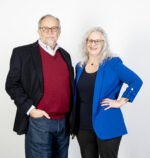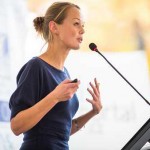Strategic Workplace Culture – WDP1 (Strategic Workplace Culture)
The Appleton Greene Corporate Training Program (CTP) for Strategic Workplace Culture is provided by Ms. Jourdain, MBA and Mr. Nagel, MA, PhD Certified Learning Provider (CLP). Program Specifications: Monthly cost USD$2,500.00; Monthly Workshops 6 hours; Monthly Support 4 hours; Program Duration 12 months; Program orders subject to ongoing availability.
If you would like to view the Client Information Hub (CIH) for this program, please Click Here
Learning Provider Profile
Ms. Jourdain, MBA and Mr. Nagel, MA, PhD
Ms. Jourdain and Mr. Nagel have extensive international consulting, training, leadership, executive and Board of Directors experience. They are the co-founders of a two-country consulting company, having created a proprietary system for consulting, learning and development, and facilitation, based in understanding how individual, team and organizational worldviews impact communication and business strategy. This innovative, thoughtful approach to understanding the impact of worldviews on how we each see and interact with the world around us has been well received in a variety of business and community environments, as a general practice and to advance specific issues.
Through direct application of worldview concepts in client settings, Mr. Nagel and Ms. Jourdain developed many planning models and frameworks to make it easy to work with the ideas and knowledge and to achieve results. These models and frameworks include the Worldview Intelligence Six Dimensions Framework, the CIDA-W Planning Model (Clarify, Illuminate, Design, Act, Worldview Leadership), the High-Performance Teams Model and the SHEER Conversational Planning Model (Stance, Hoped for Outcome, Empathy, Engage, Results/Reflection). They also draw on Systems Thinking and the knowledge from neuro- and behavioral sciences in supporting the implementation of programs and strategies they develop with and for their clients.
They are co-authors and co-creators of many resources including several books, resource guides, articles, and e-learning programs in addition to the in-person and virtual programs they deliver. They are called upon as keynote, conference and session speakers and thought leaders on their topics of expertise.
Mr. Nagel, MA, PhD
Mr. Nagel received his PhD in Social and Behavioral Science from Tilburg University, in the Netherlands, in 2015. His research and dissertation on worldviews forms a strong foundation for this current body of work, which is rooted in theory but grounded in a decade of practical application. Recognizing the profound impact of worldview explorations on the quality of conversations on issues that matter, he and Ms. Jourdain created specific applications for clients based on the nature of the issues to be solved.
Mr. Nagel has a BA and MA in Economics. He taught economics at the University of North Dakota and the University of Minnesota-Crookston. In addition, while at UMC he led several research initiatives bringing in over $5 million in research funds to the campus. He has several years of Executive experience including leading a Congressionally established Federal Commission, a multi-million dollar international trade research project and a Theory-U based multi-year initiative funded by several national and regional foundations.
Mr. Nagel has attended the Senior Executives in State and Local Government program at Harvard University as a Fannie Mae Foundation Fellow. He is a Donella Meadows Leadership Fellow. He has years of Board Director experience. He has served on the Boards and as the Chair of the Greater Minnesota Housing Corporation with assets now over $1B; Prairie Public Broadcasting, the statewide public television and radio system for North Dakota; the US-Canada Trade Alliance, an international trade promotion and policy organization; the North Dakota Consensus Council; and other Boards.
Ms. Jourdain, BA (Honours), MBA
Ms. Jourdain is an internationally recognized consultant, trainer and speaker with more than two decades of experience. Her practice is steeped in leading change, strategic planning, leadership development and building High-Performance Teams. When companies are looking to develop new strategies, resolve conflict, engage the hearts and minds of stakeholders, or for professional development, they call on her.
She is a mentor for women business owners through The Forum and is currently mentoring one-on-one and a group process for 8 women business owners. She was a driving force behind Envision Halifax (now Engage Nova Scotia): a voluntary organization whose mission was to ignite a culture of civic engagement. She co-designed and co-facilitated the leadership development program, as well as serving an instrumental role on the Steering Committee for 5 years. Her leadership was recognized in 2009 with an Award.
In her prior career as CEO of the Atlantic Division of a major health charity, Ms. Jourdain was the youngest leader across Canada. Working with the Board, she streamlined internal systems for finance, volunteer systems and service and advocacy support. As a recognized leader, she served on a number of local and national boards, in a variety of roles including executive positions. During her not-for-profit career, she was a member of the Canadian Society of Association Executives (C.S.A.E.), and was on both the local and national boards. Ms. Jourdain earned the designation of Certified Association Executive (C.A.E.). Her outstanding leadership and contribution in the not-for-profit sector were recognized with local and national awards. This included a scholarship to the Banff Management Center where she earned a certificate in Leading People and Organizational Change and then certificates in Strategic Planning and Change Management.
Ms. Jourdain and Mr. Nagel
Both Ms. Jourdain and Mr. Nagel are practitioners and global stewards of the Art of Hosting Conversations That Matter, otherwise known as The Art of Participatory Leadership, which is a self-organized international network of practitioners and trainers. They have been collaborating and partnering on consulting, training, learning and development work since 2011. They have worked together in the United States, Canada, Bermuda, France, Germany, Switzerland, Australia and Brazil.
Their work with clients and stakeholders includes community and cross-cultural engagement, strategic direction, innovation, addressing teams in conflict and building team coherence, in traditional organizations in the private, public and not for profit sectors, across systems in rural, urban and suburban settings, with social entrepreneurs, across generations and in culturally specific circumstances.
MOST Analysis
Mission Statement
Workshop 1 provides the foundational learning and understanding for participants to begin building their Vision of a Strategic Workplace Culture for their business or organization. It creates a shared language amongst participants for the work ahead. It provides them with baseline cultural and performative assessments of the organization with which to plan their Initiative and measure progress towards achieving their Vision. It includes Tasks that participants can undertake between Workshops 1 and 2 to build connections between the participants and other leaders or departments within the organization. Importantly, it builds true commitment to creating and implementing a Strategic Workplace Culture Initiative.
Objectives
01. Workplace Culture: Define the organization’s goals regarding its Strategic Workplace Culture, review the Strategic Workplace Culture Assessment, outline preliminary actions to achieve the goals, clarify roles and responsibilities, and establish accountability structures.
02. Language Matters: Establish a shared understanding of the language and key terminology to be used during the program and when implementing the Strategic Workplace Culture Initiative.
03. Worldview Intelligence: Create awareness of worldviews and how they influence relationships, communication, conflict or tension, decision-making and team, department, division and company cultures and our responses to events, situations and other people.
04. Trust and Relationship: Establish why it is important to build trust and relationship across a spectrum of people, views and backgrounds, which leads to better decision-making and outcomes.
05. Neuro/Behavioral Science: Provide an introduction and overview of key elements of neuro and behavioral science and why this knowledge is important to establishing a Strategic Workplace Culture.
06. CIDA-W Introduction: Introduce the Worldview Intelligence CIDA-W Planning Model and how it applies to the workplace, including worldview awareness, culture change, innovation and dealing with uncertainty and conflict.
07. Shifting Patterns: Identify issues, challenges, historical patterns or other organizational initiatives that could create challenges to or provide support for implementing a Strategic Workplace Culture Initiative.
08. Baselines and Benchmarks: Use information from Objective 7 to create or review baseline and benchmark measures to identify issues, challenges or patterns as a focus for the initiative and to be able to track progress and measure improvements over time.
09. Commitment Pledge: Establish a dedicated commitment to success, including support from other organizational or team leaders.
10. Draft Vision: Describe the future vision for this Initiative, including what will be different once it is implemented.
11. Action Steps: Identify individual and collective Action Steps that are to be accomplished between Workshops 1 and 2, including responsibilities and timelines.
Strategies
01. Workplace Culture: Introduce participants to the overall program, the Workplace Culture Assessment and how a Strategic Workplace Culture Initiative will benefit the organization. Identify key elements of a Vision for the Initiative.
02. Language Matters: Provide term definitions with examples of how they are used. Invite participants to discuss what they mean to them and their Strategic Workplace Culture Initiative.
03. Worldview Intelligence: Become aware of the role of worldviews in the workplace. Reflect on and discuss the variety of worldviews that can exist within a team or organization and how they impact communication, relationships and decision-making.
04. Trust and Relationship: Engage participants in an exercise to become be aware of their starting stance toward trust and relationship. Explore ways to build trust and relationship.
05. Neuro/Behavioral Science: Provide a few examples to demonstrate how our brains influence how we perceive and respond to external stimulus and start a conversation that will gain more depth over the course of the program.
06. CIDA-W Introduction: Provide examples and engage discussion about how using the Worldview Intelligence CIDA-W Planning Model will support creating a Strategic Workplace Culture. CIDA-W stands for Clarify, Illuminate, Design, Act and Worldview Leadership.
07. Shifting Patterns: Discuss how the analysis of data provided by the Worldview Workplace Culture Assessment can provide insight into issues to be targeted and addressed with this Initiative.
08. Baselines and Benchmarks: Develop a plan for distributing the Worldview Intelligence Workplace Culture Assessment within the organization and decide on any other baseline measurements. Assign champions to be responsible for distributing the assessment and collecting other baseline measurement information
09. Commitment Pledge: Review and adapt a Pledge of Commitment that speaks to the effort and dedication participants will need to successfully work through this Program. Identify others in the organization whose support is critical to success to also sign the Commitment Pledge.
10. Draft Vision: Use the learning from Sections 1-8 to draft a Vision for what the Strategic Workplace Culture will look like once it is implemented.
11. Action Steps: Bring clarity and specificity to tasks to be accomplished between Workshops 1 and 2 and the roles and responsibilities for getting them done.
Tasks
01. Discuss the Workplace Culture Assessment to understand its purpose and usefulness.
02. Decide how the Worldview Intelligence Workplace Culture Assessment will be disturbed within the organization and who will be responsible for ensuring this is done.
03. Decide on other indicators to measure to track progress of this Initiative, which may include rates of turnover, recruitment, absenteeism, and sick leave. Assign responsibilities for accessing or collecting this data.
04. Discuss, adapt and adopt key terminology and shared language for this Initiative.
05. Share the interactive exercise from Strategy 3 with a group of co-workers to further demonstrate the diversity of worldviews and connect them with the work being done by the participants.
06. Explore the concepts of trust and relationship, identifying the starting point or stance toward both by each participant.
07. Identify specific actions to take to grow trust and relationship.
08. Illuminate and name specific organizational patterns that may hinder or help this Strategic Workplace Culture Initiative and check assumptions with others in the organization.
09. Review, adapt and sign a Commitment Pledge for creating and implementing a Strategic Workplace Culture Initiative.
10. Identify others in the organization whose actions could make or break this Initiative and ask them for their sponsorship and support and to also sign the Commitment Pledge.
11. Write a draft of the Vision for this Strategic Workplace Culture that contains specific, identifiable and visible outcomes to be accomplished by the end of the program, that all participants agree to and agree to take to others between this Workshop and the next for input.
12. Ensure action steps have been identified with assigned timelines and responsibilities.
Introduction
The modern workplace is facing new and unprecedented challenges. Among them is the decline in numbers of people available for work due to the aging out of Baby Boomers and post pandemic decisions by many to leave the workforce. This has contributed to a strong competition for talent. Additionally, a desire for greater choice in workplace structures like in-person, remote and hybrid work; pressure from employees, customer and investors for values-driven workplaces; and, the increasing desire of employees for work that is meaningful, flexible and rewarding; is impacting workplace cultures. People want to work in environments where they feel valued, where their contribution matters and where they have some degree of input into or control over decisions that impact their work. More than any other time in modern history, current and potential employees have a wider range of options available to them.
Intentionality is Required for Thrivable and Strategic Workplace Culture
Organizations, divisions, departments and teams intending to thrive, now and in the future, must be strategic about their workplace culture. While executives and employees believe a distinct culture is important to success, there is often a disconnect between talking about having a Strategic Workplace Culture and creating and sustaining one. This is the goal of this program: to build a roadmap for creating and sustaining a Strategic Workplace Culture, resulting in a competitive advantage for the organization.
Establishing the Foundation and Planning for the Entire Program
Workshop 1: Workplace Culture, provides an overview of the entire program, introducing concepts, ideas, Models and Frameworks that inform the course content and provide structure and processes to establish a Strategic Workplace Culture Initiative. To begin this work, it is important to understand the challenges, barriers and costs inherent in unhealthy workplace cultures and to explore how they are Changeable Conditions. Achievable Outcomes requires identifying the benefits, structures and processes that contribute to a Strategic Workplace Culture and incorporating them into a Vision for this Initiative. The Workplace Culture, Relational Leadership, Worldview Intelligence graphic identifies Changeable Conditions and Achievable Outcomes for participants to discuss and consider how they will inform their Strategic Workplace Culture Initiative as well as identify what elements to incorporate into their Vision.
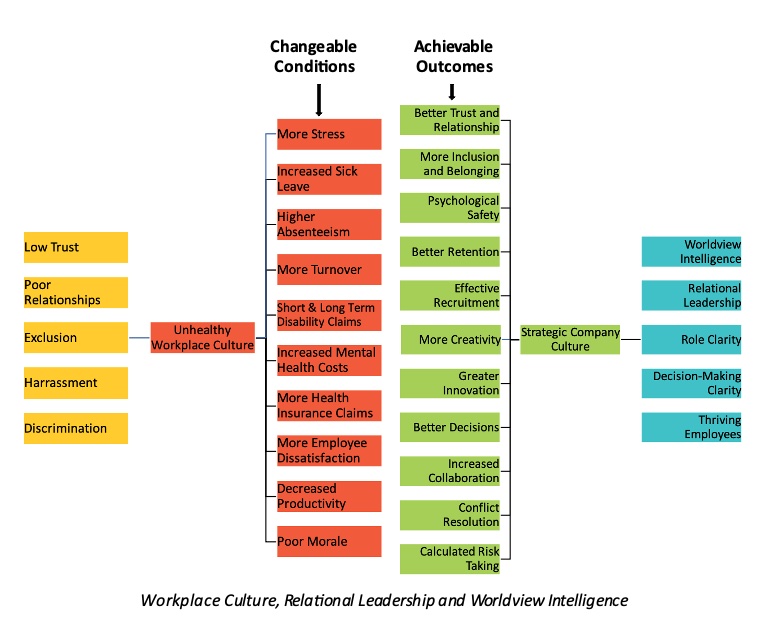
Screenshot
Having a Strategic Workplace Culture means that everyone who works in the organization not only thrives but is able to consistently work to their optimal levels of performance. People are engaged on a regular basis, not just in their work, but in providing input into the goals and important strategies of the organization.
Developing and Establishing the Foundation
The core of this year long program is built upon Worldview Intelligence, Worldview or Relational Leadership and worldviews. Gaining an understanding of the definitions of each of these and other key terminology during Workshop 1 provides shared language and knowledge important to moving forward through the complete Strategic Workplace Culture program.
Workshop 1 begins with establishing an awareness that each of us sees, experiences and interprets the world around us in our own unique ways, including personally, professionally and socially. This also holds true for teams, companies, organizations, communities and cultures. These worldviews, the lenses through which we see and experience the world, directly impact our professional and personal relationships, communications, conflicts, ideas, workplace commitments, productivity and performance. They impact how company success is perceived; how mission, vision and goals are understood; and how leader and manager behaviors and actions are interpreted.
Worldviews can impact the workplace negatively, creating discord, poor performance, disengagement, conflict and even toxicity. Alternatively, they can contribute to a positive, productive, high-performing and innovative workplace environment, characterized by strong trust and relationships. A Strategic Workplace Culture Initiative, using Worldview Intelligence (a proprietary approach to creating Strategic Workplace Cultures developed by Kathy Jourdain and Jerry Nagel) and Relational Leadership frameworks, structures and methods, can shift the workplace from negative to positive or advance already healthy, productive workplaces even further.
In most organizations, company and team culture forms organically rather than intentionally. It often carries forward historical worldviews, patterns and even trauma, within the company. This means that counter-productive behaviors and actions can take root and be amplified by the historical or current stories that people tell colleagues, new hires, friends and family, and even competitors, about their experiences with their managers, supervisors or direct reports, and of trust and relationship throughout the company. Being strategic about creating, sustaining or enhancing a positive, productive workplace culture means inspiring those stories in ways that highlight the value of working in this kind of company.
Illuminating and Shifting Patterns
The Worldview Intelligence Six Dimensions Framework is one of the structures used to illuminate worldviews. It will be introduced in Workshop 1 and covered more in-depth in Workshop 2. The Framework is a practical guide that can be used to explore personal, professional, team or organizational worldviews as well as historical and existing patterns in the team or organization. It provides a foundation for crafting a future vision, including values. In considering history, reality and future, it is helpful in identifying gaps that require strategies and actions to bridge and ensures team and organizational practices are developed that support this bridging. It asks the question about whether appropriate knowledge is available and accessed to fulfill the vision, specifically in this case, the Vision for a Strategic Workplace Culture.
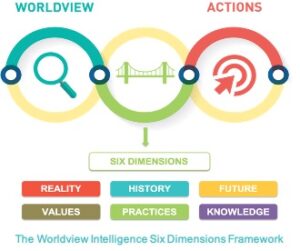
Trust and Relationship – Essential to a Strategic Workplace Culture
Trust and healthy relationships are essential ingredients in a Strategic Workplace Culture. This program, beginning with Workshop 1, offers structures, strategies and models to build both. Individuals, teams, departments, divisions or companies that become Worldview Intelligent offer greater leadership potential, more inclusive, welcoming workplaces and the creativity and innovation that arises from the interaction of multiple and diverse worldviews. This program provides alternative ways and skills to address conflict and tension and strengthen relationships so that people respect each other and enjoy working together, achieving greater productivity.
Key Insights and Strategies from Neuro- and Behavioral Science
The importance of understanding how what we have learned from neuroscience and behavioral science impacts the workplace is introduced in this Workshop. Neuroscience offers us insights into how the functioning of the brain affects human behavior and responses to common situations like pattern recognition and reactions to change. Behavioral science focuses on typical human and group dynamic scenarios that can make or break a Strategic Workplace Culture. Being cognizant of these bodies of knowledge means creating more informed strategies and courses of action. Both neuroscience and behavioral science will be explored more deeply in Workshop 6.
A Planning Model for Consistency
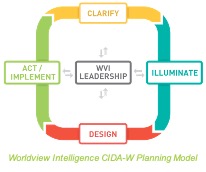 This program utilizes a worldviews-based Planning Model developed by Worldview Intelligence to guide planning, actions and success. The CIDA-W Planning Model stands for Clarify, Illuminate, Design, Act and Worldview Leadership. Using this Model throughout the program creates a consistent approach to planning, which, in turn, generates consistent results. This Planning Model will be introduced in this Workshop and a full understanding of and fluency in using it to build a Strategic Workplace Culture Initiative will be developed over the course of the full program.
This program utilizes a worldviews-based Planning Model developed by Worldview Intelligence to guide planning, actions and success. The CIDA-W Planning Model stands for Clarify, Illuminate, Design, Act and Worldview Leadership. Using this Model throughout the program creates a consistent approach to planning, which, in turn, generates consistent results. This Planning Model will be introduced in this Workshop and a full understanding of and fluency in using it to build a Strategic Workplace Culture Initiative will be developed over the course of the full program.
Assessments and Baseline Measures
Knowing what needs to shift and change to create a Strategic Workplace Culture is essential to shaping the business process focus throughout. An initial Workplace Culture Assessment will help surface what patterns or behaviors require attention, and conversation among the participants will add additional thoughts and ideas.
Dynamic Learning Environment
Program results are achieved through the use of adult learning principles. The program incorporates a combination of teaching, exercises, reflection, assessments, application and collaboration to embed the Strategic Workplace Culture business system and processes into the ongoing operation of the organization, its teams and departments. Baseline measurements are required to understand the starting point of the current Workplace Culture and to be able to track progress and success of implementation.
Commitment and Dedicated Effort
The work of shifting organizational culture can be intense. It requires dedicated commitment to succeed. This is why participants will review, discuss and adapt a Commitment Pledge they will each sign. And, the participants will require support from sponsors, champions and senior executive members to ensure their work can proceed, so they will seek out these sponsors and champions to invite them to also sign a Commitment Pledge.
Strategic Workplace Culture Vision Statement and Tasks
Before the end of Workshop 1, participants will draft a vision statement for the Strategic Workplace Culture Initiative and identify their tasks and action steps for the month ahead, with timelines and accountabilities, to launch this initiative more broadly into their team, department or organization.
The successful completion of Workshop 1 means participants have been introduced to many of the concepts they will interact with throughout the course, have a good sense of what is involved in participating and completing the course, will have made a commitment and outlined their next steps for the time between this Workshop and the next.
Executive Summary
Workshop 1 sets the stage for the entire Strategic Workplace Culture Program. It includes defining key terminology, identifying individual participant perspectives or concerns regarding the workplace, establishing the importance of trust and relationship and how to build them, and creating an initial vision for the Strategic Workforce Culture Initiative.
Baseline measurements for current workplace and team culture will be established using the Worldview Intelligence Workplace Culture Assessment. The results will be used to track progress. Additional baseline measures to track progress could include tracking the cost of rates of turnover, recruitment, absenteeism and sick leave. This information contributes to a business case for why a Strategic Workplace Culture will bring value to your workplace and your organization.
The Worldview Intelligence CIDA-W Planning Model is introduced and its application to the program described. Basic concepts from Neuroscience and Behavioral Science are provided that support self-knowledge or awareness and the understanding of normal, typical human dynamics, how they impact workplace culture and how that informs strategies, decisions and actions. These concepts are built on and expanded throughout the program.
A Commitment Pledge will be signed by each participant signifying their dedication to creating a Strategic Workplace Culture Initiative.
The 11 sections of this Workplace Culture Workshop are more fully described below.

Chapter 1: Workplace Culture
Workplaces that have a successful organizational culture are strategic and intentional about it and explicit about their worldviews. Organizational goals are well defined and shared, with a plan to achieve them. Roles and responsibilities are clear. Everyone knows how their efforts contribute to the vision and goals. Stories that demonstrate how healthy the workplace is, and how exciting and rewarding it is to work there, are fostered and promoted.
A Strategic Workplace Culture Initiative Vision defines what the company wants to accomplish and then outlines actions that are achievable, building accountability structures and integrating them into the rhythm of the workplace. The work of understanding what a Strategic Workplace Culture is, why it is important and how it can be created and sustained, begins here.

Chapter 2: Language Matters
Having a shared understanding of language usage and key terminology is essential to creating a Strategic Workplace Culture. In this Section of Workshop 1, definitions of the following terms are provided for review and discussion: worldviews, Worldview Intelligence, Relational Leadership, Psychological Safety, Changeable Conditions, Achievable Outcomes and Engagement. Key terminology regarding neuroscience and behavioral science will be discussed in Section 5. Examples are provided and participants will discuss what they mean to them and their Strategic Workplace Culture Initiative.

Chapter 3: Worldview Intelligence
Worldview Intelligence offers new perspectives into Workplace Culture, historical trends or patterns that influence current culture, a way to envision a preferred future, with Frameworks and Models to develop and implement the desired culture. It starts with worldviews, which are the lenses through which we see and experience the world and they are different for each of us, illuminating them in a way that sparks conversations, insights and ideas.
Each of us has a worldview. In fact, we each have more than one. Worldviews operate primarily in our unawareness and directly impact, within milli-seconds, how we interpret and interact with the world around us, events, situations and other people. They influence relationships, communication, conflict or tension, decision-making and team, department, division and company cultures, whether we realize it or not. Departments, teams, organizations also all have worldviews. The Worldview Intelligence Six Dimensions Framework, introduced in this Section, is an analytical and strategic framework that makes worldviews, and their interactions, visible.

Chapter 4: Trust and Relationship
Trust and healthy relationships are essential ingredients in Strategic Workplace Cultures. Their influence, and the need to be intentional about creating and fostering both, are often overlooked. Trust is both a noun, with many descriptors, and a verb, which indicates acting with or toward trust. It is much easier to build relationship with people who look and act like us, yet this is insular. Learning why it is important to build trust and relationship across a spectrum of people, views and backgrounds, and how to do so, means greater diversity, better decision-making and outcomes. Section 4 invites participants to be aware of their starting point or stance toward trust and relationship – do you assume trust until broken or do you believe trust must first be earned? Do you enter relationship with curiosity or suspicion? From here, steps can be identified to build trust and relationship, even when it means mending fences.

Chapter 5: Neuro/Behavioral Science
There are so many gifts from neuroscience and behavioral science to understanding human, group and team dynamics. They inform strategies and actions that contribute to a Strategic Workplace Culture. Section 5 provides an introduction and overview of key ideas that will be presented in more depth later in the program, stimulating a conversation that will be expanded upon over the course of the program.

Chapter 6: CIDA-W Introduction
The Worldview Intelligence CIDA-W Planning Model outlines a 5-step iterative process to apply Worldview Intelligence to creating a Strategic Workplace Culture. Each aspect of CIDA-W is independent, interdependent and iterative. The Model provides a learning and planning structure for the entire program, with application for the workplace, including worldview awareness, culture change, innovation and dealing with uncertainty and conflict, beginning in this Workshop, with Clarify.
 In Section 6, an initial work through of each element of the Model – Clarify, Illuminate, Design, Act and Worldview Leadership – will be done, using examples and considering how it applies to Creating a Strategic Workplace Culture. Each Workshop of the program draws on one or more elements of this Model and, by the end of the program, participants will be fully conversant with its use and usefulness.
In Section 6, an initial work through of each element of the Model – Clarify, Illuminate, Design, Act and Worldview Leadership – will be done, using examples and considering how it applies to Creating a Strategic Workplace Culture. Each Workshop of the program draws on one or more elements of this Model and, by the end of the program, participants will be fully conversant with its use and usefulness.

Chapter 7: Shifting Patterns
When a company embarks on a Strategic Workplace Culture Initiative, it is likely in response to one of two conditions: 1) looking for improvement on a somewhat healthy existing culture to bring more structure and purpose to it or 2) wanting to design a workplace culture to address specific challenges that have been identified. In either case, it is necessary to identify issues, challenges or patterns as a focus for the Initiative. Identifying and discussing other initiatives in the organization that might impact the implementation of this Initiative will be valuable to deciding strategy and timing of key steps. The Workplace Culture Assessment will provide insight into issues to be targeted and addressed and other patterns will be identified through discussion. The desired patterns related to the Vision for the Workplace Culture will also be identified and discussed.

Chapter 8: Baselines and Benchmarks
Establishing baseline and benchmark measures is needed to track progress and measure improvements over time, as each aspect of the Strategic Workplace Culture Initiative is implemented. One such baseline will emerge from the Workplace Culture Assessment. Other measures that could be tracked include turnover, recruitment costs, absenteeism, and sick leave. The participants will identify and decide which costs are to be monitored through this Initiative.

Chapter 9: Commitment Pledge
Attempting to shift a Workplace Culture, re-patterning to design and sustain healthy, inclusive workplace practices and structures, is an uphill battle. Historical patterns and trends have a powerful hold on how people interact. Resistance to change is a typical human response. The brain likes predictability and stability. A dedicated commitment to success is required with support from other organizational or team leaders. A Commitment Pledge to this Initiative will be introduced and discussed by participants, adapting it to speak to the effort and dedication participants will need to successfully work through this Program. Each participant will be asked to personally sign a Commitment Pledge and asked to identify others in the organization whose actions could make or break this Initiative, to ask them for their sponsorship and support and to also sign a Commitment Pledge

Chapter 10: Draft Vision
Yogi Berra once famously said, “If you don’t know where you are going, any road will take you there.” What is the Vision for this Strategic Workplace Culture Initiative? What will be different once it is implemented? Describing the future Vision for this Initiative provides direction for each phase, contributes to identifying the gaps to be addressed and points to strategies to accomplish this. This discussion ensures that the Initiative is tailored to the specifics of the organization. It can take time to write a draft that participants all agree to and agree to take to others between this Workshop and the next for input.

Chapter 11: Action Steps
Participants will identify their individual and collective Action Steps that are to be accomplished between this Workshop and the next. Action steps will have responsibilities and timelines identified. They will include activating the Workplace Culture Assessment, collecting data on other measures this team has decided on and inviting input into the draft Vision for this Initiative.
Curriculum
Strategic Workplace Culture – WDP1 – Strategic Workplace Culture
- Workplace Culture
- Language Matters
- Worldview Intelligence
- Trust and Relationship
- Neuro/Behavioral Science
- CIDA-W Introduction
- Shifting Patterns
- Baselines and Benchmarks
- Commitment Pledge
- Draft Vision
- Action Steps
Distance Learning
Introduction
Welcome to Appleton Greene and thank you for enrolling on the Strategic Workplace Culture corporate training program. You will be learning through our unique facilitation via distance-learning method, which will enable you to practically implement everything that you learn academically. The methods and materials used in your program have been designed and developed to ensure that you derive the maximum benefits and enjoyment possible. We hope that you find the program challenging and fun to do. However, if you have never been a distance-learner before, you may be experiencing some trepidation at the task before you. So we will get you started by giving you some basic information and guidance on how you can make the best use of the modules, how you should manage the materials and what you should be doing as you work through them. This guide is designed to point you in the right direction and help you to become an effective distance-learner. Take a few hours or so to study this guide and your guide to tutorial support for students, while making notes, before you start to study in earnest.
Study environment
You will need to locate a quiet and private place to study, preferably a room where you can easily be isolated from external disturbances or distractions. Make sure the room is well-lit and incorporates a relaxed, pleasant feel. If you can spoil yourself within your study environment, you will have much more of a chance to ensure that you are always in the right frame of mind when you do devote time to study. For example, a nice fire, the ability to play soft soothing background music, soft but effective lighting, perhaps a nice view if possible and a good size desk with a comfortable chair. Make sure that your family know when you are studying and understand your study rules. Your study environment is very important. The ideal situation, if at all possible, is to have a separate study, which can be devoted to you. If this is not possible then you will need to pay a lot more attention to developing and managing your study schedule, because it will affect other people as well as yourself. The better your study environment, the more productive you will be.
Study tools & rules
Try and make sure that your study tools are sufficient and in good working order. You will need to have access to a computer, scanner and printer, with access to the internet. You will need a very comfortable chair, which supports your lower back, and you will need a good filing system. It can be very frustrating if you are spending valuable study time trying to fix study tools that are unreliable, or unsuitable for the task. Make sure that your study tools are up to date. You will also need to consider some study rules. Some of these rules will apply to you and will be intended to help you to be more disciplined about when and how you study. This distance-learning guide will help you and after you have read it you can put some thought into what your study rules should be. You will also need to negotiate some study rules for your family, friends or anyone who lives with you. They too will need to be disciplined in order to ensure that they can support you while you study. It is important to ensure that your family and friends are an integral part of your study team. Having their support and encouragement can prove to be a crucial contribution to your successful completion of the program. Involve them in as much as you can.
Successful distance-learning
Distance-learners are freed from the necessity of attending regular classes or workshops, since they can study in their own way, at their own pace and for their own purposes. But unlike traditional internal training courses, it is the student’s responsibility, with a distance-learning program, to ensure that they manage their own study contribution. This requires strong self-discipline and self-motivation skills and there must be a clear will to succeed. Those students who are used to managing themselves, are good at managing others and who enjoy working in isolation, are more likely to be good distance-learners. It is also important to be aware of the main reasons why you are studying and of the main objectives that you are hoping to achieve as a result. You will need to remind yourself of these objectives at times when you need to motivate yourself. Never lose sight of your long-term goals and your short-term objectives. There is nobody available here to pamper you, or to look after you, or to spoon-feed you with information, so you will need to find ways to encourage and appreciate yourself while you are studying. Make sure that you chart your study progress, so that you can be sure of your achievements and re-evaluate your goals and objectives regularly.
Self-assessment
Appleton Greene training programs are in all cases post-graduate programs. Consequently, you should already have obtained a business-related degree and be an experienced learner. You should therefore already be aware of your study strengths and weaknesses. For example, which time of the day are you at your most productive? Are you a lark or an owl? What study methods do you respond to the most? Are you a consistent learner? How do you discipline yourself? How do you ensure that you enjoy yourself while studying? It is important to understand yourself as a learner and so some self-assessment early on will be necessary if you are to apply yourself correctly. Perform a SWOT analysis on yourself as a student. List your internal strengths and weaknesses as a student and your external opportunities and threats. This will help you later on when you are creating a study plan. You can then incorporate features within your study plan that can ensure that you are playing to your strengths, while compensating for your weaknesses. You can also ensure that you make the most of your opportunities, while avoiding the potential threats to your success.
Accepting responsibility as a student
Training programs invariably require a significant investment, both in terms of what they cost and in the time that you need to contribute to study and the responsibility for successful completion of training programs rests entirely with the student. This is never more apparent than when a student is learning via distance-learning. Accepting responsibility as a student is an important step towards ensuring that you can successfully complete your training program. It is easy to instantly blame other people or factors when things go wrong. But the fact of the matter is that if a failure is your failure, then you have the power to do something about it, it is entirely in your own hands. If it is always someone else’s failure, then you are powerless to do anything about it. All students study in entirely different ways, this is because we are all individuals and what is right for one student, is not necessarily right for another. In order to succeed, you will have to accept personal responsibility for finding a way to plan, implement and manage a personal study plan that works for you. If you do not succeed, you only have yourself to blame.
Planning
By far the most critical contribution to stress, is the feeling of not being in control. In the absence of planning we tend to be reactive and can stumble from pillar to post in the hope that things will turn out fine in the end. Invariably they don’t! In order to be in control, we need to have firm ideas about how and when we want to do things. We also need to consider as many possible eventualities as we can, so that we are prepared for them when they happen. Prescriptive Change, is far easier to manage and control, than Emergent Change. The same is true with distance-learning. It is much easier and much more enjoyable, if you feel that you are in control and that things are going to plan. Even when things do go wrong, you are prepared for them and can act accordingly without any unnecessary stress. It is important therefore that you do take time to plan your studies properly.
Management
Once you have developed a clear study plan, it is of equal importance to ensure that you manage the implementation of it. Most of us usually enjoy planning, but it is usually during implementation when things go wrong. Targets are not met and we do not understand why. Sometimes we do not even know if targets are being met. It is not enough for us to conclude that the study plan just failed. If it is failing, you will need to understand what you can do about it. Similarly if your study plan is succeeding, it is still important to understand why, so that you can improve upon your success. You therefore need to have guidelines for self-assessment so that you can be consistent with performance improvement throughout the program. If you manage things correctly, then your performance should constantly improve throughout the program.
Study objectives & tasks
The first place to start is developing your program objectives. These should feature your reasons for undertaking the training program in order of priority. Keep them succinct and to the point in order to avoid confusion. Do not just write the first things that come into your head because they are likely to be too similar to each other. Make a list of possible departmental headings, such as: Customer Service; E-business; Finance; Globalization; Human Resources; Technology; Legal; Management; Marketing and Production. Then brainstorm for ideas by listing as many things that you want to achieve under each heading and later re-arrange these things in order of priority. Finally, select the top item from each department heading and choose these as your program objectives. Try and restrict yourself to five because it will enable you to focus clearly. It is likely that the other things that you listed will be achieved if each of the top objectives are achieved. If this does not prove to be the case, then simply work through the process again.
Study forecast
As a guide, the Appleton Greene Strategic Workplace Culture corporate training program should take 12-18 months to complete, depending upon your availability and current commitments. The reason why there is such a variance in time estimates is because every student is an individual, with differing productivity levels and different commitments. These differentiations are then exaggerated by the fact that this is a distance-learning program, which incorporates the practical integration of academic theory as an as a part of the training program. Consequently all of the project studies are real, which means that important decisions and compromises need to be made. You will want to get things right and will need to be patient with your expectations in order to ensure that they are. We would always recommend that you are prudent with your own task and time forecasts, but you still need to develop them and have a clear indication of what are realistic expectations in your case. With reference to your time planning: consider the time that you can realistically dedicate towards study with the program every week; calculate how long it should take you to complete the program, using the guidelines featured here; then break the program down into logical modules and allocate a suitable proportion of time to each of them, these will be your milestones; you can create a time plan by using a spreadsheet on your computer, or a personal organizer such as MS Outlook, you could also use a financial forecasting software; break your time forecasts down into manageable chunks of time, the more specific you can be, the more productive and accurate your time management will be; finally, use formulas where possible to do your time calculations for you, because this will help later on when your forecasts need to change in line with actual performance. With reference to your task planning: refer to your list of tasks that need to be undertaken in order to achieve your program objectives; with reference to your time plan, calculate when each task should be implemented; remember that you are not estimating when your objectives will be achieved, but when you will need to focus upon implementing the corresponding tasks; you also need to ensure that each task is implemented in conjunction with the associated training modules which are relevant; then break each single task down into a list of specific to do’s, say approximately ten to do’s for each task and enter these into your study plan; once again you could use MS Outlook to incorporate both your time and task planning and this could constitute your study plan; you could also use a project management software like MS Project. You should now have a clear and realistic forecast detailing when you can expect to be able to do something about undertaking the tasks to achieve your program objectives.
Performance management
It is one thing to develop your study forecast, it is quite another to monitor your progress. Ultimately it is less important whether you achieve your original study forecast and more important that you update it so that it constantly remains realistic in line with your performance. As you begin to work through the program, you will begin to have more of an idea about your own personal performance and productivity levels as a distance-learner. Once you have completed your first study module, you should re-evaluate your study forecast for both time and tasks, so that they reflect your actual performance level achieved. In order to achieve this you must first time yourself while training by using an alarm clock. Set the alarm for hourly intervals and make a note of how far you have come within that time. You can then make a note of your actual performance on your study plan and then compare your performance against your forecast. Then consider the reasons that have contributed towards your performance level, whether they are positive or negative and make a considered adjustment to your future forecasts as a result. Given time, you should start achieving your forecasts regularly.
With reference to time management: time yourself while you are studying and make a note of the actual time taken in your study plan; consider your successes with time-efficiency and the reasons for the success in each case and take this into consideration when reviewing future time planning; consider your failures with time-efficiency and the reasons for the failures in each case and take this into consideration when reviewing future time planning; re-evaluate your study forecast in relation to time planning for the remainder of your training program to ensure that you continue to be realistic about your time expectations. You need to be consistent with your time management, otherwise you will never complete your studies. This will either be because you are not contributing enough time to your studies, or you will become less efficient with the time that you do allocate to your studies. Remember, if you are not in control of your studies, they can just become yet another cause of stress for you.
With reference to your task management: time yourself while you are studying and make a note of the actual tasks that you have undertaken in your study plan; consider your successes with task-efficiency and the reasons for the success in each case; take this into consideration when reviewing future task planning; consider your failures with task-efficiency and the reasons for the failures in each case and take this into consideration when reviewing future task planning; re-evaluate your study forecast in relation to task planning for the remainder of your training program to ensure that you continue to be realistic about your task expectations. You need to be consistent with your task management, otherwise you will never know whether you are achieving your program objectives or not.
Keeping in touch
You will have access to qualified and experienced professors and tutors who are responsible for providing tutorial support for your particular training program. So don’t be shy about letting them know how you are getting on. We keep electronic records of all tutorial support emails so that professors and tutors can review previous correspondence before considering an individual response. It also means that there is a record of all communications between you and your professors and tutors and this helps to avoid any unnecessary duplication, misunderstanding, or misinterpretation. If you have a problem relating to the program, share it with them via email. It is likely that they have come across the same problem before and are usually able to make helpful suggestions and steer you in the right direction. To learn more about when and how to use tutorial support, please refer to the Tutorial Support section of this student information guide. This will help you to ensure that you are making the most of tutorial support that is available to you and will ultimately contribute towards your success and enjoyment with your training program.
Work colleagues and family
You should certainly discuss your program study progress with your colleagues, friends and your family. Appleton Greene training programs are very practical. They require you to seek information from other people, to plan, develop and implement processes with other people and to achieve feedback from other people in relation to viability and productivity. You will therefore have plenty of opportunities to test your ideas and enlist the views of others. People tend to be sympathetic towards distance-learners, so don’t bottle it all up in yourself. Get out there and share it! It is also likely that your family and colleagues are going to benefit from your labors with the program, so they are likely to be much more interested in being involved than you might think. Be bold about delegating work to those who might benefit themselves. This is a great way to achieve understanding and commitment from people who you may later rely upon for process implementation. Share your experiences with your friends and family.
Making it relevant
The key to successful learning is to make it relevant to your own individual circumstances. At all times you should be trying to make bridges between the content of the program and your own situation. Whether you achieve this through quiet reflection or through interactive discussion with your colleagues, client partners or your family, remember that it is the most important and rewarding aspect of translating your studies into real self-improvement. You should be clear about how you want the program to benefit you. This involves setting clear study objectives in relation to the content of the course in terms of understanding, concepts, completing research or reviewing activities and relating the content of the modules to your own situation. Your objectives may understandably change as you work through the program, in which case you should enter the revised objectives on your study plan so that you have a permanent reminder of what you are trying to achieve, when and why.
Distance-learning check-list
Prepare your study environment, your study tools and rules.
Undertake detailed self-assessment in terms of your ability as a learner.
Create a format for your study plan.
Consider your study objectives and tasks.
Create a study forecast.
Assess your study performance.
Re-evaluate your study forecast.
Be consistent when managing your study plan.
Use your Appleton Greene Certified Learning Provider (CLP) for tutorial support.
Make sure you keep in touch with those around you.
Tutorial Support
Programs
Appleton Greene uses standard and bespoke corporate training programs as vessels to transfer business process improvement knowledge into the heart of our clients’ organizations. Each individual program focuses upon the implementation of a specific business process, which enables clients to easily quantify their return on investment. There are hundreds of established Appleton Greene corporate training products now available to clients within customer services, e-business, finance, globalization, human resources, information technology, legal, management, marketing and production. It does not matter whether a client’s employees are located within one office, or an unlimited number of international offices, we can still bring them together to learn and implement specific business processes collectively. Our approach to global localization enables us to provide clients with a truly international service with that all important personal touch. Appleton Greene corporate training programs can be provided virtually or locally and they are all unique in that they individually focus upon a specific business function. They are implemented over a sustainable period of time and professional support is consistently provided by qualified learning providers and specialist consultants.
Support available
You will have a designated Certified Learning Provider (CLP) and an Accredited Consultant and we encourage you to communicate with them as much as possible. In all cases tutorial support is provided online because we can then keep a record of all communications to ensure that tutorial support remains consistent. You would also be forwarding your work to the tutorial support unit for evaluation and assessment. You will receive individual feedback on all of the work that you undertake on a one-to-one basis, together with specific recommendations for anything that may need to be changed in order to achieve a pass with merit or a pass with distinction and you then have as many opportunities as you may need to re-submit project studies until they meet with the required standard. Consequently the only reason that you should really fail (CLP) is if you do not do the work.
Support Process
Please forward all of your future emails to the designated (CLP) Tutorial Support Unit email address that has been provided and please do not duplicate or copy your emails to other AGC email accounts as this will just cause unnecessary administration. Please note that emails are always answered as quickly as possible but you will need to allow a period of up to 20 business days for responses to general tutorial support emails during busy periods, because emails are answered strictly within the order in which they are received. You will also need to allow a period of up to 30 business days for the evaluation and assessment of project studies. This does not include weekends or public holidays. Please therefore kindly allow for this within your time planning. All communications are managed online via email because it enables tutorial service support managers to review other communications which have been received before responding and it ensures that there is a copy of all communications retained on file for future reference. All communications will be stored within your personal (CLP) study file here at Appleton Greene throughout your designated study period. If you need any assistance or clarification at any time, please do not hesitate to contact us by forwarding an email and remember that we are here to help. If you have any questions, please list and number your questions succinctly and you can then be sure of receiving specific answers to each and every query.
Time Management
It takes approximately 1 Year to complete the Strategic Workplace Culture corporate training program, incorporating 12 x 6-hour monthly workshops. Each student will also need to contribute approximately 4 hours per week over 1 Year of their personal time. Students can study from home or work at their own pace and are responsible for managing their own study plan. There are no formal examinations and students are evaluated and assessed based upon their project study submissions, together with the quality of their internal analysis and supporting documents. They can contribute more time towards study when they have the time to do so and can contribute less time when they are busy. All students tend to be in full time employment while studying and the Strategic Workplace Culture program is purposely designed to accommodate this, so there is plenty of flexibility in terms of time management. It makes no difference to us at Appleton Greene, whether individuals take 12-18 months to complete this program. What matters is that in all cases the same standard of quality will have been achieved with the standard and bespoke programs that have been developed.
Distance Learning Guide
The distance learning guide should be your first port of call when starting your training program. It will help you when you are planning how and when to study, how to create the right environment and how to establish the right frame of mind. If you can lay the foundations properly during the planning stage, then it will contribute to your enjoyment and productivity while training later. The guide helps to change your lifestyle in order to accommodate time for study and to cultivate good study habits. It helps you to chart your progress so that you can measure your performance and achieve your goals. It explains the tools that you will need for study and how to make them work. It also explains how to translate academic theory into practical reality. Spend some time now working through your distance learning guide and make sure that you have firm foundations in place so that you can make the most of your distance learning program. There is no requirement for you to attend training workshops or classes at Appleton Greene offices. The entire program is undertaken online, program course manuals and project studies are administered via the Appleton Greene web site and via email, so you are able to study at your own pace and in the comfort of your own home or office as long as you have a computer and access to the internet.
How To Study
The how to study guide provides students with a clear understanding of the Appleton Greene facilitation via distance learning training methods and enables students to obtain a clear overview of the training program content. It enables students to understand the step-by-step training methods used by Appleton Greene and how course manuals are integrated with project studies. It explains the research and development that is required and the need to provide evidence and references to support your statements. It also enables students to understand precisely what will be required of them in order to achieve a pass with merit and a pass with distinction for individual project studies and provides useful guidance on how to be innovative and creative when developing your Unique Program Proposition (UPP).
Tutorial Support
Tutorial support for the Appleton Greene Strategic Workplace Culture corporate training program is provided online either through the Appleton Greene Client Support Portal (CSP), or via email. All tutorial support requests are facilitated by a designated Program Administration Manager (PAM). They are responsible for deciding which professor or tutor is the most appropriate option relating to the support required and then the tutorial support request is forwarded onto them. Once the professor or tutor has completed the tutorial support request and answered any questions that have been asked, this communication is then returned to the student via email by the designated Program Administration Manager (PAM). This enables all tutorial support, between students, professors and tutors, to be facilitated by the designated Program Administration Manager (PAM) efficiently and securely through the email account. You will therefore need to allow a period of up to 20 business days for responses to general support queries and up to 30 business days for the evaluation and assessment of project studies, because all tutorial support requests are answered strictly within the order in which they are received. This does not include weekends or public holidays. Consequently you need to put some thought into the management of your tutorial support procedure in order to ensure that your study plan is feasible and to obtain the maximum possible benefit from tutorial support during your period of study. Please retain copies of your tutorial support emails for future reference. Please ensure that ALL of your tutorial support emails are set out using the format as suggested within your guide to tutorial support. Your tutorial support emails need to be referenced clearly to the specific part of the course manual or project study which you are working on at any given time. You also need to list and number any questions that you would like to ask, up to a maximum of five questions within each tutorial support email. Remember the more specific you can be with your questions the more specific your answers will be too and this will help you to avoid any unnecessary misunderstanding, misinterpretation, or duplication. The guide to tutorial support is intended to help you to understand how and when to use support in order to ensure that you get the most out of your training program. Appleton Greene training programs are designed to enable you to do things for yourself. They provide you with a structure or a framework and we use tutorial support to facilitate students while they practically implement what they learn. In other words, we are enabling students to do things for themselves. The benefits of distance learning via facilitation are considerable and are much more sustainable in the long-term than traditional short-term knowledge sharing programs. Consequently you should learn how and when to use tutorial support so that you can maximize the benefits from your learning experience with Appleton Greene.
Tutorial Support Tips
Students are often unsure about how and when to use tutorial support with Appleton Greene. This Tip List will help you to understand more about how to achieve the most from using tutorial support. Refer to it regularly to ensure that you are continuing to use the service properly. Tutorial support is critical to the success of your training experience, but it is important to understand when and how to use it in order to maximize the benefit that you receive. It is no coincidence that those students who succeed are those that learn how to be positive, proactive and productive when using tutorial support.
Be positive and friendly with your tutorial support emails
Remember that if you forward an email to the tutorial support unit, you are dealing with real people. “Do unto others as you would expect others to do unto you”. If you are positive, complimentary and generally friendly in your emails, you will generate a similar response in return. This will be more enjoyable, productive and rewarding for you in the long-term.
Think about the impression that you want to create
Every time that you communicate, you create an impression, which can be either positive or negative, so put some thought into the impression that you want to create. Remember that copies of all tutorial support emails are stored electronically and tutors will always refer to prior correspondence before responding to any current emails. Over a period of time, a general opinion will be arrived at in relation to your character, attitude and ability. Try to manage your own frustrations, mood swings and temperament professionally, without involving the tutorial support team. Demonstrating frustration or a lack of patience is a weakness and will be interpreted as such. The good thing about communicating in writing, is that you will have the time to consider your content carefully, you can review it and proof-read it before sending your email to Appleton Greene and this should help you to communicate more professionally, consistently and to avoid any unnecessary knee-jerk reactions to individual situations as and when they may arise. Please also remember that the CLP Tutorial Support Unit will not just be responsible for evaluating and assessing the quality of your work, they will also be responsible for providing recommendations to other learning providers and to client contacts within the Appleton Greene global client network, so do be in control of your own emotions and try to create a good impression.
Remember that quality is preferred to quantity
Please remember that when you send an email to the tutorial support team, you are not using Twitter or Text Messaging. Try not to forward an email every time that you have a thought. This will not prove to be productive either for you or for the tutorial support team. Take time to prepare your communications properly, as if you were writing a professional letter to a business colleague and make a list of queries that you are likely to have and then incorporate them within one email, say once every month, so that the tutorial support team can understand more about context, application and your methodology for study. Get yourself into a consistent routine with your tutorial support requests and use the tutorial support template provided with ALL of your emails. The (CLP) Tutorial Support Unit will not spoon-feed you with information. They need to be able to evaluate and assess your tutorial support requests carefully and professionally.
Be specific about your questions in order to receive specific answers
Try not to write essays by thinking as you are writing tutorial support emails. The tutorial support unit can be unclear about what in fact you are asking, or what you are looking to achieve. Be specific about asking questions that you want answers to. Number your questions. You will then receive specific answers to each and every question. This is the main purpose of tutorial support via email.
Keep a record of your tutorial support emails
It is important that you keep a record of all tutorial support emails that are forwarded to you. You can then refer to them when necessary and it avoids any unnecessary duplication, misunderstanding, or misinterpretation.
Individual training workshops or telephone support
Please be advised that Appleton Greene does not provide separate or individual tutorial support meetings, workshops, or provide telephone support for individual students. Appleton Greene is an equal opportunities learning and service provider and we are therefore understandably bound to treat all students equally. We cannot therefore broker special financial or study arrangements with individual students regardless of the circumstances. All tutorial support is provided online and this enables Appleton Greene to keep a record of all communications between students, professors and tutors on file for future reference, in accordance with our quality management procedure and your terms and conditions of enrolment. All tutorial support is provided online via email because it enables us to have time to consider support content carefully, it ensures that you receive a considered and detailed response to your queries. You can number questions that you would like to ask, which relate to things that you do not understand or where clarification may be required. You can then be sure of receiving specific answers to each individual query. You will also then have a record of these communications and of all tutorial support, which has been provided to you. This makes tutorial support administration more productive by avoiding any unnecessary duplication, misunderstanding, or misinterpretation.
Tutorial Support Email Format
You should use this tutorial support format if you need to request clarification or assistance while studying with your training program. Please note that ALL of your tutorial support request emails should use the same format. You should therefore set up a standard email template, which you can then use as and when you need to. Emails that are forwarded to Appleton Greene, which do not use the following format, may be rejected and returned to you by the (CLP) Program Administration Manager. A detailed response will then be forwarded to you via email usually within 20 business days of receipt for general support queries and 30 business days for the evaluation and assessment of project studies. This does not include weekends or public holidays. Your tutorial support request, together with the corresponding TSU reply, will then be saved and stored within your electronic TSU file at Appleton Greene for future reference.
Subject line of your email
Please insert: Appleton Greene (CLP) Tutorial Support Request: (Your Full Name) (Date), within the subject line of your email.
Main body of your email
Please insert:
1. Appleton Greene Certified Learning Provider (CLP) Tutorial Support Request
2. Your Full Name
3. Date of TS request
4. Preferred email address
5. Backup email address
6. Course manual page name or number (reference)
7. Project study page name or number (reference)
Subject of enquiry
Please insert a maximum of 50 words (please be succinct)
Briefly outline the subject matter of your inquiry, or what your questions relate to.
Question 1
Maximum of 50 words (please be succinct)
Question 2
Maximum of 50 words (please be succinct)
Question 3
Maximum of 50 words (please be succinct)
Question 4
Maximum of 50 words (please be succinct)
Question 5
Maximum of 50 words (please be succinct)
Please note that a maximum of 5 questions is permitted with each individual tutorial support request email.
Procedure
* List the questions that you want to ask first, then re-arrange them in order of priority. Make sure that you reference them, where necessary, to the course manuals or project studies.
* Make sure that you are specific about your questions and number them. Try to plan the content within your emails to make sure that it is relevant.
* Make sure that your tutorial support emails are set out correctly, using the Tutorial Support Email Format provided here.
* Save a copy of your email and incorporate the date sent after the subject title. Keep your tutorial support emails within the same file and in date order for easy reference.
* Allow up to 20 business days for a response to general tutorial support emails and up to 30 business days for the evaluation and assessment of project studies, because detailed individual responses will be made in all cases and tutorial support emails are answered strictly within the order in which they are received.
* Emails can and do get lost. So if you have not received a reply within the appropriate time, forward another copy or a reminder to the tutorial support unit to be sure that it has been received but do not forward reminders unless the appropriate time has elapsed.
* When you receive a reply, save it immediately featuring the date of receipt after the subject heading for easy reference. In most cases the tutorial support unit replies to your questions individually, so you will have a record of the questions that you asked as well as the answers offered. With project studies however, separate emails are usually forwarded by the tutorial support unit, so do keep a record of your own original emails as well.
* Remember to be positive and friendly in your emails. You are dealing with real people who will respond to the same things that you respond to.
* Try not to repeat questions that have already been asked in previous emails. If this happens the tutorial support unit will probably just refer you to the appropriate answers that have already been provided within previous emails.
* If you lose your tutorial support email records you can write to Appleton Greene to receive a copy of your tutorial support file, but a separate administration charge may be levied for this service.
How To Study
Your Certified Learning Provider (CLP) and Accredited Consultant can help you to plan a task list for getting started so that you can be clear about your direction and your priorities in relation to your training program. It is also a good way to introduce yourself to the tutorial support team.
Planning your study environment
Your study conditions are of great importance and will have a direct effect on how much you enjoy your training program. Consider how much space you will have, whether it is comfortable and private and whether you are likely to be disturbed. The study tools and facilities at your disposal are also important to the success of your distance-learning experience. Your tutorial support unit can help with useful tips and guidance, regardless of your starting position. Being thoughtful about your study environment creates the conditions for your success in this training program.
Planning your program objectives
It is important that you have a clear list of study objectives, in order of priority, before you start working on your training program. Your tutorial support unit can offer assistance here to ensure that your study objectives have been afforded due consideration and priority.
Planning how and when to study
Distance-learners are freed from the necessity of attending regular classes, since they can study in their own way, at their own pace and for their own purposes. This approach is designed to let you study efficiently away from the traditional classroom environment. It is important however, that you plan how and when to study, so that you are making the most of your natural attributes, strengths and opportunities. Your tutorial support unit can offer assistance and useful tips to ensure that you are playing to your strengths.
Planning your study tasks
You should have a clear understanding of the study tasks that you should be undertaking and the priority associated with each task. These tasks should also be integrated with your program objectives. The distance learning guide and the guide to tutorial support for students should help you here, but if you need any clarification or assistance, please contact your tutorial support unit.
Planning your time
You will need to allocate specific times during your calendar when you intend to study if you are to have a realistic chance of completing your program on time. You are responsible for planning and managing your own study time, so it is important that you are successful with this. Your tutorial support unit can help you with this if your time plan is not working.
Keeping in touch
Consistency is the key here. If you communicate too frequently in short bursts, or too infrequently with no pattern, then your management ability with your studies will be questioned, both by you and by your tutorial support unit. It is obvious when a student is in control and when one is not and this will depend how able you are at sticking with your study plan. Inconsistency invariably leads to in-completion.
Charting your progress
Your tutorial support team can help you to chart your own study progress. Refer to your distance learning guide for further details.
Making it work
To succeed, all that you will need to do is apply yourself to undertaking your training program and interpreting it correctly. Success or failure lies in your hands and your hands alone, so be sure that you have a strategy for making it work. Your Certified Learning Provider (CLP) and Accredited Consultant can guide you through the process of program planning, development and implementation.
Reading methods
One thing that can improve productivity is using recognized reading methods. This helps to focus and be more structured when reading information for reasons of importance, rather than relaxation.
Speed reading or Skimming Material
You can start by speed reading or skimming through the material. This is not for a detailed understanding, but so your brain will retain a useful overview. This overview will enable you to keep individual issues in perspective, with a more generic picture, because speed reading appeals to the memory part of the brain. Do not worry about what you do or do not remember at this stage.
Content reading
Once you have speed read everything, you can then start work in earnest. You now need to read a particular section of your course manual thoroughly, by making detailed notes while you read. This process is called Content Reading and it will help to consolidate your understanding and interpretation of the information that has been provided.
Making structured notes on the course manuals
When you are content reading, you should be making detailed notes, which are both structured and informative. Make these notes in a MS Word document on your computer, because you can then amend and update these as and when you deem it to be necessary. List your notes under three headings: 1. Interpretation – 2. Questions – 3. Tasks. The purpose of the 1st section is to clarify your interpretation by writing it down. The purpose of the 2nd section is to list any questions that the issue raises for you. The purpose of the 3rd section is to list any tasks that you should undertake as a result.
Organizing structured notes separately
You should then transfer your notes to a separate study notebook, preferably one that enables easy referencing, such as a MS Word Document, a MS Excel Spreadsheet, a MS Access Database, or a personal organizer on your cell phone. Transferring your notes allows you to have the opportunity of cross-checking and verifying them, which assists considerably with understanding and interpretation. You will also find that the better you are at doing this, the more chance you will have of ensuring that you achieve your study objectives.
Question your understanding
Do challenge your understanding. Explain things to yourself in your own words by writing things down.
Clarifying your understanding
If you are at all unsure, forward an email to your tutorial support unit and they will help to clarify your understanding.
Question your interpretation
Do challenge your interpretation. Qualify your interpretation by speaking it out loud and writing it down.
Clarifying your interpretation
If you are at all unsure, forward an email to your tutorial support unit and they will help to clarify your interpretation.
Qualification Requirements
The student will need to successfully complete the project study and all of the exercises relating to the Strategic Workplace Culture corporate training program, achieving a pass with merit or distinction in each case, in order to qualify as an Accredited Strategic Workplace Culture Specialist (APTS). All monthly workshops need to be tried and tested within your company. These project studies can be completed in your own time and at your own pace and in the comfort of your own home or office. There are no formal examinations, assessment is based upon the successful completion of the project studies. They are called project studies because, unlike case studies, these projects are not theoretical, they incorporate real program processes that need to be properly researched and developed. The project studies assist us in measuring your understanding and interpretation of the training program and enable us to assess qualification merits. All of the project studies are based entirely upon the content within the training program and they enable you to integrate what you have learnt into your corporate training practice.
Strategic Workplace Culture – Grading Contribution
Project Study – Grading Contribution
Understanding of Workplace Culture Assessment – 10%
Distribution of the Worldview Intelligence Workplace Culture Assessment – 5%
Adaptation and adoption of key terminology – 5%
Insights from Strategy 3 interactive exercise – 10 %
Experience in sharing the interactive exercise with others – 5%
Identification of starting points for trust and relationship – 5%
Identification of specific actions to take to grow trust and relationship – 5%
Decisions on other indicators to measure to track progress of this Initiative – 10%
Identification of organizational patterns that may hinder or help this Initiative – 10%
Check assumptions with others in the organization – 5%
Review, discuss, adapt and sign a Commitment Pledge – 10%
Identify others to sign a Commitment Pledge – 5%
Write a draft of the Vision for this Strategic Workplace Culture – 10%
Ensure action steps have been identified with assigned timelines and responsibilities – 5%
TOTAL GRADING – 100%
Qualification grades
A mark of 90% = Pass with Distinction.
A mark of 75% = Pass with Merit.
A mark of less than 75% = Fail.
If you fail to achieve a mark of 75% with a project study, you will receive detailed feedback from the Certified Learning Provider (CLP) and/or Accredited Consultant, together with a list of tasks which you will need to complete, in order to ensure that your project study meets with the minimum quality standard that is required by Appleton Greene. You can then re-submit your project study for further evaluation and assessment. Indeed you can re-submit as many drafts of your project studies as you need to, until such a time as they eventually meet with the required standard by Appleton Greene, so you need not worry about this, it is all part of the learning process.
When marking project studies, Appleton Greene is looking for sufficient evidence of the following:
Pass with merit
A satisfactory level of program understanding
A satisfactory level of program interpretation
A satisfactory level of project study content presentation
A satisfactory level of Unique Program Proposition (UPP) quality
A satisfactory level of the practical integration of academic theory
Pass with distinction
An exceptional level of program understanding
An exceptional level of program interpretation
An exceptional level of project study content presentation
An exceptional level of Unique Program Proposition (UPP) quality
An exceptional level of the practical integration of academic theory
Preliminary Analysis
Objective for the Program
The objective for this program is to assess, address and shape a Strategic Workplace Culture Initiative with which to create and support healthy, productive company, division, department and team environments. To create a Workplace Culture where employees thrive because they feel valued, their voice and contributions matter, and they have authentic opportunities for input into decisions that affect their work. Importantly, they have the opportunity to pursue personally meaningful goals and principles that bring value to the company.
Your company has likely chosen this program for one of two reasons: 1) the Workplace Culture is already relatively healthy, and the goal is to be more intentional and purposeful about this. This is done by bringing in structures and processes that will nurture, grow and sustain this culture. Alternatively, 2) there are significant challenges in the work environment that need to be addressed and implementing a Strategic Workplace Culture is viewed as a comprehensive way to address these challenges and to build a more welcoming, inclusive and productive culture.
Either way, creating a Workplace Culture where people thrive can become a competitive advantage for your company in employee recruitment and retention and in engaging with customers and other stakeholders. This work is challenging to undertake. Fear of the unknown, resistance to change, insufficient communication about the Initiative, can all get in the way of success. There is a need for dedicated, persistent, consistent effort as well as transparency in order to move people out of the status quo and into a new, thriving future.

Preparing for the Course
There are several things you can attend to as you prepare for this course. It is important to bring an open mind and learning mindset. Be curious about the material, about any reactions you have to the material, about the other participants and any conversations or differing views that might emerge. Curiosity and judgment or defensiveness cannot exist in the same space. Choose curiosity.
Taking this course is a commitment. You likely already have a busy schedule. It is important to not let this effort be derailed by other competing commitments. Make the course a priority. Block off time for the scheduled monthly workshop days as well as for the actions to be taken between workshops. Some months will require more time than others. You should anticipate at least 4 hours a week in addition to the Workshop and this may be a combination of work allocated time and personal time.

Working as a Team
It is anticipated that the participants in this course will work together as a Team. This will amplify your efforts, enhance your learning and help this Initiative gain momentum throughout the year.
You can reflect on your best experiences of a team to consider the values and principles that you want to bring to this Team. To be effective as a Team, you will need to ensure you contribute fully and that you encourage every member of the Team to also contribute fully. Be willing to have the difficult conversations, to identify challenges you are experiencing throughout this Initiative, as well as what is working well. Your ability to do this will grow as you gain more skills throughout the program to build trust and relationship and contribute to healthy team dynamics. Over time, as a Team, you will model what a Strategic Workplace Culture looks like, including behaviors, actions, skills and practices and this will set an example for the entire organization.

Understand the Scope of Your Initiative and Get Support
Is the scope of this Initiative company wide, for a specific department, division or location or for a team? Understanding the scope will guide and focus your efforts and actions. If the participants are not the CEO or Executive Team, ensure you have their support and understand their expectations of this Initiative and your efforts. During Workshop 1 you will be asked to sign a Commitment Pledge and following Workshop 1 you will be asked to invite others in the organization, whose support is critical to this Initiative’s success, to also sign a Commitment Pledge.
If you were chosen for this program, learn why from the person or people who chose you. What do they believe you will bring to the Initiative and that the Initiative will bring to you? What are their expectations of you and your performance in this program? Explore your own motivation for joining this team, what you can contribute and what you expect to gain.

Be Realistic about Current Reality
Understanding the current state of your organization, division, department or team means being realistic about what is happening, what the challenges are and what needs to be addressed. It will also help to know what is working well, what structures, processes and practices exist that can be depended on, expanded upon or added to as you move toward a more Strategic Workplace Culture.
Tracking Progress
You will be asked to track the progress of this Initiative in a number of ways, including through a Workplace Culture Assessment, which will be provided, and through other measures you will identify and collect data on. This is part of embedding the Business Process for a Strategic Workplace Culture into your organization. Comparative measures will be done at the beginning of the project, 12 months later and, if you choose, 6 months post completion of the Program.

Other Resources
It can be helpful, but not prerequisites, to draw on other resources. Some of the content in this course has been drawn from Kathy Jourdain and Jerry Nagel’s book: Building Trust and Relationship at the Speed of Change. This book is a comprehensive resource for Worldview Intelligence and is available on Amazon.
Other book resources include:
Neuroscience for Organizational Change: An Evidence-Based Practical Guide to Managing Change, Hilary Scarlett, Kogan Page Limited, 2016/2019
How Minds Change: The Surprising Science of Belief, Opinion and Persuasion, David McRaney, Portfolio/Penguin, 2022
Blog post resources:
Transforming Difficult Conversations with Worldview Intelligence
Worldview Intelligence Resources to Grow Team Cohesion
Healthy Teams Require Solid Leadership and Trust
Healthy Teams, Trust and Belonging
You Can’t Policy Relationships
Course Manuals 1-11
Course Manual 1: Workplace Culture
Cultivating a Strategic Workplace Culture: Embracing Diverse Worldviews for Organizational Success
The purpose of a Strategic Workplace Culture is to create an environment where employees feel empowered, are motivated, and inspired to contribute their best efforts towards achieving organizational goals, where it feels like a win-win for everyone across the organization. People want to work in environments where they feel valued, their contributions matter, they are encouraged to speak up, they have some say in decisions directly impacting their work, they can bring their full authentic selves to their roles and where health and well-being are a priority. In these environments people consistently deliver their best work, are inspired to be creative, innovative, resilient, and to engage in ethical conduct that sustains long-term success and societal impact.
In Course Manual 1: Workplace Culture, the challenges facing organizations in this decade are explored, contrasted with previous workplace challenges; what is needed to thrive is identified; characteristics of a Strategic Workplace Culture are described along with the benefits derived in creating such a culture; the role of worldviews is discussed and the importance of identifying key measurements to track progress are illuminated. Subsequent sections are dedicated to more in-depth explorations of these topics and more.
What is Workplace Culture?
Workplace Culture refers to the shared values, beliefs, attitudes, and behaviors that characterize an organization and shape the work environment. It encompasses the norms, traditions, and unwritten rules that guide interactions among employees, as well as the organization’s overall identity and ethos. It is the alignment, or lack thereof, between what leaders say and what they do. Workplace Culture influences how employees perceive their work, interact with colleagues and leadership, and approach tasks and challenges.
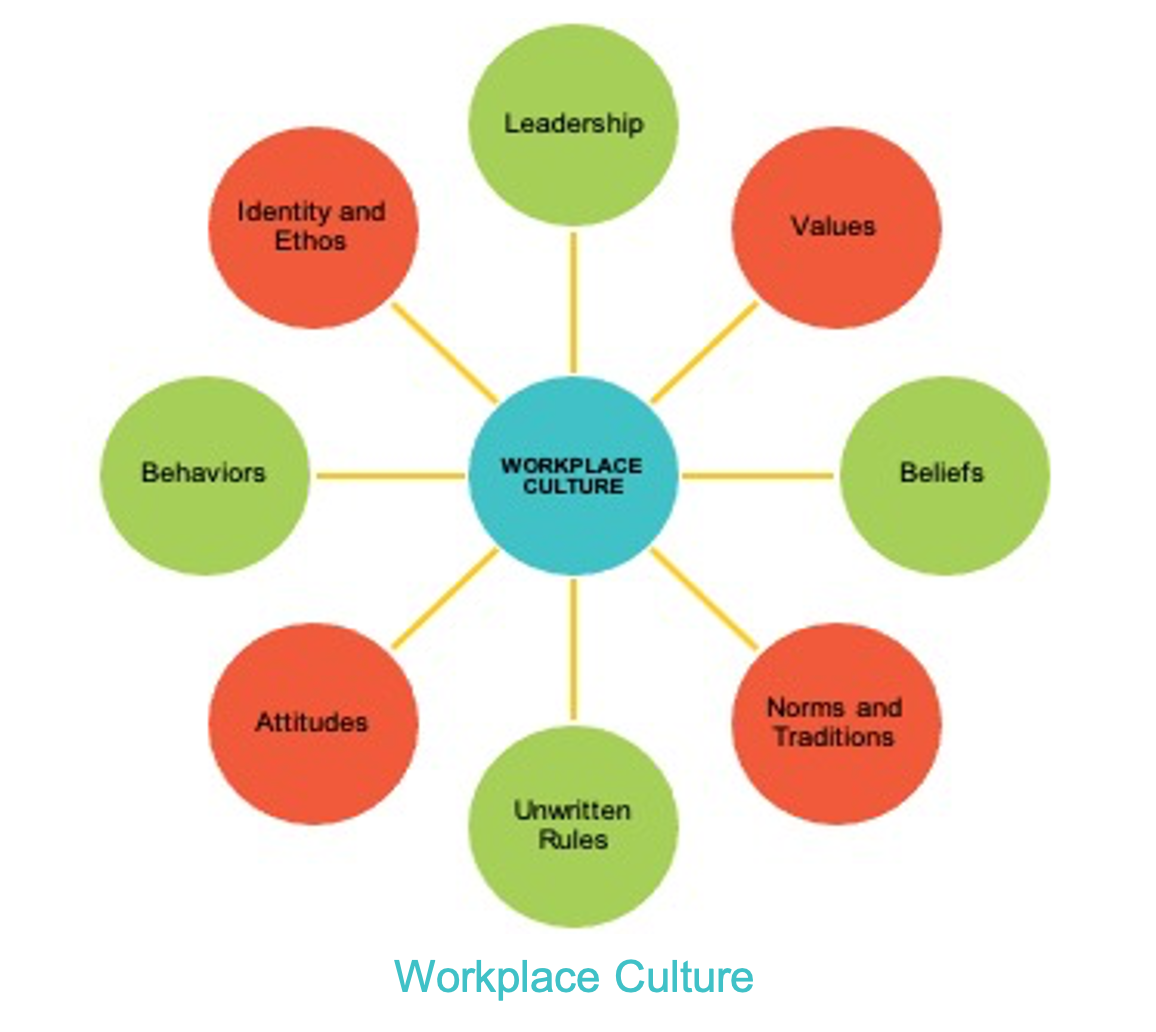
In most organizations, Workplace Culture emerges organically, without much thought given to the desired environment and quality of interactions amongst people. This can mean that challenging behaviors take root and become embedded in the patterns and interactions within the organization. Without intervention, these patterns can impact everything from how people treat each other, to morale, workplace incidents or accidents, and the health and well-being of employees, manifesting in high levels of stress and even illness.
The stories that employees share about their experiences in the workplace amplify existing patterns, regardless of the quality of those interactions. Paying attention to the stories people tell provides insight into their experiences, as does taking note of communication patterns. Do people talk about each other or with each other? What are the patterns of communication from leaders, directors or managers? On a “need-to-know” basis or frequent, transparent and addressing what is present, while also communicating about vision, values and imminent changes?
Being intentional about Workplace Culture means developing a consistent approach to creating and sustaining the desired behaviors and interactions across the entire organization, creating and sustaining the processes and practices needed for this culture to be a reality. Then, the stories that are told amplify this intentional culture, the organization grows its reputation as a good organization and this attracts not just employees, but customers too.
Workplace Challenges in Prior Decades
In recent decades, the most common workplace challenges were the growing prominence of the internet and advances in technology that required new training and adaptation. This was the predecessor of the fire-hose of information currently available with an increasing ability to manipulate data of all kinds, in good and bad ways.
In the 1990’s, there were shifts in labor demand associated with trade and technology that resulted in considerable structural change in the economy. At the core of this, workers with more skills or experience were seen to be in greater demand, while other workers were left behind. At the same time, many firms were changing the way they managed their workforces, trying to adapt leadership and skills to being more collaborative with mixed results, especially as many companies reduced or eliminated budgets for training and development. When spoken or written intent is not aligned with actions, employees receive mixed messages, impacting trust and relationship, usually in harmful ways.
At that time, “downsizing” and “contracting out” became dominant corporate buzzwords and more workers became disillusioned, turning to self-employment. This generally meant less stability in employment and income and may have been a precursor to today’s gig economy. These trends contributed to a growing distrust of corporate leadership and institutions and a disinclination of loyalty to organizations and companies that were not demonstrating loyalty to their employee base. Employees became more likely to job shop and look for career advancement by changing employers. The mantra “change jobs every five years” became a common belief.
Employers began to search for new models of management, given changing conditions. Variations of this new model included global integration, technological change, innovations in how work was organized, business rationalization to increase operational efficiency, the pursuit of high-performance workplaces, and new forms of labor relations. Some of these changes have become embedded into current practices, and are now aggravated by new challenges and exacerbated by pandemic and post-pandemic reactions and decisions.
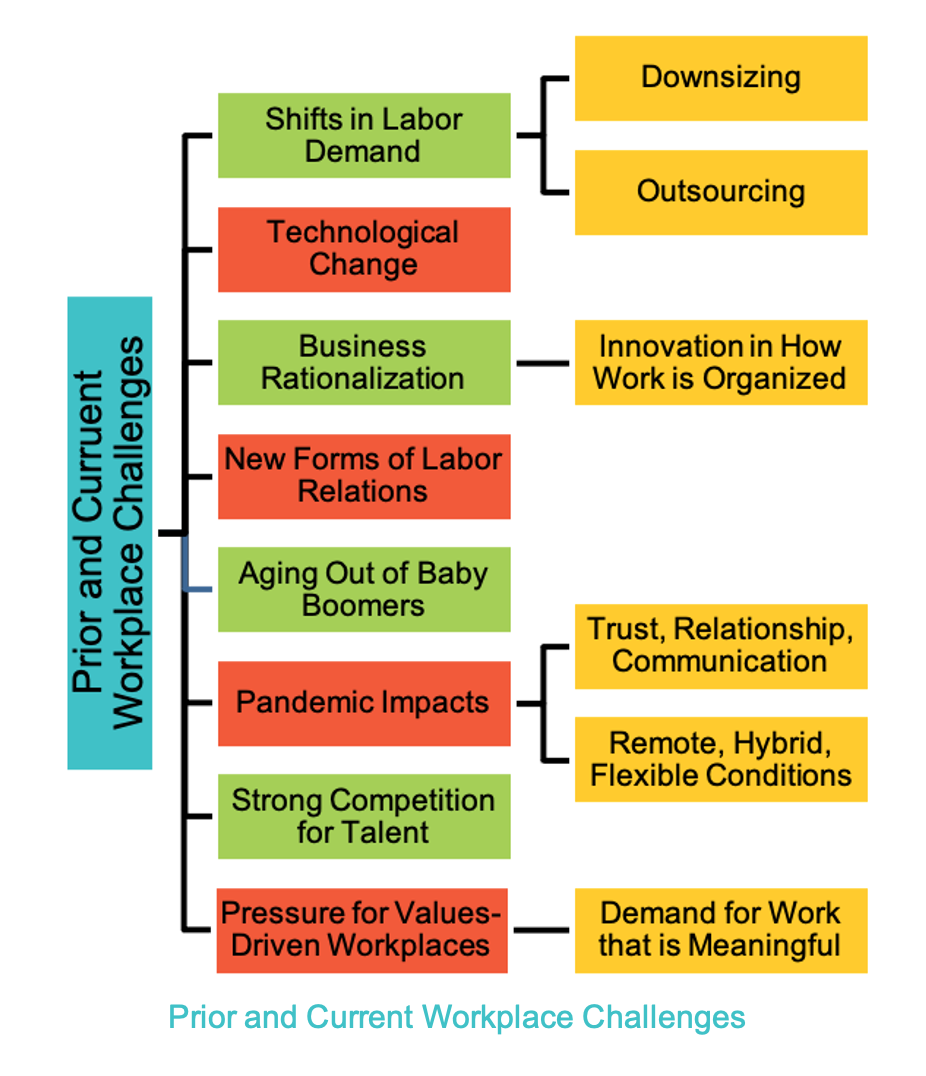
Modern Workplace Challenges
The modern workplace is facing new and unprecedented challenges. Predominant among them is the decline in the number of people available for work due to the aging out of Baby Boomers and post pandemic decisions by many to leave the workforce. While the aging out of Baby Boomers has been predicted for decades for anyone paying attention to demographic trends, not many companies prepared for this eventuality.
The arrival of the pandemic in 2020 and its considerable and lasting impact on people, trust, relationships, communication, the workplace and the economy was less predictable, but just as powerful an influence. It sped up Boomer retirements and caused many people to either drop out of the workforce or look for different forms of employment. It required quick decisions and action, and innovation that was driven by necessity. In this post-pandemic era, many companies have tried to return to a “pre-pandemic norm”, which is one cause of decisions employees are making now, especially with respect to flexibility in the workplace.
All of this and more has contributed to a strong competition for talent. The desire for greater choice in workplace structures included in-person, remote and hybrid work and has been fueled as a result of the pandemic experience. Employees who could work remotely derived many benefits including decreased costs associated with commutes and reclaimed time in daily life, often associated with the time to commute. Currently, there are ongoing debates about the disadvantages of not being in person and the advantages associated with spontaneously bumping into someone while in the same space, including the benefits of social connection. The demand from some employers to return 100% to in-person is not always well received by the people who work for them.
There is pressure from employees, customers and investors for values-driven workplaces and an increasing desire of employees for work that is meaningful, flexible and rewarding. People want to work in environments where they feel valued, where their contribution matters and where they have some degree of input into or control over decisions that impact their work. More than any other time in modern history, current and potential employees have a wider range of options available to them. A Strategic Workplace Culture Initiative results in a competitive advantage for a company, organization, department or team that embarks on and sustains such an initiative.
Unhealthy to Strategic Workplace Culture
This chart on Workplace Culture, Relational Leadership and Worldview Intelligence identifies some of the challenges that are present in unhealthy workplace cultures, leading to characteristics like low trust, poor relationships, exclusion, harassment and discrimination. These conditions are often hidden, not talked about or ignored.
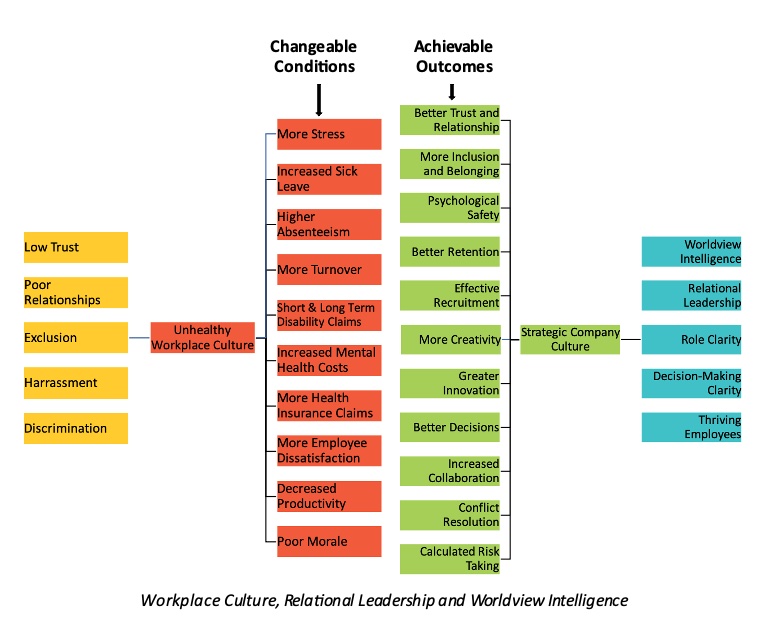
Screenshot
They are all conditions that are difficult and disheartening for people to work in and they get in the way of achieving optimal results. Any of these Changeable Conditions can be addressed through a Strategic Workplace Culture Initiative and become Achievable Outcomes. Achievable Outcomes are characteristics of a healthy culture and include Worldview Intelligence, Relational or Worldview Leadership, Role Clarity, Decision-Making Clarity and Thriving Employees.
Worldviews and Their Impact on Workplace Culture
Worldviews can impact the workplace negatively, creating discord, poor performance, lack of commitment or innovation, conflict and even toxicity. Alternatively, they can contribute to a positive, productive, high-performing and innovative workplace environment characterized by high trust and strong relationships. As noted above, characteristics that contribute to negative or unhealthy workplace cultures are Changeable Conditions and characteristics of healthy or Strategic Workplace Cultures are Achievable Outcomes.
This has real and measurable financial effects for a company. Change is possible when the future Vision for the company culture is clearly articulated and an assessment of the current state provides a baseline, both quantitative and qualitative, to identify gaps and ways to measure improvement and success. A Strategic Workplace Initiative addresses this.
Costs and Characteristics of Negative Workplace Cultures
Companies with low trust, challenged relationships, and even toxic workplace cultures, show a strong correlation with employee stress and financial costs to the company. These costs are related to sick leave and absenteeism, high turnover and related recruitment costs, employee dissatisfaction, decreases in productivity, increases in health insurance claims, including short- and longer-term disability, and increased mental health costs.
Relationships in unhealthy workplace cultures are often strained and trust is lacking. People compete for time, resources and recognition, rather than collaborate with each other. When relationships are challenged, time is wasted in work-arounds for communication, relationship and achieving results. This is also draining for individuals working in these circumstances. Feelings of exhaustion, frustration and more are communicated in more than just words; they are communicated through the unspoken mechanisms of culture that include the “vibe” of the workplace. Lack of alignment with company, division, department or team vision, mission and goals means achieving results takes longer and they can be compromised, all of which are Changeable Conditions.
Section 8 considers different baseline measures, both quantitative and qualitative, and invites the identification of these measures for this Initiative.
What Does a Thrivable and Strategic Workplace Culture Require?
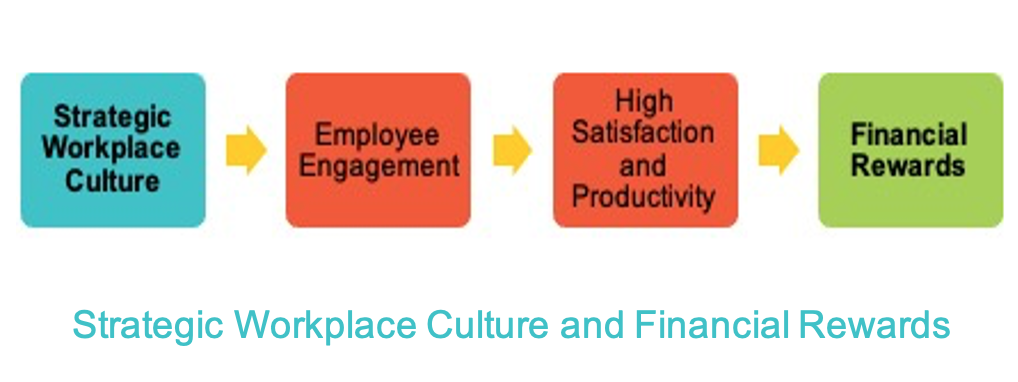
Organizations, divisions, departments and teams intending to thrive, now and in the future, must be strategic about their workplace culture. This means there will be an alignment between organizational vision, goals and outcomes and employee actions, behaviors and motivations in the workplace. Yet, while executives and employees believe a distinct organizational culture is important to success, there is often a disconnect between talking about having a Strategic Workplace Culture and creating and sustaining one, which can lead to hidden, negative dynamics.
The goal of this program is to build a roadmap for designing, implementing and sustaining a Strategic Workplace Culture, resulting in a competitive advantage for the organization, not just in recruitment and retention but in customer service, responsiveness and engagement with audiences or stakeholders as well. In companies that excel in customer service, employees are also happier and more satisfied with their working conditions. To achieve this, business processes need to be put in place that draw direct lines between vision, values and behaviors or actions, making the interconnections clear.
Critical Thinking, Working with Conflict, Collaboration and Psychological Safety
The significance of having a Strategic Workplace Culture to the performance of an organization cannot be overstated. An intentional culture embraces, invites and supports a diversity of worldviews, perspectives and backgrounds, is psychologically safe for those work there and serves as the foundation upon which organizational goals are achieved. It encompasses shared values, beliefs, and behaviors that guide employee actions and decisions.
Critical thinking and collaboration are encouraged. Critical thinking is the intellectually disciplined process of actively and skilfully conceptualizing, applying, analyzing, synthesizing and evaluating information. This information may have been gathered from observation, reflection, reasoning, research or community and is one means toward problem solving. Collaboration is a hallmark of how work gets done and projects get completed. Collaboration and critical thinking benefit each other.
Employees are offered skills training in communicating, particularly across differences or through conflict. Although conflict in and of itself is not inherently bad, not knowing how to address or work with conflict is problematic. Conflict can be the soil and seeds for new ideas, creative thinking and problem resolution. People equipped with the skills and knowledge to separate ideas and issues from the person presenting them are able to depersonalize them, so conversations, discussions and debates can be animated, constructive and productive.
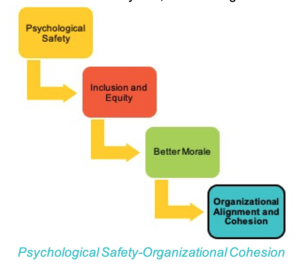
The ability to address conflict in healthy and constructive ways is an example of psychological safety, where people are encouraged to speak up and contribute their views and perspectives. This is especially important when there is a need to challenge ideas that might currently be on the table, to improve them, or to be able to question the status quo as an ongoing inquiry, to be adaptable and responsive to changing circumstances.
Role Modeling
A strong culture promotes employee engagement, enhances productivity, and fosters organizational resilience. It contributes to attracting and retaining top talent, as individuals are drawn to organizations that align with their values and offer a supportive work environment. This means the desired culture is promoted and modeled throughout all levels of the organization and particularly by senior leaders.
A Diversity of Worldviews
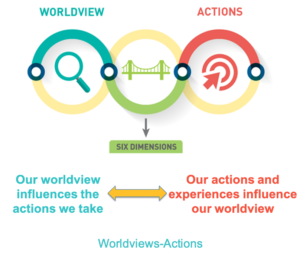
A diversity of worldviews enriches Workplace Culture by bringing in varied perspectives and experiences. Worldviews are the lenses through which we see, experience and interpret the world around us and more broadly. They are different for each of us. They operate largely in our unawareness even as they influence trust, relationship, communication and conflict or tension we might be experiencing, individually and collectively. Individuals, teams, departments and organizations all have worldviews.
Section 3 of this Workshop focuses on worldviews, how they are formed and why they matter; on Worldview Intelligence and how it contributes to a Strategic Workplace Culture; and introduces the Worldview Intelligence Six Dimensions Framework, which is one way that worldviews can be made visible to become part of a conscious strategy.
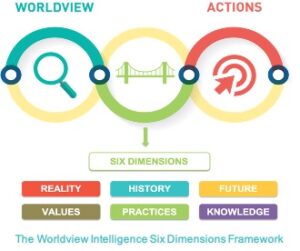
Advantages and Characteristics of Strategic Workplace Culture
Embracing worldview diversity fosters innovation, creativity, and problem-solving capabilities within the organization leading to better, more informed decision-making. Promoting inclusivity and equity enhances employee morale and organizational cohesion. By valuing and integrating diverse worldviews, it is possible to create a workplace culture that is reflective of the broader society and is better equipped to navigate complex challenges.
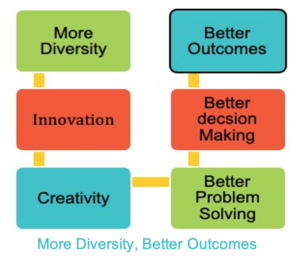
Workplaces with successful and inclusive cultures are strategic and intentional about it and explicit about their worldviews. Organizational goals are well defined and shared, with a plan to achieve them. Roles and responsibilities are clear. Everyone knows how their efforts contribute to the vision and goals. Stories that demonstrate how healthy the workplace is, and how exciting and rewarding it is to work there, are fostered and promoted. This is supported by business processes strategically embedded in the workplace that promote trust, relationship, learning, growth, self-esteem, safety, efficiency, productivity and accountability. These cultures can be enhanced and sustained through Worldview Intelligence and a Strategic Workplace Culture Initiative.
Employee Engagement
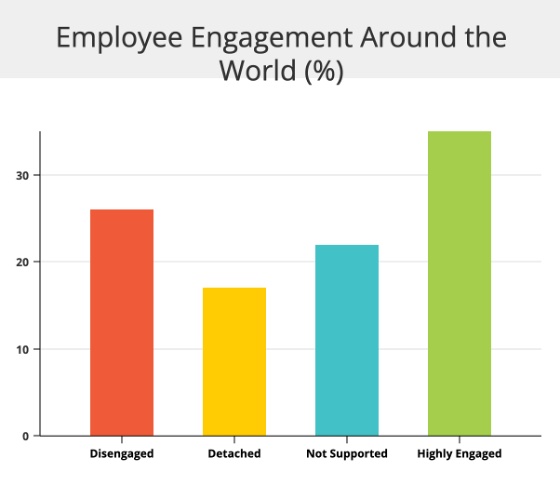
Engagement of employees, and internal and external stakeholders, is a characteristic of a Strategic Workplace Culture. Processes are in place that ensure this happens in authentic and meaningful ways. A Towers Perrin 2012 Global Workforce Study found that, around the world, 26% of employees were disengaged, 17% were detached, 22% were unsupported and only 35% were highly engaged. Employees who are disengaged, detached or not supported provide poorer outcomes than those who are engaged, and they cost the organization money.
This program provides strategies and business processes for companies to create environments where employees are highly engaged and motivated to go to work every day, resulting in financial savings or gains.
Optimal Performance
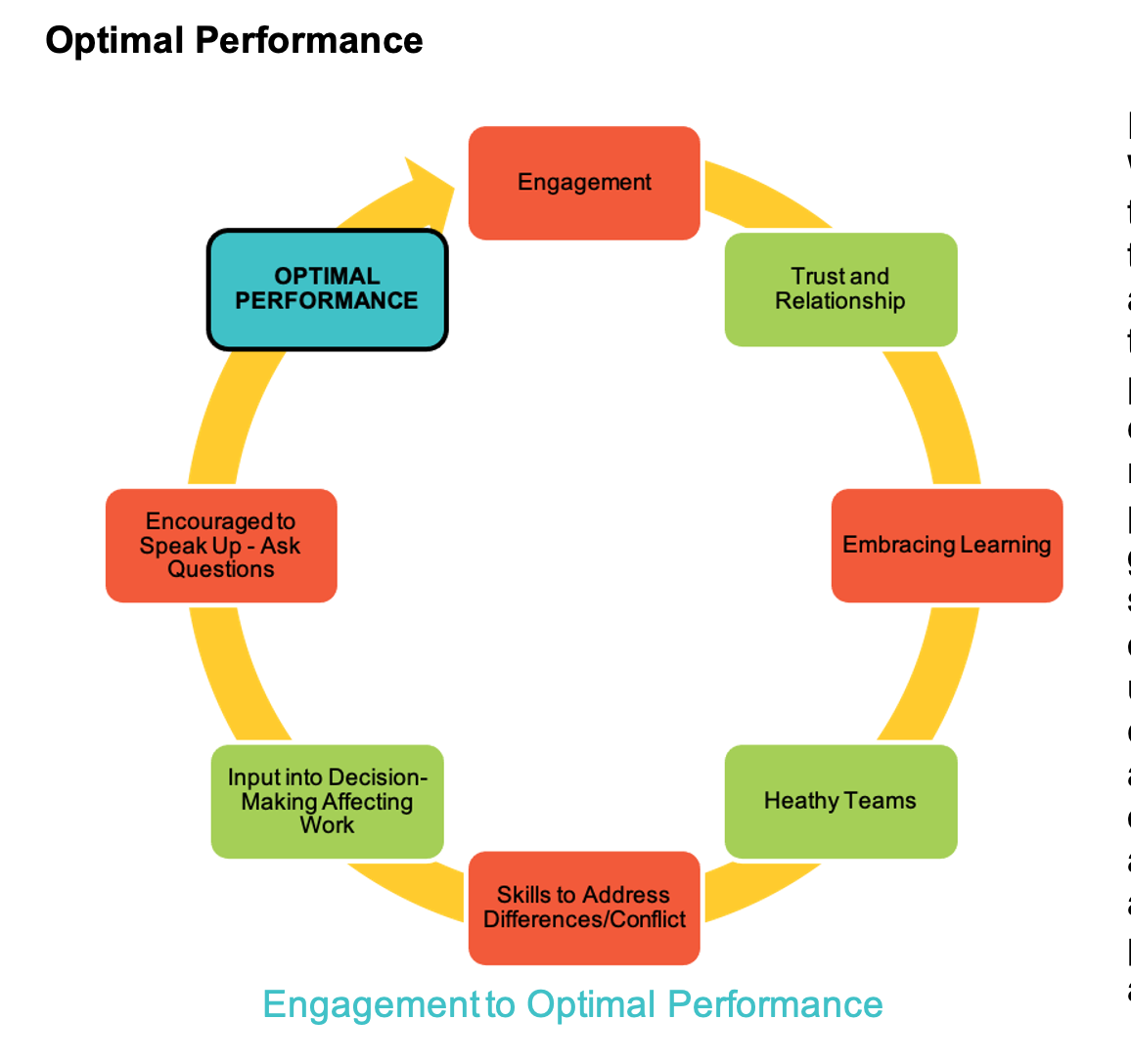
Having a Strategic Workplace Culture means that everyone who works there not only thrives but is able to consistently work to their optimal levels of performance. People are engaged on a regular basis, not just in their work, but in providing input into the goals and important strategies of the organization. They understand how their work contributes to the mission and goals of the organization. They are clear about their own roles and about the decision-making processes within their teams and across the organization.

Case Study: A Tale of Two Companies
This is a tale of two similar sized companies (more than 2500 employees) although they are in different sectors with different operating structures. Both companies have union and non-union employees. Both have front-line and administrative staff. They both have boards. Each company had access to a fund of a similar size (in the low six figures) whose purpose was to invest in the well-being of their employees.
One company approached how to use the funds with thinking focussed on sharing a little bit of this resource with everyone in the organization. They landed on distributing gift cards to everyone, with a few different choices available. The gift cards, though a laudable idea, ended up being $10.00 each. These days, that barely buys a cup of fancy coffee, let alone anything else. It was also known in the organization that part of the funding went towards a 4% cost of living increase for non-unionized employees, leaving unionized employees feeling less valued.
The other company focused on how they could advance the professional and personal well-being of every employee through shared learning experiences. They used the company’s values to guide their decision-making, including one that specifically focussed on a strategic goal of strengthening their culture of inclusion and belonging. They decided to offer leaders throughout the organization an opportunity for some training on the goal and they wanted to find a way to touch every person in the organization. This resulted in making available 3.5-hour virtual learning sessions for the over 350 “people leaders” across the company and the development of a four-part animated video series for every employee, no matter where they were located or what their role in the company was. This provided a common language across the organization and acted as a conversation starter on the issues, challenges and opportunities presented, not just by inclusion and belonging, but on any other topic that made for challenging conversations.
The gift card approach had the opposite from intended impact as recipients felt less valued, not more, and discontent increased. Sometimes doing nothing is better than doing something; but if you are going to do something, give careful consideration to both intended and unintended consequences.
Granted, maybe not everyone in the second company was initially enthused about having to take part in a 3.5-hour training, even one that contributed new ideas and skills to those who participated. However, the response to the training was positive, the shared experience was a big plus. The company continues to use the animated video series in a variety of ways, including in onboarding new employees, which continues to support the intended culture.
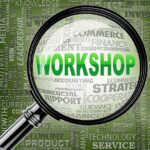
Exercise: Research
Course Manual 2: Language Matters
The phrase “words create worlds” encapsulates the profound impact of language on shaping our perception, understanding, and experience of reality. The words we choose have a significant impact on communication across various contexts, including personal conversations, professional interactions, written communication, and public speeches. Words are not merely tools for communication but powerful agents that construct, define, and transform the worlds we inhabit – whether they are internal worlds of perception and meaning or external worlds of social, cultural, and physical realities.
A Strategic Workplace Culture is partly created through the words chosen to describe and define it. Section 2 examines the power of language, why awareness of language matters and offers definitions for key terms used throughout this program.
Shaping Perception and Constructing Meaning
The words we use also influence how we perceive the world around us. Through language, we categorize, label, and describe our experiences, objects, and phenomena. For example, the words “beautiful,” “chaotic,” “peaceful,” or “dangerous” evoke different mental images and emotions, shaping our perception of what we encounter.
Language constructs meaning by assigning significance to symbols, concepts, and experiences. Words help us make sense of the world by creating frameworks, narratives or stories, and explanations that organize information and connect ideas. Examples include: scientific terminology constructs meanings that explain natural phenomena; philosophical concepts create frameworks for understanding abstract ideas; and historical literature brings the past alive.
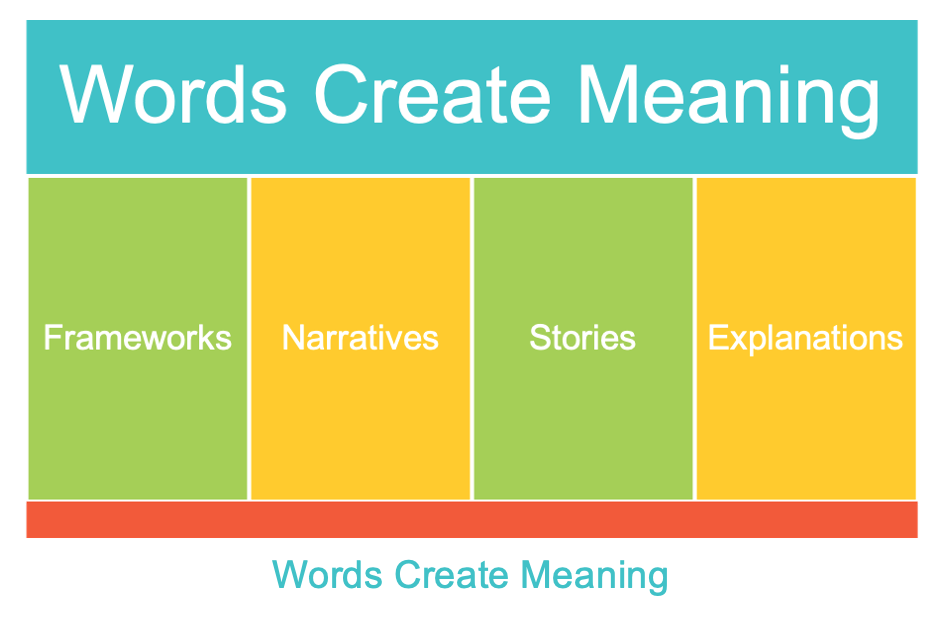
Defining Reality and Creating Relationships
Words play a role in defining our reality by establishing norms, beliefs, values, and cultural constructs. Language shapes our understanding of social structures, identities, roles, and relationships within society. Words like “gender,” “race,” “equality,” and “justice” define and influence societal perceptions and discussions on these topics.
Effective communication through language is essential for building and maintaining relationships. The words we choose convey emotions, intentions, attitudes, and boundaries, influencing how we interact with others and how we build meaningful connections, or not.
Empathetic language fosters connection and understanding in interpersonal communication. Using words that acknowledge others’ feelings, show empathy, and validate experiences can strengthen relationships and improve collaboration. Empathetic communication is particularly influential in conflict resolution and support situations.
Expressing Creativity and Shifting Perspectives
Words are tools of creativity that allow us to express imagination, emotions, stories, and artistic endeavors. Literature, poetry, music, film, and visual arts rely on language to create rich, immersive worlds that evoke emotions, provoke thought, and inspire creativity in both creators and audiences. Memorable communication often relies on language choices that are impactful. Metaphors, analogies and storytelling, and certain phrases can make messages more engaging and have greater influence or impact.
Language has the power to shift perspectives and contest existing paradigms. It can challenge societal norms, advocate for justice, and promote empathy and inclusivity. Persuasive language techniques, such as logical reasoning, emotional appeals, storytelling, and rhetorical devices, can be used to persuade, motivate, inspire, or convince individual or group audiences to take action or change their perspective.
Constructing Identities and Influencing Behavior
Words contribute to constructing personal and collective identities by influencing self-perception, cultural affiliations, and group belonging. Language reflects and reinforces aspects of individual and collective identity, including dialects, slang, and expressions specific to certain communities, age groups or subcultures. Choosing words that are culturally appropriate and sensitive to an audience’s background and preferences, while avoiding offensive or insensitive language, allows for more effective communication and the prevention of potential conflicts.
Language influences behavior by framing beliefs, values, goals, and motivations. Language allows individuals to express a wide range of emotions, attitudes, and feelings, from joy and excitement to sadness, to anger, to empathy and compassion. The choice of words, tone of voice, facial expressions, and body language all contribute to conveying emotional states and attitudes during communication. The choice of words can affect how credible and authoritative a speaker or writer appears to be. Using professional terminology, industry jargon, or precise language related to the topic at hand can enhance credibility and expertise. Conversely, using slang, informal language, or inappropriate terms can diminish credibility if not culturally appropriate.
Facilitating Learning and Development
Language plays a foundational role in education, learning, and cognitive development. It enables individuals to acquire knowledge, express creativity, engage in critical thinking, collaborate with peers, and explore new ideas, contributing to personal growth and lifelong learning. Whether through formal education, informal conversations, written documents, or digital media, language enables the transmission of ideas, facts, stories, and insights across generations and cultures.
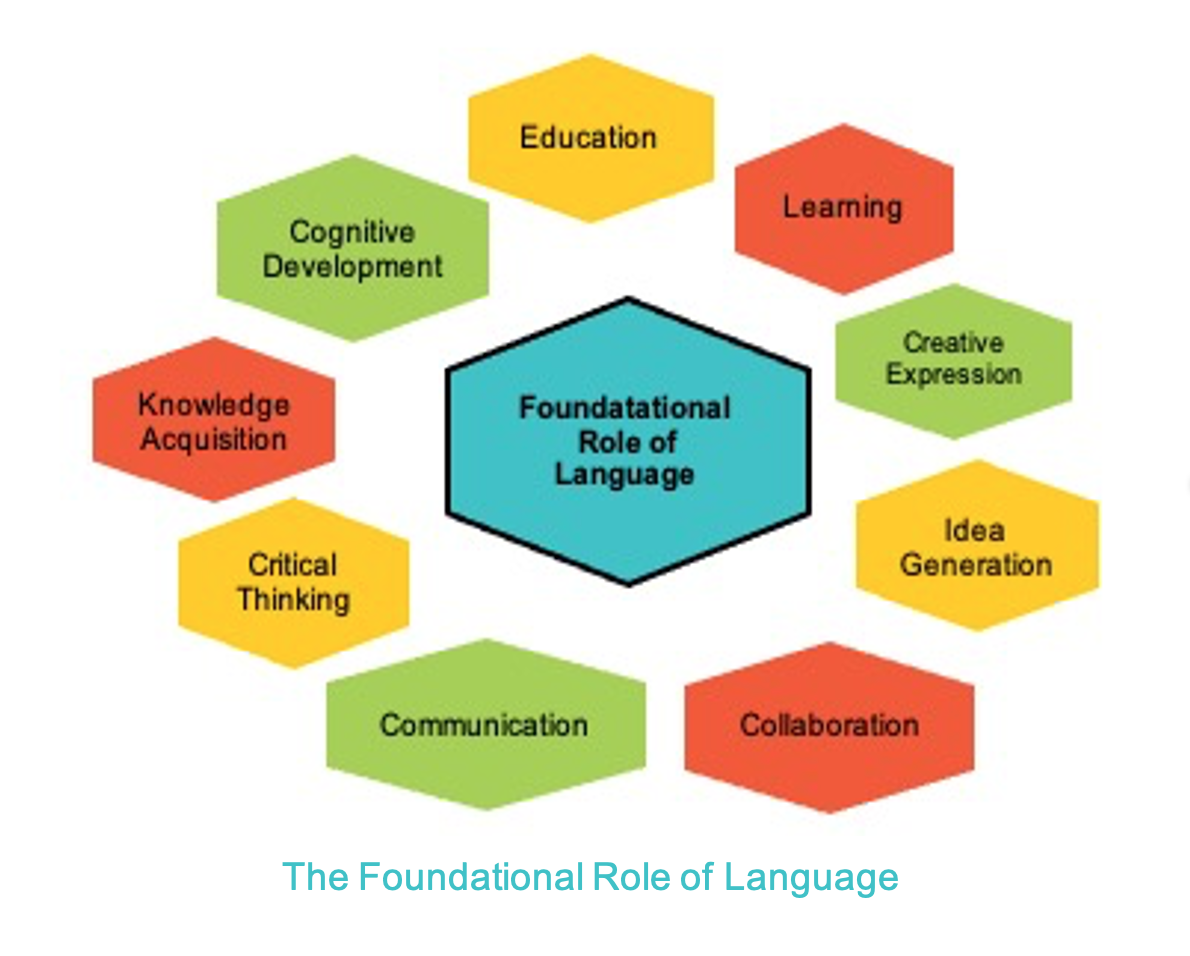
Language is a powerful tool that shapes and facilitates communication in diverse ways, from expressing emotions and building relationships to sharing knowledge, influencing others, resolving conflicts, and fostering cultural and social identity. Language proficiency, empathy, active listening, and clarity, are essential ingredients for successful interactions, meaningful connections and communication between and amongst individuals, teams, social groups, communities, and cultures. The words we choose shape clarity, tone, credibility, influence, cultural sensitivity, empathy, memorability, professionalism, and more.
When Words are Harmful
The use of certain words can be harmful due to their potential to perpetuate discrimination, reinforce stereotypes, promote violence, cause emotional harm, reinforce or reignite trauma, or contribute to oppressive systems.
Some words contribute to reinforcing harmful stereotypes by reducing individuals or groups to simplistic, negative caricatures. Stereotypical language can lead to prejudice, bias, and discrimination against marginalized communities, limiting opportunities and perpetuating inequalities. Harmful words undermine human dignity, respect, and empathy by degrading, objectifying, or dehumanizing individuals. Disrespectful language, insults, name-calling, and hate speech create a toxic environment that erodes trust and damages relationships.
Marginalizing and Exclusionary Language
Language that excludes or marginalizes certain groups limits or denies inclusivity, belonging and accessibility. Insensitive terminology, exclusive language, and inaccessible communication styles prevent full participation and representation, reinforcing exclusionary practices.
Harmful words can impede constructive dialogue, mutual understanding, and conflict resolution. Instead of fostering open communication and empathy, divisive language, stereotypes, and inflammatory rhetoric create barriers to meaningful engagement and collaboration.
Words or terms that derogatorily refer to someone’s race or ethnicity, such as racial slurs, are highly offensive and perpetuate racism and prejudice. Sexist language includes derogatory terms, objectifying language, and gendered stereotypes that devalue or belittle individuals based on their gender. Words or phrases that denigrate individuals based on their sexual orientation or gender identity contribute to LGBTQ+ discrimination, marginalization, and violence. Ableist language includes terms that discriminate against or stigmatize people with disabilities. Many terms are offensive and some like “wheelchair-bound” are considered outdated and disrespectful.
Microaggressions and Victim Blaming
Microaggressions are subtle, everyday expressions or behaviors that convey derogatory or negative messages toward marginalized groups. Examples include statements like “You’re so articulate for a Black person.” “You don’t look gay.” or “I don’t see color.” (which can invalidate the experiences of People of Color).
Victim-blaming language shifts responsibility from perpetrators to victims in situations of violence, harassment, or discrimination. Then can include phrases like “She was asking for it.” “What were you wearing?” or “He shouldn’t have acted that way.”
Recognizing the impact of words and striving to use language responsibly, respectfully, and inclusively is always a good strategy. Promoting awareness, educating others about the harmful effects of certain words, actively listening to feedback, and choosing words that promote empathy, equity, and understanding contribute to creating a more inclusive and respectful environment and a Strategic Workplace Culture.
The Impact of Dehumanizing and “Othering”
To dehumanize means treating individuals or groups as if they are less than human, disregarding their worth, autonomy, emotions, and inherent value. The words chosen to describe someone or another group are a powerful contributor to this. Dehumanization can take various forms, including psychological, social, cultural, or even institutional processes that reduce individuals to objects, stereotypes, or labels, often resulting in mistreatment, discrimination, prejudice, or violence. Dehumanization can have profound psychological effects on both victims and perpetrators. Victims may experience trauma, devaluation, loss of agency, and diminished self-worth. Perpetrators may become desensitized, morally disengaged, or develop the ability to justify harmful actions through dehumanizing beliefs, words and actions.
Related to dehumanization is the act of “othering”. This refers to the process by which individuals or groups are perceived, labeled, or treated as fundamentally different, alien, inferior, or separate from oneself or one’s own group. It affects individuals’ sense of identity, belonging, self-worth, and social relationships. Othering often involves creating a sense of “us versus them” “insiders versus outsiders”, or “in-group versus out-group”, based on perceived differences in identity, culture, beliefs, values, or characteristics. This binary thinking can lead to the exclusion, marginalization, devaluation, or stigmatization of those who are considered “other” and contributes to social divisions, prejudice, discrimination, and inequality.
Other Key Terminology and Definitions
Having a shared understanding of common terminology is relevant to the learning and the conversations that will emerge through implementation of the business process for this Strategic Workplace Culture Initiative. Consequently, in this section, there are categories of definitions that include broader terms like culture, trust and relationship. There are specific terms that form the basis of Worldview Intelligence. Neuroscience and behavioral science inform and support the understanding of worldviews and human dynamics. Identifying whether this Initiative makes progress requires discerning what to measure. What follows are descriptions of how key terminology is used throughout this program.
Culture, Trust, Relationship and Relational Leadership
Culture is the shared patterns of beliefs, values, norms, behaviors, symbols, traditions, and practices that are learned, transmitted, and shared by members of a particular group or society. Culture encompasses the way of life and the collective identity of a family, community or an organization, including its language, arts, customs, social institutions, rituals, and worldview. It shapes individuals’ worldviews, perceptions, attitudes, and interpretations of the world. It influences how people understand and make sense of their experiences, relationships, history, nature, and the cosmos.
Culture is dynamic and constantly evolving, influenced by historical events, social changes, globalization, technology, migration, and interactions between different cultures. It provides a framework for social cohesion, identity formation, community belonging, and the transmission of knowledge, traditions, and heritage from one generation to another. This can include generations of employees within a company. Understanding and respecting cultural diversity is essential for promoting mutual understanding, empathy, inclusivity, and peaceful coexistence in a globalized world.
Trust is a fundamental aspect of human relationships and interactions, characterized by confidence, reliability, and a belief in the honesty, transparency and dependability of others. It involves being truthful, sincere, and forthcoming in communication, decisions, and interactions, and maintaining integrity by aligning actions with values and principles. It includes a willingness to be vulnerable and to rely on someone or something, based on positive expectations about their intentions, actions, and behavior. Trust is built over time through consistent actions, transparency, mutual respect, and reliability.
Relationship refers to the connection, association, or bond between two or more individuals, entities, or groups. It involves a dynamic interaction characterized by shared experiences, emotions, communication, mutual expectations, and behaviors. Relationships can exist in various forms and contexts, including personal, social, professional, familial, romantic, or communal settings. Relationships involve a level of interdependence, where individuals or groups rely on each other for support, collaboration, and mutual benefit. Relationships are dynamic, evolving connections that require ongoing effort, communication, understanding, and mutual respect to thrive and contribute positively to individuals’ lives and workplace well-being.
Relational leadership is a leadership approach that emphasizes building strong, positive, and meaningful relationships with followers, colleagues, stakeholders, and other parties involved in the leadership process. Rather than focusing solely on authority, power, and hierarchy, relational leadership focuses on building relationships, fostering collaboration, empowering others, promoting empathy and inclusion, and aligning efforts toward shared goals and values. It is a people-centered approach that recognizes the importance of people being in relationship with each other to achieve organizational success, foster innovation, and create positive workplace cultures. In this program Worldview Leadership is often used interchangeably with Relational Leadership.
Worldviews, Worldview Awareness and Worldview Intelligence
A worldview is a comprehensive framework of beliefs, values, assumptions, perspectives, and interpretations through which an individual or a group perceives and makes sense of the world. It encompasses fundamental ideas about reality, human nature, morality, knowledge, purpose, and the nature of existence. Worldviews influence how people understand and interpret various aspects of life, including social, cultural, political, religious, philosophical, and scientific phenomena. They influence language, customs, rituals, art, literature, and social institutions and, in return, are shaped by these things.
Worldviews are complex and multifaceted, often evolving over time in response to new experiences, knowledge, and cultural influences. Willingness to be curious about, and seeking to understand diverse worldviews, is a key element for promoting mutual respect, intercultural dialogue, empathy, and global cooperation, in an increasingly interconnected world.
Worldview Awareness is the recognition, understanding, and appreciation of the diversity of worldviews that exist within individuals, groups, cultures, and societies. It involves acknowledging that people hold different beliefs, values, perspectives, and interpretations of reality based on their cultural, religious, philosophical, social, and personal backgrounds. Worldview Awareness is essential for promoting empathy, inclusivity, mutual respect, and effective communication in diverse and multicultural contexts.
Being worldview aware equips people to better manage conflicts, promote constructive dialogue, and build collaborative relationships across cultural and ideological differences. It involves looking for common ground, respecting differing viewpoints, and seeking win-win solutions based on shared or aligned values and goals.
Worldview intelligence is the ability to skillfully give voice and visibility to a multiple of worldviews, to make connections, open explorations and bridge differences, while maintaining humility and compassion. This involves understanding and effectively interacting with people from diverse cultural backgrounds, belief systems, and worldviews. It requires a combination of knowledge, skills, attitudes, and behaviors that enable individuals to engage respectfully, empathetically, and productively in diverse and multicultural contexts. Worldview Intelligence requires self-awareness of one’s own cultural background, biases, assumptions, values, and worldview as a starting point to understanding another’s.
Worldview Intelligence emphasizes respect, appreciation, and inclusivity toward diverse cultural, religious, and ideological perspectives. It includes avoiding stereotypes, prejudice, discrimination, or ethnocentrism and embracing cultural diversity and equality. Worldview Intelligence is a critical competency for individuals, organizations, and societies in today’s globalized and multicultural world. Many organizations are becoming increasingly diverse as population trends change. Worldview Intelligence promotes mutual understanding, collaboration, inclusivity, and harmony across diverse cultural, religious, and ideological perspectives.
Neuroscience, Behavioral Science and Psychology
Neuroscience and behavioral science provide key insights into how our worldviews work, why we are attached to them, why it is hard to change minds and how all of this affects our ability to learn, grow and change. Section 5 provides an introduction into this topic.
Neuroscience is a multidisciplinary field of study that focuses on the scientific exploration of the nervous system, including the brain, spinal cord, and peripheral nerves. Neuroscience investigates the physiological processes and functions of the nervous system, such as neural communication, synaptic transmission, neurotransmitter systems, and neural signaling pathways.
Neurochemical research explores the roles of neurotransmitters in cognition, behavior, emotions, learning, memory, and neurological disorders. Behavioral neuroscience, also known as psychobiology or biopsychology, explores the neural basis of behavior, motivation, emotions, sensory processing, motor control, learning, and social interactions.
Behavioral science is the interdisciplinary field of study that combines insights and methodologies from various scientific disciplines to understanding human and animal behavior, cognition, emotions, motivations, decision-making processes, and social interactions.
Psychology is a core discipline within behavioral science that studies human behavior, thoughts, emotions, motivations, personality traits, mental health, and cognitive processes.
Behavioral economics integrates insights from psychology and economics to study behavioral biases, heuristics, decision-making errors, and economic behaviors influenced by psychological factors. Behavioral science contributes to understanding the complexities of human behavior, individual differences, social interactions, cultural influences, cognitive processes, emotions, motivations, and decision-making mechanisms.
Psychological Safety and Employee/Workplace Engagement
Psychological safety is built on a foundation of trust, mutual respect, and positive regard among team members, leaders, and stakeholders. It encourages risk-taking, experimentation, and innovation by removing barriers to speaking up, challenging the status quo, and proposing new ideas or approaches.
Psychological safety is key to fostering a healthy workplace or team environment where individuals feel empowered, valued, and motivated to contribute their best efforts, ideas, and talents. It promotes trust, open communication, collaboration, innovation, inclusivity, and continuous learning, leading to higher levels of engagement, creativity, and performance within organizations and teams.
Employee/workplace engagement refers to the emotional and psychological connection that employees have with their work, organization, job roles, colleagues, and overall work environment. It reflects the level of enthusiasm, commitment, motivation, and dedication that employees demonstrate toward their work responsibilities and organizational goals.
Engaged employees tend to be more productive, efficient, and effective in their work. They demonstrate higher levels of performance, quality output, creativity, problem-solving skills, and innovation. Engaged employees are interested in opportunities for growth, advancement, learning, and skill development. They seek challenges, feedback, recognition, and support to enhance their professional capabilities and career progression. Organizations that prioritize and nurture workplace engagement create a positive and thriving work culture where employees are motivated, fulfilled, and empowered to contribute their best, leading to sustainable growth and success.
The Ability to Measure Progress
Baseline measurements serve as a basis or starting point for comparison and evaluation over time. By comparing subsequent measurements or data points to the baseline, individuals or organizations can assess progress, improvements, deviations, trends, or changes in performance or outcomes. Baseline measurements are necessary to monitor performance, identify areas of improvement or concern, and make data-driven decisions. They enable organizational leaders to track progress, detect deviations from expected outcomes, and take corrective actions as needed.
A benchmark refers to a standard, reference point, or set of criteria used for comparison, evaluation, measurement, or assessment of performance, quality, efficiency, effectiveness, or other attributes. Benchmarks serve as yardsticks or targets against which progress, achievements, deviations, or improvements can be measured and evaluated. They provide a basis for setting goals, identifying best practices, making data-driven decisions, and driving continuous improvement in various fields and contexts.
Case Studies and Exercises
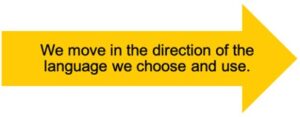 A powerful and profound way to understand the impact of the language we use is to reflect on our own experiences and the images conveyed by the words we use. As “words create worlds”, we also know we move in the direction of the language we use. The case studies and exercises that follow are designed to inform reflections and illuminate the power of language.
A powerful and profound way to understand the impact of the language we use is to reflect on our own experiences and the images conveyed by the words we use. As “words create worlds”, we also know we move in the direction of the language we use. The case studies and exercises that follow are designed to inform reflections and illuminate the power of language.

Case Study One: The Negative Impact of Words in Communication
A medium-sized company specializing in technology solutions for small businesses recently underwent a restructuring process, leading to changes in roles, responsibilities, and team dynamics. This case study explores a situation where negative words had a significant impact on communications and team morale within the Corporation.
Following the restructuring, John, a long-time employee, was assigned a new role as a team leader overseeing a group of developers and designers. John was known for his technical expertise but lacked experience in leading and managing teams. As he navigated his new role, communication challenges and negative words began to emerge, impacting team dynamics and morale.
During team meetings, John often used critical language without providing constructive feedback or solutions. For instance, he would say things like, “This design is terrible. You need to do better.”, without offering specific guidance or suggestions for improvement. The lack of constructive feedback left team members feeling demotivated and uncertain about how to meet expectations.
As the pressure increased to meet project deadlines, communication breakdowns and mistakes became more common. Instead of fostering a blame-free environment and encouraging accountability, John resorted to blaming and finger-pointing. He would say things like, “This delay is entirely your fault. You’re not pulling your weight.”, which created tension, defensiveness, and mistrust among team members.
In team discussions, John used negative labels and stereotypes to describe certain team members or their work. For example, he would refer to a developer as “lazy” or a designer as “uncreative,” based on isolated incidents or personal biases. These negative labels led to resentment, lowered morale, and a lack of psychological safety within the team.
Despite team members expressing concerns or requesting guidance, John showed a lack of empathy and support in his communication. He ignored their challenges or emotions with dismissive language, such as, “Stop complaining. Just get the job done.” Or “I don’t have time to deal with your problems.” This lack of empathy contributed to increased stress, disengagement, and reduced job satisfaction among all team members, including John.
The negative Impact of words in communication had detrimental effects on team morale, productivity, and job satisfaction within the company. The use of critical language without constructive feedback, blaming and finger-pointing, negative labeling and stereotyping, and lack of empathy and support created a toxic work environment and strained relationships among team members.
As a result:
* Team morale and motivation plummeted, leading to decreased productivity and quality of work.
* Communication breakdowns and conflicts escalated, hindering collaboration and problem-solving.
* Employee turnover increased as team members felt undervalued, unappreciated, and unsupported in their roles.
* The overall work culture became toxic, with trust eroded, and teamwork compromised.
Lessons Learned: This case study highlights the impact of negative words in communication and underscores the importance of mindful, respectful, and empathetic language in fostering a healthy, productive work environment. Effective communication involves providing constructive feedback, promoting accountability without blame, avoiding negative labeling and stereotypes, and showing empathy and support to team members. By prioritizing positive and constructive communication practices, organizations can nurture a culture of trust, collaboration, and employee well-being, leading to improved outcomes and organizational success.

Exercise One: The Impact of Hurtful Words
Pens or markers
Flip chart or whiteboard (optional)
* Hurtful or negative words can have a profound impact on individuals’ emotions, self-esteem, and relationships.
* Using hurtful language can lead to emotional distress, low self-esteem, damaged relationships, and conflict escalation.
* Mindful and empathetic language choices are essential for fostering understanding, empathy, and positive interactions.
* It’s crucial to be aware of the potential harm caused by hurtful words and to practice kindness, respect, and empathy in communication.

Case Study Two: The Positive Impact of Words in Communication
A multinational corporation with a diverse workforce spanning different cultural backgrounds, languages, and communication styles emphasizes inclusivity, respect, and effective communication to foster a positive work environment and enhance productivity.
In a recent project, the power of words had a significant positive impact on communication and teamwork within the organization. The project involved cross-functional, multi-cultural teams collaborating on a complex product launch, with tight deadlines and high expectations from stakeholders. The teams included members from various departments: marketing, sales, product development, and customer support. Due to the project’s complexity and tight timelines, tensions were running high, and misunderstandings were starting to emerge among team members.
During a critical team meeting, one team leader noticed that some members seemed overwhelmed and stressed. Instead of focusing solely on task updates, the leader started the meeting by acknowledging the challenges and expressing empathy towards team members’ concerns. They said, “I understand that this project is demanding, and we’re all working hard to meet our goals. Your dedication and effort are commendable, and I appreciate your commitment to our success. Let’s take a few minutes and discuss the challenges we are experiencing at this stage in the project.”
This empathetic communication from the team leader encouraged open dialogue, problem-solving, and collaboration to overcome challenges collectively. It helped ease tensions and created a supportive atmosphere where team members felt valued and understood, setting the tone for going forward.
As the project progressed, the team faced unexpected obstacles that required creative solutions and adaptability. Instead of dwelling on setbacks, team leaders and members adopted a positive reinforcement approach to boost morale and motivation. They used phrases like, “We’ve faced challenges before, and we always find solutions together. Let’s leverage our strengths to overcome this hurdle.”
The positive reinforcement encouraged a growth mindset, resilience, and a can-do attitude for the team. It fostered a sense of optimism, confidence, and teamwork, leading to more effective problem-solving and collaboration.
Throughout the project, team members engaged in regular feedback sessions to share insights, provide constructive criticism, and offer praise for achievements. The focus was on delivering feedback in a clear, respectful, and constructive manner. For instance, instead of using unhelpful language like, “You’re doing this wrong,” team members used phrases like, “Here’s an opportunity for improvement. Let’s work together to find a solution that aligns with our goals.”
The clear and constructive feedback promoted a culture of continuous improvement, learning, and growth. It encouraged open communication, mutual respect, and accountability, leading to enhanced performance and outcomes.
As the project reached key milestones and achieved success, the team made it a point to celebrate achievements and acknowledge individual and collective contributions. Leaders and team members used positive language to express appreciation and recognition. For example, they said, “Congratulations on reaching this milestone! Your dedication, teamwork, and innovative ideas have been instrumental in our success. Let’s continue to build on this momentum and strive for excellence.”
The celebrations and recognition boosted morale, motivation, and a sense of accomplishment among team members. A culture of appreciation, teamwork, and pride in their work, was reinforced, enhancing overall job satisfaction and engagement.
The positive impact of words in communication had a transformative effect on the project’s success and team dynamics within the company. By prioritizing empathetic communication, positive reinforcement, clear feedback, and celebrating achievements, the teams cultivated a culture of trust, collaboration, and resilience. This led to improved communication, enhanced teamwork, increased productivity, and successful project outcomes, showcasing the power of positive words in fostering a healthy and constructive work environment and driving organizational success.

Exercise Two: Empowering Word Choices
Paper
Pens or markers
Flip chart or whiteboard (optional)
Statement: “I appreciate your effort, and we need to work on meeting deadlines to ensure project success. Let’s discuss how you can improve time management and what will support you in doing so.”
Statement: “I want to express my gratitude for your hard work and collaboration. Your contributions were crucial to our success, and I value your efforts.”
Statement: “I’m facing some challenges with this task and could use your expertise. Would you be able to help me brainstorm some solutions?”
Statement: “It seems like we have different, even opposite, opinions on this matter. Let’s take a step back, listen to each other’s perspectives, and see if we can find a solution that meets all our needs.”
Statement: “I believe there might be a misunderstanding about our expectations. Let’s clarify and ensure we’re on the same page moving forward.”
Statement: “I want to take responsibility for the mistake I made and apologize for any inconvenience or misunderstanding it caused. I’m committed to learning from this experience and improving in the future.”
Statement: “I believe we can achieve better results by working together. Let’s work together and leverage each other’s strengths to accomplish our goals.”
Statement: “I might not be right about this, but I’ve noticed you seem overwhelmed lately. I’m here to offer my support and help in any way I can. What can I do for you? Is there a way we can lighten your workload.”

Course Manual 3: An Introduction to Worldviews
The word “worldview” has become part of lexicons around the world. It has moved out of philosophy, theology and science writing and into common usage. There is an assumption of a common understanding about what a worldview is and what it means, but is that true? The word worldview is often used to refer to one aspect of an individual, group or organization when what actually needs to happen is the opposite – an expansion rather than a reduction. We humans are not one-dimensional, rather we are each multi-dimensional. An expansion allows us to see more of the humanity in each other.
Worldview Intelligence reveals the multi-dimensionality of individuals, families, teams, departments and organizations in helpful and practical ways. This essential understanding sets a foundation for a Strategic Workplace Culture, in recognition of the complexity of both individuals and the many environments we find ourselves in. This complexity leads to a richness of experience that benefits everyone, especially when it is regularly and consistently invited in.
Before a person can become Worldview Intelligent, they must be Worldview Aware and have an understanding of what worldviews are, how they are formed and why it matters.
Worldviews are Lenses, Different for Everyone
Worldviews are the lenses through which we see and experience the world. They are different for each of us because they are socially and locally constructed. This means they are formed in relationship with other people (socially) and they are shaped by where we grew up, where we have lived for any length of time and where we live now (locally).
We are not born with a worldview but we are born into many worldviews because our parents, extended family, communities, faith institutions and schools all have worldviews. We are enculturated into the worldviews we initially experience without any conscious awareness. In the same way we adopt our early worldviews, we learn from the time we are babies what are acceptable and unacceptable beliefs, values, actions and behaviors from our immediate and extended families and in our communities; and what we can question and what we cannot.
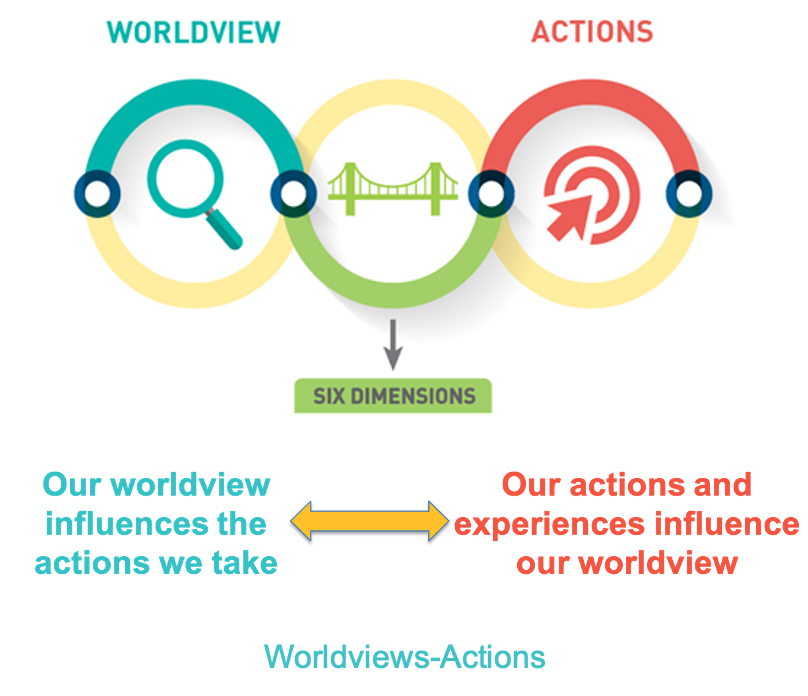
As we grow older, we are more able to question our beliefs or the beliefs of our families, even if that is simply in our own minds to begin with. Our worldviews inform our actions in the world. As we act, we receive feedback which can reinforce or challenge our worldviews. In this way, our actions and experiences then inform our worldviews. When our worldviews are reinforced, we become more certain that the way we see and experience the world is the “right way”, possibly even the “only way”.
Interestingly, when our worldviews are challenged the response is often to defend our views rather than opening to curiosity and the possibility that other experiences might also exist and might also be true. However, inviting curiosity is a great way to expand perspectives and open worldview explorations.
Curiosity and judgment, curiosity and defensiveness or dismissiveness, cannot exist in the same space. Whenever you notice yourself becoming judgmental, or defensive, or wanting to dismiss someone else or new ideas, this is a great time to turn to curiosity; curiosity about your own responses, curiosity about the other person or group, idea or situation.

Case Study: A Key Insight Emerging from Worldview Awareness
A counselling organization in a US state provides counselors to schools that have a significant number of lower income students, immigrant students and students of color. They brought groups of the counselors together to learn about worldviews. The majority of the counselors had been trained in social work, were female, white and with middle income backgrounds.
The reason the organization was interested in the training was due to the challenges the counselors were having in connecting with the students they were trying to help. Consistently, during the training programs offered, the counselors realized that they were projecting their perception of what was appropriate behavior, lifestyle and values, and measures of success onto the students and their families that they were supporting.
A key insight or take-away that was repeatedly expressed was the realization that their worldviews, influenced by being college educated, white and middle-class, were serving as the basis for their approach to counseling and measures of success. They realized, to be more effective, they needed to view each student’s circumstances through the lenses of the student’s worldviews and daily experiences, in and out of school. This insight resulted in less judgment and frustration, opened up new approaches and avenues for connection with students and their families and achieved greater results in helping the students be successful.
They recognized a need to ask more and different questions to have a better understanding of the people they were trying to help and to discern what support would be most effective.
Choices Through Worldview Awareness
When we are aware of our own worldview(s), we can choose what to do with the feedback we receive from our experiences. Otherwise, it is an unconscious process influencing our relationships, communication, tension or conflict, without our awareness.
Worldviews are not fixed. They naturally change over time, with different experiences, new relationships, and new knowledge or growth. They can expand or contract, although this work is usually about expansion. And if worldviews shift or change unconsciously, it means we can also be intentional in expanding our worldviews.
Worldviews influence communication, relationship and tension or conflict, usually without us being aware of how that is happening. Simply illuminating worldviews can improve communication and reduce conflict.
Worldviews hold our hopes and dreams, and what we hold to be true. Just like workplace cultures, they also hold our values, beliefs, attitudes and behaviors; our own norms and traditions. They guide how we interact with others. Our worldviews are closely associated with our sense of identity and, through them, we demonstrate our own sense of integrity and ethos.
Not only do individuals have worldviews, but families, communities, teams, departments and organizations all have worldviews, operating in similar ways to individual worldviews, but on the level of the collective. When you consider workplace cultures and worldviews, you can begin to see how worldviews might influence the dynamics of workplace relationships. Being able to illuminate the worldviews means you can be strategic about how to work with them and align individual worldviews to team, department or organization worldviews to build momentum in achieving team or organization vision and outcomes.

Exercise: Reflection on Worldview Awareness
Worldviews in Action – Faster Than the Blink of an Eye
We are constantly making decisions at lightning-fast speeds, most of the time without knowing we are doing it. When was the last time you sat at a café or in an airport watching people go by? Have you ever made up a story about someone you saw? What was the story and where did it come from? This is a natural human behavior. We all do it. Interestingly, the story shows up fully formed, without words, generated as an extension of patterns we are already familiar with. Our worldviews fill in the gaps with blinders on.
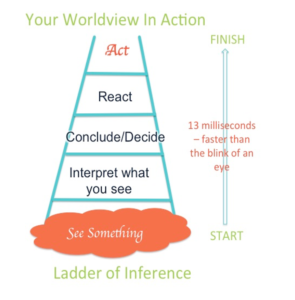
From our knowledge of the brain, it is more important to be fast than to be accurate. For the most part, this works in our favor. If we had to think everything through, every single time, we would never get anything accomplished. Being fast, in many circumstances, prioritizes keeping us safe, even if, in some cases, we are wrong. When it becomes important to pause is when we notice our reaction to something, or someone else’s reaction, especially when it is different than what was expected; when there is a need to think critically about new ideas or existing processes; and when we want to be more conscious about building trust and relationship.
Who Funds Research
There is a lot research about how fast our brains process information, much of which is funded by marketing companies and political parties. They want to ensure their messages influence us, our thoughts, beliefs and actions in a particular direction, before we are even aware we are thinking. A study done at MIT on brain processing showed that from the time we see something, interpret it, make conclusions about it, and determine a reaction, less than 13 milliseconds will have passed. That is faster than you can blink your eyes. Less time than it takes you to read this sentence. And the only reason it is 13 milliseconds is because that is as fast as this decision-making process can currently be measured.
This rapid processing helps keep us safe, enables us to recognize complex patterns so we know instantly who familiar people, places and/or situations are and helps us develop habits to move through our days at a good pace. This is valuable. Having patterns for recognition and decision-making allows us to accomplish most routine actions quickly – like getting out of bed and getting ready for the day. However, it gets us in trouble when our interpretations, conclusions and reactions are wrong. It gets us into deeper trouble when we believe everyone thinks and processes information in the same way we do. They don’t.
Our worldviews, the way we have come to see and experience the world, influences even what we see, certainly our interpretation of what we see and any meaning that we add, the conclusions we arrive at, reactions we have and any decisions or actions we take. If your experiences were different, you might reach a very different conclusion and act in a very different way.
Worldview Intelligence
Worldview Intelligence offers the opportunity to short-circuit this unconscious messaging and to consider how to focus on healthy exchanges, relationships and communication. It gives us the awareness, knowledge and skills to press the pause button, be curious about our interpretations so we can act more mindfully, intentionally or strategically and to invite others to do so as well.
Being Worldview Intelligent means we have the ability to skilfully give voice and visibility to a multiple of worldviews, to make connections, open explorations and bridge differences, while maintaining humility and compassion. It provides a structured approach to illuminating worldviews and to realize how understanding worldviews can be an instrumental part of creating and sustaining a Strategic Workplace Culture.
The Worldview Intelligence Six Dimensions Framework
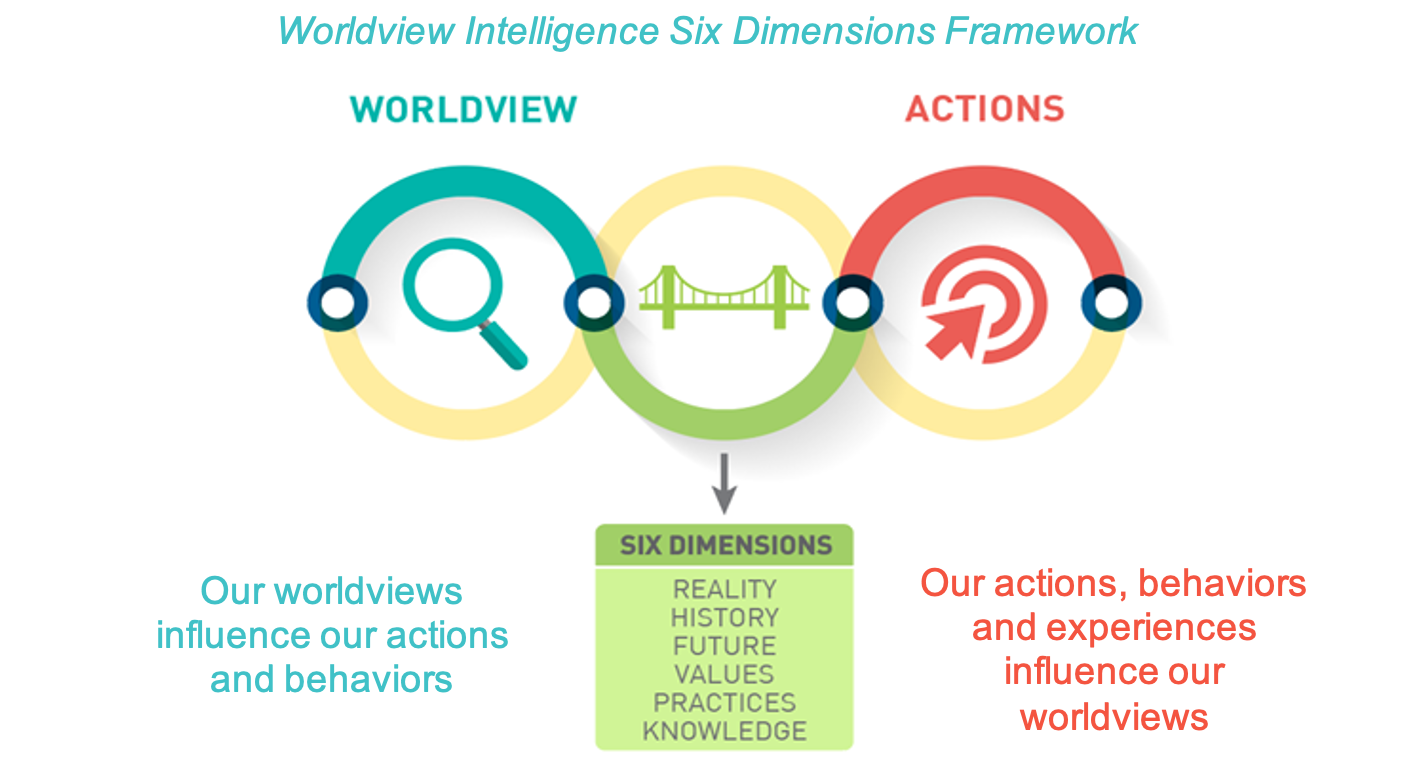
The Worldview Intelligence Six Dimensions Framework is equally applicable and valuable in discerning your own worldviews, that of other individuals or that of your profession, organization, team or department, community or social groups, simply by focusing the explorations through slightly different questions or inquiry. This section provides a brief overview of the Framework. Workshop 2: Know Thyself, will cover this in-depth, giving background on its origins, more information and a greater range of application.
As an overview, the Six Dimensions create a structure for comparing worldviews. This could be a comparison between individual worldviews, team worldviews or organization worldviews. Or it could be a comparison between a current worldview and a desired future worldview in order to map out a change strategy. This will be useful in creating a Vision for your Strategic Workplace Culture Initiative.
The comparisons can also help point to where common ground exists or where there might be differences in views that impact how work and relationships move forward and trust is built or maintained. It can illuminate where and how inclusive behaviors and patterns are needed or have an impact, and where and how belonging can be invited.
Each Dimension can be understood individually or interdependently with any or all of the other Dimensions.
Reality: day-to-day experiences, including belief systems.
History: key influences – people, experiences and more – local and global – that have shaped or influenced how we, individually and collectively, have come to see and experience our world, generally and with respect to specific issues.
Future: how we see, relate to and prepare for the future.
Values: the core commitments that influence and guide us.
Practices: how we live our lives and bring each aspect of our worldview to life; how we treat people, the ways we create the future we have identified.
Knowledge: our understanding of what we know, how we know what we know, what sources of knowledge we trust and how we know our answers to all Six Dimensions are true.
The Worldview Intelligence Six Dimensions Framework can also be used to illuminate blind spots that slow down or halt progress on change initiatives or policy implementation or that get in the way of building Strategic Workplace Cultures. Understanding the depth of issues and challenges allows for a more comprehensive and effective range of solutions. It creates the opportunity to understand how current reality has been influenced by historical patterns and of those, what patterns need to shift to create the future culture that has been identified. It illuminates leverage points for success.

Case Study – Illuminating Hidden Dynamics
A membership-based organization with a staff complement of thirty people was bringing a significant culture change to their organization. One of the leader’s was looking for a new approach to supporting their culture change initiative and recognized that bringing Worldview Awareness into the process would impact their success.
The staff explored their personal worldviews and then their teams’ worldviews, looking for the points of connection and differences so they could find the alignment of worldviews across the whole organization. In the discussions, they had a flash of insight, one that once illuminated was obvious but until then was subtly influencing their interpersonal dynamics. And the insight was frustrating for them. It was that internal communication was an ongoing challenge. People did not know what other people did. Information was not traveling between departments. This is the same work the organization had focused on periodically over the years.
It hit home that building trust and relationship is not a one-time deal. It requires dedicated attention to relationship and communication on an ongoing basis. For this organization, after implementing a Worldview Intelligence approach, their skills and ability in communicating and collaborating grew across departments, which reduced conflict and enabled departments to have more animated conversations amongst staff.

Exercise: Reflections on Worldviews

Course Manual 4: Trust and Relationship
Trust and relationship are essential characteristics of a Strategic Workplace Culture. Without trust, it is hard for people to work together in healthy and constructive ways. And, nothing gets done except by people. People who enjoy working together accomplish more.
The Nature of Trust
The dictionary treats trust as both a noun and a verb. As a noun, it uses words like reliance, confidence, care, hope, and the person or thing in which confidence is placed. As a verb, it centers on the act of trusting, placing confidence or to hope. In a Strategic Workplace Culture, trust is a far broader and more nuanced personal connection or act. It is more a matter of the heart than the mind. It has many characteristics depending upon context. The trust we might place in the person we love is different than the trust we might place in a co-worker or neighbor.
Many people hold a personality characteristic referred to as trust propensity. They start with offering trust when they first meet someone. This comes from life experiences with people and from an underlying belief about whether people can be trusted or not. The offering of trust to new people is part of our individual beliefs. For many in a dominant culture this is relatively easy to do, although for those who have had their trust abused it is much more difficult. Expecting trust is not something to be taken for granted.
Some people like to describe trust as something you have to earn. This means a starting point or worldview of no or little trust, building trust from ground zero. Another perspective is to think of trust as a gift given to someone. They can keep and nurture this gift or lose it. This is a starting position from which trust can then grow or expand or be lost. However, once lost, it becomes difficult to get back.
In your personal interactions with new people you meet outside of a work or professional context, you can become aware of which stance you typically start from: little or no trust, or a kindness towards others that has within it strong elements of trust. With awareness, you choose which stance you might want to take rather than default into one or the other.
The Context for Trust Matters
How far interactions with new people may go is context dependent. You may meet someone on an airplane and expect to never see them again, so nurturing trust is a moot point. You may meet a new neighbor or the parent of your children’s classmate or someone in a recurring social activity and expect to see them again. You can choose to grow a friendship and nurture trust or to be casual in your contact and have limited need to attend to trust.
In the workplace, however, we are often put in a position where we have no or limited choice concerning our interactions with our co-workers, whether in ongoing relationships or new ones. With ongoing relationships, established patterns of relationship and trust will exist. This can work in our favor if the relationships are good and can be problematic if the relationships are challenged. If relationship is challenged, building even basic trust can seem impossible. It requires some of the kindness mentioned above. It demands that someone take the responsibility and initiative to break the patterns that contribute to and likely compound the lack of trust. That someone is likely to be you since you are participating in the Strategic Workplace Culture program.
In the case of new co-workers, the circumstance of a new hire or interdepartmental transfer, you may have limited or no pre-conceived notions concerning that person. With awareness, you can choose your stance with them regarding a starting point of trust.
In other circumstances co-workers can be brought together in forced ways, such as a company merger or acquisition. Constant leadership changes or continuous and sometimes contradictory change initiatives can also force circumstances of new team configurations. These situations bring with them many differing emotions, worldview clashes or pre-conceived distrust. You may oppose the merger or fear it will impact you or your job. You may have heard stories in the community referring to employee dissatisfaction within one of the companies. Your organizations may have very different worldviews. Examples include family versus shareholder owned, faith centered versus more secular in practice, or deliberate decision-making versus rapid action. All could lead to worldview clashes.
In many of these situations the starting point is one of uncertainty, skepticism, worry or mistrust. Building trust requires care and dedicated attention, especially in situations of company or department mergers or new company acquisitions. A Strategic Workplace Culture approach in these situations is to take the time to slow down and learn about each other’s worldviews. The result can lead to a shift from concern about what might happen to employee practices in one or both organizations to a recognition they can be a family of co-workers who trust each other and work together relationally. As noted earlier, it is as much or more a matter of the heart than the mind or an intellectual exercise.
A Strategic Workplace Culture approach to building trust invites you to explore your starting point when you are asked to begin a professional relationship with others. Are you approaching the person, team or organization from a stance of offering trust or are you starting from a different place? Why? What worldview does your employer have that impacts how you see your or other organizations? If you are being judgmental or defensive, how could you be more curious and open? What might the other person’s starting point be? Are you taking that into consideration as you begin working together?

Case Study – Conflicting Expectations
This case study is of a staff team that had concerns about timecard reporting which resulted in growing animosity towards a specific person. The team leader had told this person to be precise in managing timecards and her worldview was to do her job correctly. To her this meant staff arrive at 8:00 and leave at 4:30 and, if not, it was noted on timecards. The team leader told other staff members they could be flexible with their time. This meant if they work late, they can come in late the next morning. This allowed staff who facilitated public meetings that often took place in the evenings, to manage their time in a way they perceived as fair. These mixed messages and conflicting expectations led to a worldview clash that wasn’t evident to everyone until a team conversation about how each member’s worldview influenced how they did their work and reporting was facilitated. The clash was eventually resolved as deeper understanding emerged and the conversation shifted from one focused on individuals to one focused on worldviews.
Using a Strategic Workplace Culture approach, you can begin a dialogue with new co-workers that helps each understand the individual and organizational perspectives regarding daily experiences, history, what the future holds, values and practices and how the team can learn together. Having a better understanding of each other offers a path to nurture trust and build relationship.
As a leader you can begin to imagine what your role is in each of the circumstances described above. How do you help your team members build trust and relationship with each other? How do you set the tone for your expectations within your team? How do you role model your expectations? How do other leaders perform with respect to these questions?
The Nature of Relationship
Trust and relationship generally go together. Relationship is a type of kinship or connection where people see themselves as interrelated. Like with trust, good relationships can have many forms, including the loving relationship between life partners or between parents and children, the love siblings or close friends may share, or the warm and friendly relations between professional colleagues.
It is not possible to be in healthy relationship with someone when there is no trust. And like trust, relationships are more matters of the heart than the mind. People can be in shared context with each other – the workplace, family, social settings – without trust, but they are not in relationship as described here. They are not in a relationship that is supportive and can maintain itself through interpersonal or workplace challenges that will inevitably show up.
Like trust, with awareness you can choose your starting point for building relationships. You can start from a stance of openness and curiosity toward another person and begin a journey together that builds trust and relationship. Or you can start from a stance of suspicion, judgment or mistrust based upon previous experiences or pre-conceived notions, in which case you come to relationship reluctantly or not at all. If you hold open the willingness to be in professional or personal relationship with another and that person does not reciprocate or acts in a manner that negatively impacts the relationship, then it becomes hard to rejoin the journey of building relationship. Examples could be a family member who was not truthful or a co-worker who says something harmful about you to other colleagues or a supervisor. Trust is lost, relationship is fractured, and both are difficult to rebuild.
While relationship is a noun, the action of building relationship is a verb, as in being relational. Being relational is a practice. It is an ongoing approach to how we interact with others. It is a continual action that has several components. Being relational invites us into the work of listening as well as speaking. Listening is a heart-felt participation in a relational process. We listen as a participatory process and for participatory knowing. We listen deeply, openly and compassionately without judgment, to let go of fixed views and to be fully present to the other person or people.
In being relational we keep ourselves open to experiencing the full richness of the people around us. We are open to multiple forms of relationship with others by being in dialogue with them rather than a having a monologic or singular view of other people. From this stance we open up the possibilities of new ways of being together or new possible futures rather than focusing on how things are.
This relational perspective has been described as deeply ecological in that it is a participatory way of relating that gives us the opportunity and the power to speak from the multiple of voices we hold or represent. These voices could be as a parent, grandparent, employee, employer, teacher, preacher, facilitator, planner or any other voice we may have – and not just a single voice that does not represent the richness of who we each are. This ecological or relational stance is one where each of us cares for each other and for our moral selves. When we approach relating in this way, we are less focused on knowledge and truth and more centered on the ethics of our work and the local, interconnected and extended pragmatics of how we work together.
Bringing this relational approach to a new professional or personal context, whether it is a new team member, a merger of departments or organizations, a new supervisor or other situation, establishes a starting point that lays the foundation for building trust and relationship and for a Strategic Workplace Culture.
A Relational Approach to Building Trust
Worldview Intelligence is a relational approach to leading, building workplace cultures, creating trust, transforming differences into progress and changing outcomes. It is a relational approach to connecting, planning for challenging conversations, developing strategies, engaging stakeholders and systems change. This is characteristic of a Strategic Workplace Culture. Trust often falters when exchanges are primarily transactional, when people are only focused on where, and from whom they have benefited lately and when it is only success or failure of the immediate tasks that matter.
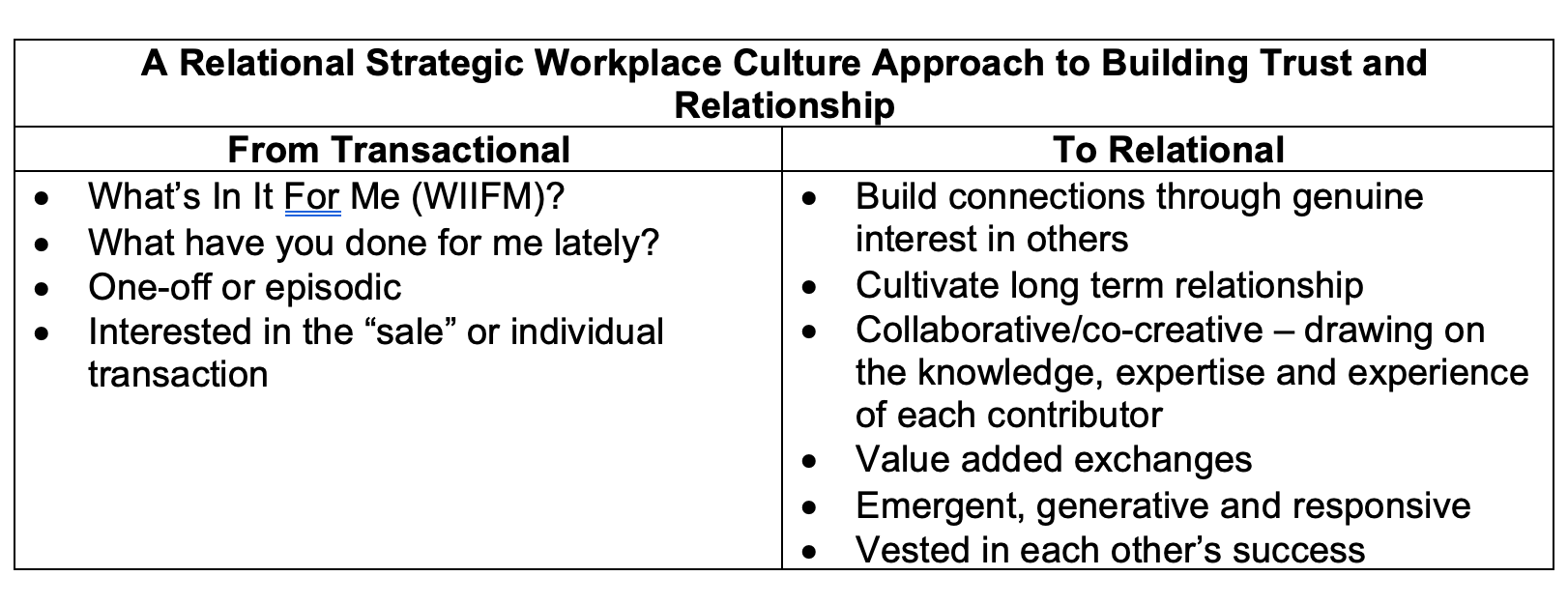
Central to a relational approach is developing an understanding of worldviews and to be able to work skillfully with them in building trust and relationship. Relational leadership recognizes that our experiences, like our worldviews, are socially constructed. A social construct is an idea that would be widely accepted as normal by a group, community or organization. It can be invisible to that group and it may or may not represent a reality shared by those outside the group, community or organization.
Relational leadership understands the fundamental role of language in creating experiences and in influencing relationship and communication. Worldview Intelligence offers new language that aids in entering difficult or challenging conversations or in diffusing challenged team dynamics and relationships.
Points of Connection Essential to Relationship and Trust
From a Strategic Workplace Culture perspective, finding points of connection can change the nature of interactions and allow for more opportunities to build trust and relationship. Too often this is seen as superfluous to the tasks at hand and little relationship building gets done. The myth is to focus on tasks, attend to them and check the to-do items to accomplish change objectives. Rarely is anyone’s work done in isolation, especially these days. Work projects and larger scale initiatives require sequential tasks, handed from one person, team or department to another and possibly back again. More likely, with the increasing complexity of many work environments, interdependent and cross functional teams work together, sometimes collaboratively and usually with competing demands or loyalties, on initiatives and especially larger ones.
Poor relationships and lack of trust get in the way of accomplishing tasks and effective job performance. This can lead to poor morale and, in too many cases, become a toxic work environment. None of these things are conducive to working well at the speed of change.
Building team coherence does not have to be spending days away together on a retreat, testing physical endurance, doing trust falls or role playing bad and good patterns of interaction or dynamics – although it could be. One of the best ways to build team connection and coherence is by attending to the work at hand, focusing on issues relevant to the team and the organization. Opportunities for people to explore their own worldviews, that of the team or the organization can be built into this. For example, you can incorporate into meeting design Worldview Intelligence or Strategic Workplace Culture exercises and opportunities to strategize and plan for the issues most top of mind. This helps team members find points of connection between each other, between other work teams and also between employees and the organization.
Finding points of connection changes how people deal with the differences they experience. It points to more opportunity for information sharing, collaboration and generally strengthens the ability of the team to be in good, even if challenging, work together. They bring more curiosity to the tougher questions or conversations and the environment is often more conducive to exploration than otherwise.
Building Trust to Surface the Diversity of Worldviews
In challenging and complex situations, there is a greater likelihood of views remaining silent because of a real or perceived risk in voicing them. When voices are silent, groups, teams, organizations or communities lose some of the wisdom and intelligence that might otherwise be available to them. It is almost always challenging for anyone to speak a view that differs from the majority opinion, unless that view is intentionally invited in and welcomed – by a consultant, a leader or the group itself. This challenge is compounded when it is not just a differing opinion but also held or offered by a visible minority in the room. Intentionally inviting this diversity of views is best done from a place of humility, exercising the qualities of curiosity, respect, vulnerability, not knowing and compassion.

Exercise One: Your Approach to Trust and Relationship

Exercise Two: How do You Bring Silent Voices into the Conversation

Course Manual 5: Neuro/Behavioral Science
Neuroscience and Behavioral Science offer valuable insights into understanding human behavior, cognitive processes, and emotional responses. This knowledge can be applied to creating a Strategic Workplace Culture through understanding typical, normal responses and addressing them in creating strategies and action plans to improve Workplace Culture.
Neuroscience
Neuroscience provides insights into how the brain functions and responds to various stimuli. This can be leveraged to improve Workplace Culture. Knowing the diverse ways in which the brain functions can promote neurodiversity awareness and create an environment that welcomes this diversity, drawing on it for the health and well-being of individuals and teams or departments. By accommodating different cognitive styles and preferences, organizational leaders develop an inclusive culture that values the unique strengths and perspectives of all employees.
A comprehensive understanding of brain function is provided by the study of neuroscience, including of cognitive processes, emotional responses, and decision-making mechanisms. By delving into the intricacies of neural networks and neurotransmitter systems, employers can gain insights into how employees perceive, process, and react to different aspects of their work environment. This knowledge forms the foundation for designing and implementing neuroscience-based interventions that support well-being and performance.
Research in the neuroscience field sheds light on the effects of chronic stress on the brain and overall health and well-being. By applying knowledge gained from neuroscience, organizations can develop targeted stress management programs that support resilience and psychological well-being among employees.
Neuroscience also plays a role in promoting neurodiversity and inclusion. By understanding the diverse ways in which the brain functions, participants in a Strategic Workplace Culture Initiative can draw upon this information to foster a culture of inclusion where all employees feel valued and empowered to contribute their unique strengths and perspectives regardless of their neurodiverse status.
Neuroscience can play a vital role in improving Workplace Culture by providing a deeper understanding of human cognition, emotions, and behavior. This understanding and the strategies and action plans that emerge from it, contribute to creating a healthy and thriving Workplace Culture where employees feel supported, engaged, and empowered to achieve their full potential. As neuroscience continues to advance, its impact on shaping Workplace Culture is poised to grow, leading to more innovative and people-centric organizations.
Neural Pathways
Information travels through neurons or nerve cells of the brain, creating what are called neural pathways. A lot of the programming in the body is “hard-wired” into us before we are even born, including neural pathways. New neural pathways are also being created all the time, although not all of them survive long enough to flourish.

Each time a neural pathway is travelled, through a pattern or habit, this specific neural pathway is strengthened. Each time a belief or strongly held opinion is reinforced, a neural pathway is strengthened and deepened. It becomes like a rut in well-travelled roads where the tires of the car follow the rut in the road. Moving to a different part of the road can feel risky in addition to requiring intentional decision and focused movement.
The flip side or opportunity is that every time something new and different is experienced, we also begin to create new neural pathways. Even if this initially happens by accident, we can also be intentional in reinforcing new neural pathways. While it is often said to take 21 consecutive days of consistent effort to change a habit or develop new ones, thanks to the work of Maxwell Maltz and his 1960 book, Psycho-Cybernetics, newer research from a 2009 study suggests it is more like two months. If the new neural pathway is to deepen, it needs to be frequently reinforced, so patience is required.
If you have a tendency to defend your worldview – and it is the human tendency – then every time you argue in support of the way you already think, you impact your brain by deepening these specific neural pathways. The more you do this, the harder it is to change your mind or your thinking.
Each time a circuit is activated, the synapses get stronger. If that circuit inhibits another circuit, like a competing belief or habit, the inhibited circuit gets weaker. Repetition strengthens synapses. It doesn’t matter if what is repeated is true or not, a threat or not, opportunity or not. The brain doesn’t know the difference between what is real and what is imagined. This is why visualization of goals works so well for many people. Remember the athlete before they begin their run or their routine. They close their eyes and go internal to visualize what they are going to do. The difference between gold, silver and bronze in many elite competitive sports is often miniscule in terms of time or score.
Behavioral Science
Behavioral science plays a significant role in improving Workplace Culture by providing insights into human behavior, group dynamics, communication, motivation, conflict resolution, decision-making, and more. By drawing on behavioral science knowledge, organizations create a healthy and productive work environment, contributing to employees feeling valued, engaged, and motivated to contribute their best efforts. As workplaces continue to evolve, the integration of behavioral science will remain instrumental in shaping a culture that fosters innovation, collaboration, and employee well-being.
Communication is fundamental to a healthy Workplace Culture, and behavioral science can inform communication strategies to be more effective. Techniques such as active listening, empathetic communication, and awareness of non-verbal cues, facilitates clearer and more meaningful interactions among employees and members of teams.
Conflicts are inevitable in any workplace, but how they are dealt with significantly impacts workplace culture. Understanding behavioral science means appropriate strategies for effective conflict resolution are shared and used by everyone, such as awareness of cognitive biases, promoting empathy, and facilitating constructive dialogue. By addressing underlying causes of conflict and promoting a culture of collaboration and mutual respect, leaders can build stronger teams and enhance overall productivity and innovation.
Understanding your own reactions to situations that impact you – people, art, music, language or even world events – gives you an opportunity to work with your responses to find new ways to approach challenging situations or conversations that matter to you. Knowing what might be behind someone else’s reactions offers the opportunity to be thoughtful and strategic in how to engage the conversation and the person in ways that advance the issue you are care about, your understanding of it or the relationship.
Understanding Worldview and Identity Reactions
Psychological research tells us that when our personal identity is threatened, we respond as if our life has been threatened. This is why sometimes a person’s reaction to something you said seems out of proportion to what was said, or maybe it was a reaction you had that logically you knew was out of proportion to the situation, but you couldn’t prevent your own response.
The more we work with worldviews, the more we see how the behavioral and brain science research provides explanations for why we are so attached to our worldviews. Worldview Intelligence offers strategies and skills for addressing situations where worldviews, or how attached we are to them, contribute to the challenges at hand or stuck issues. We can then find ways to create exploratory spaces to make progress on these issues. As a leader, you can examine your own experiences in building trust and relationship and evaluate your strategies for ongoing success.
This research also helps in understanding why certain conversations are becoming more fragmented and more polarized, to the point that people are often asking some version of this question: “How do I have a conversation with my neighbor or family member or co-worker who has a different worldview than I do?” Most commonly the focus is on social or political views on topics like same sex marriage, gender identity, abortion, euthanasia, immigration, race or a specific political candidate.

Case Study – Industry Changes and Identity
For 500 years or so, the fishing industry had largely shaped the lives and communities of Canada’s Atlantic coast. Much of the economy of the four Atlantic Provinces (Newfoundland, Prince Edward Island, New Brunswick and Nova Scotia), especially in small towns and villages, depended on the fishery. Not only did it shape the identity of individuals and families for generations but fishing, fishing boats, fish factories were the fabric of these communities.
They celebrated good catches together and mourned tragedies together, such as loss of boats and their crews in fishing accidents and lost to the sea in storms that ravage the ocean from time to time.
In 1992 the Canadian Government declared a moratorium on the Northern Cod Fishery due to a dramatic decline in cod stocks. This had an immediate and devastating impact on the communities in Atlantic Canada and on the lives of individuals and families that depended on this way of life.
When the federal government announced retraining initiatives for fishermen and their families, the fishermen said, “I don’t want retraining. I want to fish.” On the surface, this seems ungrateful, irresponsible and unrealistic given there was no indication of when or whether the fishing stocks would rebound. Understanding it now from a Worldview Intelligence perspective, if I’ve been a fisherman all my life, my father and his brothers were fishermen, my grandfather was a fisherman, the fishing boats and fishing licenses were passed from one generation to the next, my grandmother, my mother, my aunt all worked in the fish processing factory, our community’s livelihood revolves around the fishery, then my whole identity and that of my family and my community is intertwined with fishing. My history, reality and anticipations concerning the future (3 of the 6 Dimensions in the Worldview Intelligence Six Dimensions Framework) are significantly defined by fishing. Knowing that, might we find a different way into that conversation? Might we have more compassion for people we label as resistant to change? Might we find another way to engage that relationship and even build trust?
Not every coastal town has survived or is surviving. Those that are, have expanded their worldview about who they are and what opportunities exist. Some are thriving tourist towns now. There continues to be a dynamic tension in these communities on whether the future can be an extension of the past or if it needs to be dramatically different. People long for a quality and way of life they feel is threatened.
Substitute farmer and farming family and community, or miner and mining family or community, for fisherman, fishing family and community, and you can see how this dynamic plays itself out all over the world. This is identity rooted in history, a way of life or reality, anticipation of the future and values and practices passed from one generation to the next.
Cognitive and Behavioral Science Research
Cognitive and behavioral science research tells us that reason is not rational without emotion. For many people this will seem counterintuitive, especially in a society and in workplaces that have emphasized the value of logic and rationality. As human beings, our relationship to facts is interesting. According to one definition, facts are specific, observable and verifiable. Any two or more people looking at the same thing should be able to name the same set of facts. It is difficult to just focus on the facts, or what the eyes can see. There is a tendency to embellish and add description. This is where it becomes even more challenging because our worldviews influence what we see and interpret as fact. Interpretation of facts becomes even more varied and challenging to discuss when we values come into play and facts are framed from that interpretive lens.
How often in your conversations, do you say something like, “The fact is….” But is it really a fact or is it more likely an opinion, a belief or your experience? When you refer to something as a fact or as fact, do you mean that you think or believe it is true or correct? It may not be. It may be an interpretation of an experience. It may be a belief or a firmly held conviction on something – so firmly held, you believe it to be true. Most arguments are not won or lost based on facts. Persuasion is more likely based on passion or conviction, substantiated or not.

Exercise – Reflection on Changing Minds
Fact and Truth(s)
We often equivocate between fact and truth. There are very few, if any, truths that are universally held (outside of a few scientific truths like gravity). What is true for you may not be true for someone else. Facts are knowledge or information based on actual occurrences that can be verified. However, the interpretation of facts varies significantly. For example, setting aside economist jokes, it is a common occurrence in the profession for economists to have the same set of facts or data and interpret them differently. A good example is rate increases for consumers of electricity. One economist may argue that the data indicates a need for an increase of some amount and another may argue that the data does not support an increase or a much lower increase is warranted.
Facts get confused with opinions. Opinions are a view or judgment formed on something that is not necessarily based in fact or knowledge but is a personal view, attitude or appraisal. Opinions, like beliefs strongly held, can feel like facts. We hold opinions so strongly that we are often unwilling, sometimes even unable, to shift from them. Your opinions, like your worldview, begin to form before you are even aware of this happening. You may or may not question some opinions you hear or absorb early on. Your experiences inform your opinions, again like your worldviews. Once you state your opinions, you may be asked to explain them. As you explain them you might be able to discern how attached you are to them, unless you are engaged in a debate, in which case you may find yourself looking for reasons or explanations to support your opinions and thus become more attached to them. Every time you argue a specific point, you change and deepen those neural pathways in your brain, creating super highways along which the information travels faster and faster.
Your opinions are often reinforced by people around you who think like you, who view the world in a similar way that you do. People with similar opinions or worldviews are called reference groups. Reference groups mirror back to us opinions and beliefs and what is considered acceptable behavior. It is these reinforced opinions that are more likely to get people into deeply polarizing conversations with people who hold different views.

Exercise – Reflection on Team Experiences

Case Study – Cambridge Analytica and Its Role in Brexit
Cambridge Analytica capitalized on understanding how our brains process information before, during and after the 2016 US election and in the lead up to and post the Brexit vote, also in 2016. Targeting people through their social media habits by segmenting specific messages to individuals, Cambridge Analytica used its knowledge of how messaging to the brain works and how behavioral science shows how we seek to confirm our views. They manipulated massive amounts of information using algorithms they created to see what links people clicked on. Then they showed people similar articles and posts to keep reinforcing their views. In this process, Cambridge Analytica became more and more targeted in their approach to individuals and reference groups. Much like niche marketing, select groups of people received specific, targeted social media feeds, almost to the exclusion of anything else. There was no balanced perspective on any issue, only the perspective that grew people’s attachments to the way they were already thinking.
Because of this, groups of people would have no crossover in news feeds or articles with other groups of people. If one person is only seeing one stream of thinking and another is only seeing another stream of thinking, there is no middle ground, no infusion of competing ideas that might link them together or catalyze creative thinking. Then we wonder how people have such dramatically different views. “How could they possibly think the way they do?” It doesn’t make sense to us because it doesn’t link to any of the information we have been receiving or any of the views we have formed.
Behaviors that Influence Actions
There are a host of behaviors that science has identified and described that influence our actions. Here are a few that have been most helpful in the Worldview Intelligence work in understanding typical human behaviors.
Naïve Realism is the behavior that as human beings we tend to have a built-in bias that we are not biased. This makes us believe our own view is reasonable, even if it isn’t, while it causes us to be more likely to dismiss other people’s views as we name other people as having biases.
Confirmation Bias reflects our need to continually confirm our own point of view by looking at and for information, data and facts, perspectives, opinions and beliefs that support our worldviews, otherwise known as confirmation bias. This is a behavior continually running in the background, often without our awareness. The more you see, experience and hear something, the more you believe it, even if it is not true.
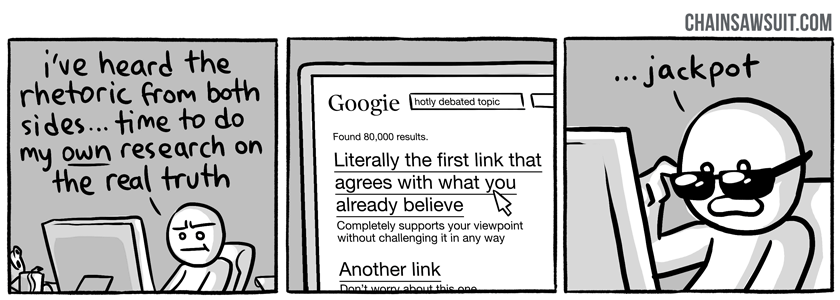
Motivated Reasoning reflects a more conscious tendency to search out information. Once we have decided something, anything, and if this decision is challenged in any way, we deliberately seek out information that supports and validates that decision.
Cognitive Dissonance is the behavioral tendency to dismiss, out of hand, disconfirming facts regarding our opinions or beliefs. When we are presented with evidence that works against a belief, the brain does not want to accept the new evidence. It creates a feeling that is extremely uncomfortable and the brain’s preference is to dismiss the new information.
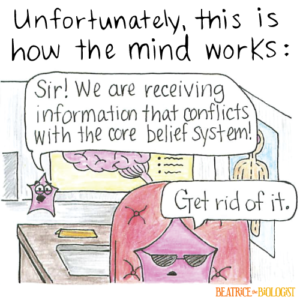
Loss Aversion is related to something called the endowment effect. When we have something, we assign it greater value than its actual value or worth, and we are usually more fearful of losing something than we are excited to gain something that may be better or greater, which we view as not guaranteed.
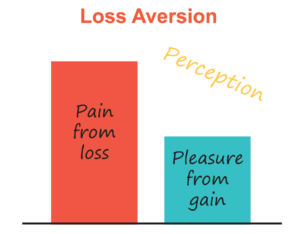
Sunk Costs is our tendency, once we analyse a situation and make a decision with respect to it, to stick with that decision. The analysis becomes a sunk cost or investment, and we stick with our investment. The idea of sunk costs also holds true for worldviews. Once we make a decision based on conscious or unconscious analysis, it becomes part of our identity and we stick with it, even if contradictory information shows up.
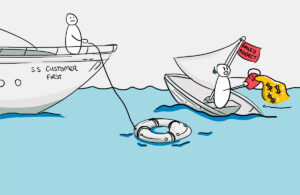
Group Polarization results from when we are constantly around people like us, who have the same or similar worldview as we do. We can become more extreme in our views and less empathetic or compassionate towards people that hold a different or opposite view.
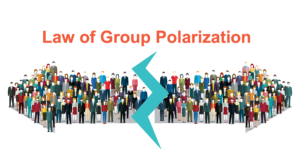
These behaviors will be explored more fully in Workshop 6 on Informative Neuroscience, including strategies and tactics to support broadening perspectives.
Team Practices
Looking to cognitive and behavioral science research on typical human patterns and interpersonal dynamics is revealing. You can likely see now how it is connected to worldviews. Simply having an awareness of these natural, typical responses can be enough to allow you and your team to question some of your own automatic responses. As a leader and with your team, it is helpful to incorporate some simple practices of curiosity and inquiry, especially when any member of the team notices any of these behaviors or dynamics clicking in, individually or collectively.

Course Manual 6: CIDA-W Planning Model
For a Strategic Workplace Culture Initiative to be successful, it requires a clearly articulated change process, otherwise known as a Theory of Change. This section provides an introduction to the Worldview Intelligence Theory of Change called CIDA-W: Clarify, Illuminate, Design, Act and Worldview Intelligence Leadership, describing its relevance to the Strategic Workplace Culture Program and Initiative.
Theory of Change
A Theory of Change is a comprehensive framework for program planning and implementation. The elements of a Theory of Change delineate why a desired change is needed and articulates how to achieve this. It sketches out the process of change, outlines causal linkages within the initiative and identifies shorter-term, intermediate, and longer-term outcomes. It makes the distinction between current state and desired outcomes, identifying the gaps so that strategies and action plans can be created to bridge the gaps. From time to time, outcomes achieved are compared to desired outcomes to track progress and to make any adjustments that might be necessary as a result of what is being learned through this process.
The Worldview Intelligence CIDA-W Planning Model
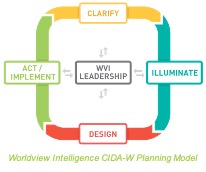
So, what is the Worldview Intelligence Theory of Change Planning Model? It’s called CIDA-W, which stands for Clarify, Illuminate, Design, Act and is centered around Worldview Intelligence Leadership. It was derived from the experience of working with businesses and organizations, creating proposals and developing project plans tailored to the need, purpose and outcomes identified.
It is an interdependent and iterative model. Information or results obtained in one part of the process can inform other parts of the process; and sometimes adjustments need to be made to the plan as a result of information gained. CIDA-W is helpful for each stage of the project or initiative. Throughout your Strategic Workplace Culture Initiative, the phase or phases of CIDA-W that applies is identified. Workshop 8 is focused on Worldview Planning and CIDA-W, to consider how it is being used throughout the Program and to identify various other ways you can work with it in any other application.
The following chart summarizes each Planning Stage, giving examples of what can be addressed in each stage and ideas of how to address them. All of these examples will be covered in different Workshops throughout the Program. Following the chart, descriptions of each stage are provided.
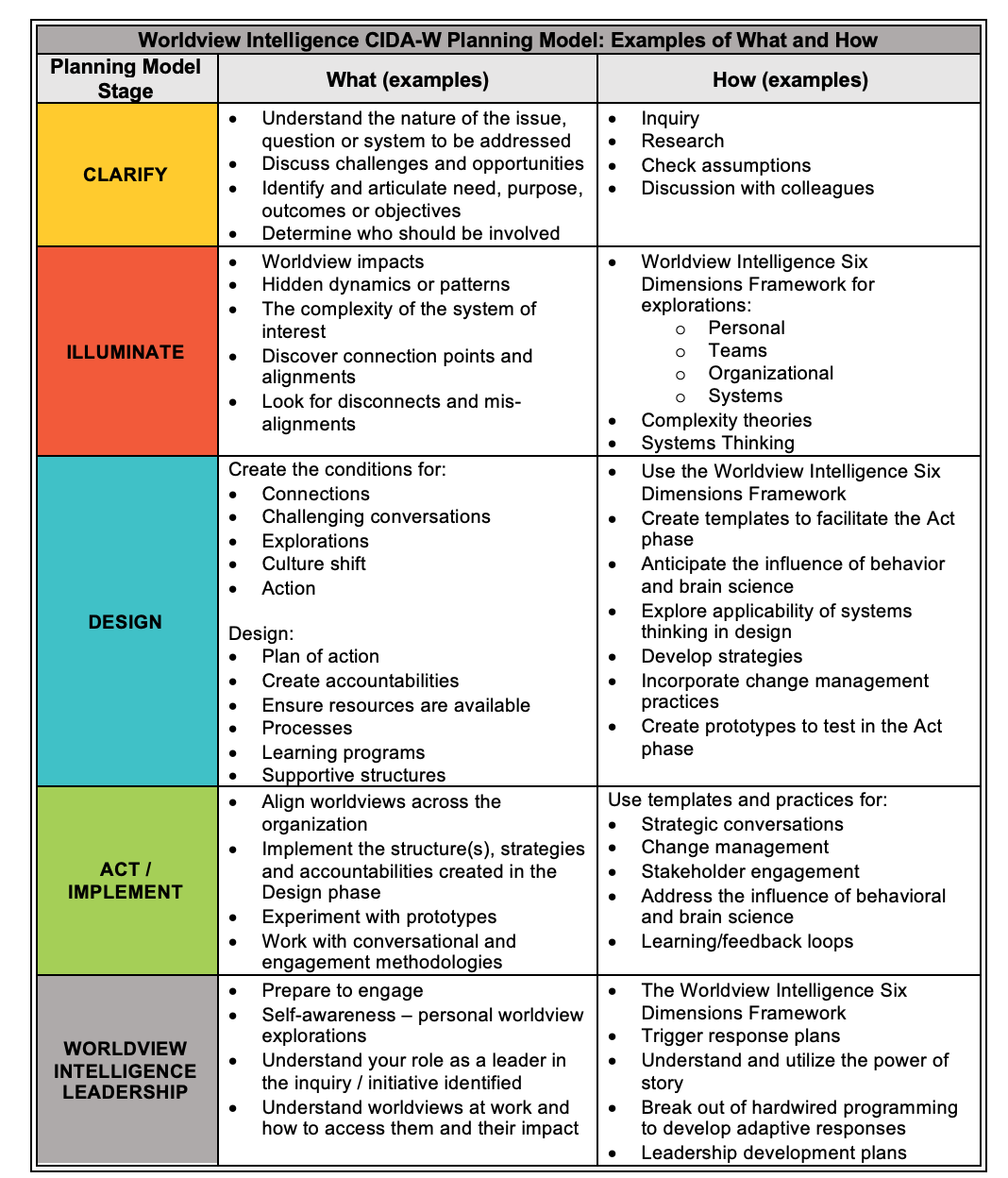
Clarify
When applying the Worldview Intelligence Theory of Change, the first step is to clarify the issues, challenges or opportunities that are present and are to be addressed, along with the outcomes desired for the future. A number of different questions can be used for this inquiry.
* What is the need to be addressed and the purpose that will address the need?
* Are there specific principles to be articulated that will help guide the work, the approach to the work and how team members or workplace colleagues are in relationship to each other?
* Who are the people who need to be involved and to what degree?
In the clarifying stage, the questions asked help the team gain more information or insight on the issues, challenges or opportunities identified, and any interventions or solutions that may have already been tried.
For this Program, the inquiry is focused on the Strategic Workplace Culture Initiative. What is the reason your company decided to undertake this initiative? What are the challenges indicating a culture change or enhancement is necessary or might be helpful? What are the goals and desired outcomes for this Initiative, or what will be different when this Initiative is successful? These questions will inform the creation of a Vision for the Initiative, as well as in focusing attention where it is most useful throughout the Program.
Illuminate
Before developing a plan or creating action steps for this Initiative, it is informative to shine a light on all factors that are or could be impacting the current situation, including what we might refer to as “hidden dynamics”. Hidden dynamics are patterns, practices, actions or behaviors that contribute to the current workplace culture and are doing so without having been examined, talked about, or illuminated. Just identifying and naming these dynamics can go a long way towards mitigating their influence and, more than that, strategies can be created for a deliberate shift aligned with the future Vision and a healthy Strategic Workplace Culture.
The Worldview Intelligence Six Dimensions Framework is a key structure for illuminating dynamics that often are hidden. It can be used to make the multitude of worldviews that are inherent in any situation visible, to be able to work intentionally with them, to find connections and alignments – or disconnections and misalignments – and turn them into strategic advantages. It is equally useful in understanding and comparing the worldviews of individuals, teams, or departments across the organization and in identifying the elements of historical, current and desired future worldviews. In this way, the gaps become clear and strategies and action steps to address them become part of the plan or Initiative going forward.
In the process of the Illuminating stage, more information may come to light that further clarifies the need, purpose and scope of the work to be done. Sometimes Illumination can be done with a small planning team and other times, it can start there but then become a key part of the structure and design of the project or initiative, engaging more people and various perspectives as momentum builds.
One key aspect of Illuminate is to be in ongoing inquiry to continue to surface underlying issues or blind spots. You can identify what structures are in place that inhibit different results from emerging and what existing structures are or could be useful in shifting dynamics. Be curious about behaviors that illuminate helpful and hindering structures. Clues are everywhere, discernable to the individuals and teams who want to surface them.
Design
A more comprehensive understanding of the issues at hand and probable causes of the problems, concerns, opportunities and patterns coming out of the first two steps, allows for comprehensive process designs to be created to address the need, purpose and outcomes of the project or initiative.
Processes, systems and structures are then collaboratively adapted or newly designed and later modified based on experience to elicit and support these outcomes. A wide variety of tools and methods can be drawn upon, including systems thinking, social system and asset mapping, Appreciative Inquiry, the Diamond of Participation, the Chaordic Path and the Chaordic Stepping Stones, to name a few. All of these are further explained and articulated in various Workshops throughout this program with the opportunity for application as it makes sense in action planning.
Act
Nothing gets done without action. This involves the strategic use of conversational or engagement methods and practices to get work done, to address issues or challenges and solve problems and provide continual illumination and alignment of worldviews. It also includes the alignment of worldviews that gets everyone and the organization on the same page for moving forward. This is the stage where project plans or operational plans with accountabilities and timelines are developed and implemented, action items are completed and progress takes off.
The personal and leadership alignment between worldviews and action is essential. The outcomes of actions feed back into the Planning Model, assessing whether the outcomes have been achieved or, as the environment, conditions or understanding of the issues changes or evolves, how responsive the team or organization needs to be in adapting to changing conditions. It may inform next steps or new initiatives to be undertaken.
Throughout this, as a leader in your organization, you will want to ensure your own practices continue to maintain and grow trust and build relationship.
Worldview Intelligence Leadership
At the heart of the model is Worldview Intelligence Leadership. As noted in previous sections, this is the ability to work effectively with many worldviews. It begins with self-knowledge of your own worldview and an awareness of your activation or trigger points. This is a major focus in Workshop 2: Know Thyself.
Applying Worldview Intelligence Leadership strategies, also referred to as Relational Leadership, establishes the foundation for work with team members, internal groups or departments and external partners or stakeholders. This Program focuses on the internal environment throughout much of the program and Workshop 11: The Outside, will examine how creating a Strategic Workplace Culture has a positive impact on your organization’s external reputation and enables you to enhance the quality of relationships you have with external stakeholders including customers, partners and the community.
The Six Dimensions of the Worldview Intelligence Framework – history, reality, future, values, practices and knowledge – provide a coherent structure to organize thinking, seek points of connection and discover points of difference, offer insight into patterns and dynamics as well as a path to solutions for many pressing issues. It provides insight and strategies for building trust and relationship. It informs, and is informed by, each step in the CIDA-W Planning Model, including each iteration.

Case Study – A US Based Healthcare Company
When we see it, it’s obvious. Until then, it’s a hidden dynamic. The Worldview Intelligence CIDA-A Planning Model creates opportunities to reveal “the obvious”. This makes it possible to strategize relationships and communications in ways that move issues of common interest forward, often in new and previously un-thought-of ways. This case study of a US based healthcare company provides insight into how this can happen.
At the time, this healthcare company had clinics and hospitals in cities and towns in three Midwest States. They created a pilot project to introduce multi-disciplinary care teams in six of their clinics. This project had been underway for a year when they brought members of the teams together to make connections, share experiences, discover what they were learning and decide next steps, both for the pilot and for an expansion of the initiative.
As one way of illuminating the systems they were working within, the teams were asked to map their social systems, and then come back and share what they discovered through this exercise with the whole group. A social system is the patterned network of relationships constituting a coherent whole that exist between individuals, groups, and institutions. It is the formal structure of role and status that can form in a small, stable group. By mapping a social system, individuals and teams make visible the connections between teams, between organizations and other stakeholders. These visual maps provide a different way to talk about relationships and impact.
Social systems mapping was not new, but looking at the mapped systems using the Worldview Intelligence Six Dimensions Framework was. It had the clinic teams asking different questions to reveal the hidden dynamics and unintended consequences and to determine how to work within and across the system.
One of the clinics, located in a larger center, had an ongoing relationship with two other clinics in that area that were not part of the pilot. They had spent over seven years working on building consistency across the three clinic sites so patients would have a similar experience no matter where they went. The clinic that was in the pilot project realized that this was putting their relationships with the other two clinics at risk because they were now changing their approach to patient care and the other clinics did not have the same context.
Another revelation of note is that for each of the clinics, as they mapped their system, the co-ordinating team was either not on the map or only there in a peripheral way, whereas for the co-ordinating team the clinics were a significant part of their map. This awareness created the opportunity for the members of the co-ordinating team to question why this was so and to become curious about their relevance and role, leading to an exploration of what needed to shift to support the clinic teams differently and more relevantly.
When you read the outcome of the explorations, the results seem obvious. Yet, until the patterns are illuminated, they remain a hidden dynamic, influencing relationships, trust and the flow of work.

Exercise: Reflection Questions

Course Manual 7: Shifting Patterns
Behavior patterns within organizations can have a profound impact on their overall performance, culture, and success. Common complaints in organizations, no matter their size, are: “we work in silos”, “we don’t really know what other teams or departments do”, “they don’t understand how we work”, and “we don’t communicate well”.
Like individuals and teams, departments, divisions and companies all have worldviews. These worldviews can compete with each other and they can clash. They can also support or complement each other. Awareness of worldviews, clarifying and illuminating their impact, strengthens a team’s contribution to their departments or divisions and to the company culture overall.
The impact of patterns is not always visible. A multiplicity of worldviews contributes to and feeds into the patterns and behaviors in organizations. Making worldviews visible can bridge information and communication gaps that exist. Worldview Intelligence helps departments make connections with each other, open explorations and improve relationships to break down silos, address negative behavior patterns and draw on each other’s strengths. Competing worldviews can be aligned to work and move in the same direction, toward the Strategic Workplace Culture vision articulated about Workplace Culture and aligned with company goals.
The stories shared within the organization and externally say a lot about Workplace Culture. This impacts individual and organizational performance, recruitment and retention. Worldview Intelligence can help shape, influence and inspire the stories people focus on, to increase the stories that indicate how desirable the company is as a desired place to work.
Structures
Structure is how something is put together. It is a construction or framework of identifiable elements that defines relationships. In the case of Workplace Culture, this means relationships between parts of the company. Structure brings or imposes order, connecting parts together in an organized way.
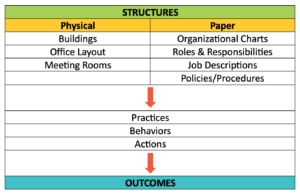
Physical structures in organizations include everything from the building or office the company is in, to the office layout, rooms available for meetings and the set-up of those rooms. Non-building structures include organizational charts, roles and responsibilities, job descriptions, procedures and policies, performance management systems and formal reporting structures. Structures are intended to support individuals, teams and departments in doing their work and, unfortunately, more often get in the way due to unexpected barriers or unintended consequences.
Building more, or more detailed, policies (which are essentially structures) to address each new problematic behavior pattern that emerges puts the locus of responsibility somewhere external to the relationships. This often makes policies or procedures more complex than they need to be in the pursuit of trying to close loopholes. The right Workplace Culture conversation and the right consequence in the right moment goes a long way towards alleviating behavior that does not fit within a Strategic Workplace Culture or in reinforcing behavior that does. The ability to have this conversation requires skill development and practice.
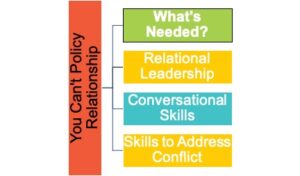
An organization can have as much structure and as many processes that can be thought of, but it still comes down to relationships and developing the skills to have the needed conversations at the point and in the relationship where they are needed. Unfortunately, rules and policies, and the enforcement of them, do not create or build a Strategic Workplace Culture when trust in a team or department has become an issue. Nothing builds unhelpful policy and procedures like creating one to deal with the one or two people who bring negative influences to the team or organization or who abuse the policies.

Exercise – Reflection on Your Organizational Structures

Case Study: An Overheard Conversation
People in airports and airport lounges sometimes seem to be oblivious to people around them, conducting virtual meetings in the middle of common spaces, speaking loudly on phones or amongst each other. One such overheard conversation was about expense claim submissions, between three people who worked for the same company. If they were expensing a meal, they had to identify who all was at the lunch or dinner, and the average cost among all diners had to be within a certain amount per person.
One of the people asked, who else could be added to the dinner tab so that it hit the required average? It didn’t matter to them whether the person was actually there or not, so long as they could hit the right numbers. Likely this policy came into being because the company was trying to rein in costs. Like any policy, those who must adhere to it are able to find ways around it. In this case, it seemed a common practice. What messages does this send about the company culture?
Negative Behavior Patterns
It is common for individuals and teams to experience the impact of silos, even in small companies. This behavioral pattern can result in duplication of efforts, misalignment of goals, and missed opportunities for synergy and innovation. Silos can also lead to a lack of shared knowledge, resources, and best practices, hindering organizational effectiveness and agility.
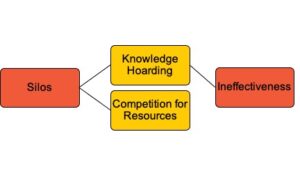
People tend to share information with the people closest in physical proximity to them, especially when working on the same project or initiative. They forget that it might be valuable to include people in other parts of the organization and, for that matter, other partners or collaborators, in their conversations. This can sometimes be intentional if people think knowledge is power. More often it is a function of structure and “out of sight, out of mind”.
Worldview Clashes and Poor Communication
There is also the possibility for worldview clashes. If one department has the role and responsibility of community organizing, another department is responsible for revenue generation and another is responsible for distributing funds, they sometimes forget that sharing of information could be beneficial to all. The same can happen in healthcare amongst care providers and revenue generation and administration. Or in business between marketing, research and development, and finance. People with differing departmental worldviews may be more likely to see competitive agendas than aligned purpose and outcomes that can be worked towards collectively. It requires consistent, intentional practices, structures and effort to work across silos or organizational structures to capitalize on the best thinking or worldview perspectives of the people involved.
Poor communication within an organization can lead to misunderstandings, conflicts, and inefficiencies. When communication channels are unclear or ineffective, important information may not reach the right people at the right time, leading to delays, errors, and missed opportunities. This can result in decreased productivity, low morale, and a breakdown of trust among team members.
The “Quick Fix” versus Tried and True
Discovering new approaches to communication, relationship, connectivity and building trust can broaden perspectives, create alignment and improve decision-making. Some approaches or ideas are not entirely new but rather a reorientation to tried and true actions and ways of being that stand the test of time. Some would say there is nothing new under the sun. Solid leadership, communication and change management practices have existed for millennia. In most situations they are not well practiced, they are not coherent, or they are ravaged by the pressures of time. They are rejected because people look for the quick fix. In the Strategic Workplace Culture Program, the “tried and true” are reoriented through the Worldview Intelligence approach. This approach offers new ways of thinking, new language, frameworks and models to support structured explorations.
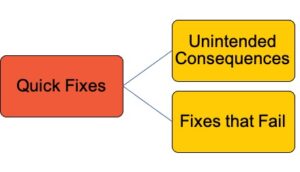
Another point of contention within teams often comes with lack of role clarity and clarity of accountability and responsibility of team members. When members of the team are not clear about the scope of their responsibility, things fall through the cracks and this impacts trust and relationship. The same is true when there are several team members vying for certain areas of responsibility. Too much overlap can happen, efforts are redundant or create confusion and no one is happy. Making sure roles are clear, and being in the practice of conversation around them when they are not clear, makes a significant contribution towards making or breaking trust and relationship and establishing a Strategic Workplace Culture.
Resistance to Change and the Impact of High-Stress Environments
Resistance to change is a common behavior pattern that impedes organizational growth and adaptation. When employees are resistant to new ideas, processes, or technologies, they may cling to outdated methods or routines, hindering innovation and progress. This resistance can stem from fear of the unknown, lack of understanding or involvement in the change process, or perceived threats to job security. Overcoming resistance to change requires effective communication, engagement, and support from leadership. Neuroscience and Behavioral Science, introduced in Section 5, provides insights into this human behavior patterns and points to strategies to shift patterns and behaviors.
Behavior patterns that contribute to a high-stress environment or burnout among employees can have detrimental effects on both individuals and the organization. Excessive workload, unrealistic expectations, lack of work-life balance, and poor support systems can lead to burnout, decreased job satisfaction, and increased absenteeism and turnover. Prioritizing employee well-being and implementing strategies to manage workload and promote a healthy work environment is part of a Strategic Workplace Culture.
Negative behavior patterns within organizations can manifest in various forms and have wide-ranging impacts on productivity, culture, and employee well-being. When company leaders identify, address, and mitigate these negative behavior patterns they support an intentional culture. This is done through effective leadership, communication, accountability, collaboration, engagement and a focus on promoting a healthy and inclusive Workplace Culture. By proactively addressing negative behavior patterns, leaders foster a Strategic Workplace Culture that is healthy, engaged, and high-performing.

Exercise – Identifying Touchstones
Shifting Patterns
Shifting behavior patterns within an organization is a complex and multifaceted process that requires careful planning, implementation, and ongoing evaluation. The first step in shifting behavior patterns is to clearly identify the specific behaviors that need to change. This requires a thorough assessment of the current state of the organization, including analyzing performance data, conducting surveys or interviews, and gathering feedback from stakeholders, a subject introduced in Section 8. By pinpointing targeted behaviors, organizations with a Strategic Workforce Culture can develop more focused strategies for intervention.
Once target behaviors are identified, exploring the underlying causes that drive these behaviors will offer insights useful to both understanding and addressing them. This may involve examining organizational culture, leadership styles, incentive structures, communication channels, or external factors impacting behavior. By gaining insight into the root causes, more effective strategies for shifting them can be developed. This is the subject of Workshop 7: Shifting Patterns.
A clear and compelling Vision that communicates why change is necessary and what the desired outcomes will be is a starting point for shifting behavior patterns. A Strategic Workplace Culture Initiative begins with this clear, shared vision. When done well, it will articulate a compelling case for change, highlighting the benefits for individuals, teams, and the organization as a whole. As part of the Initiative implementation, this Vision needs to be communicated consistently and regularly to ensure alignment and buy-in from all stakeholders.
It is necessary to engage and empower employees throughout the process to build commitment and momentum and to make success visible through celebration. This can be done through appropriate involvement in decision-making, particularly around things that directly impact their work or role; providing opportunities for input and feedback; and offering training and development programs to build necessary skills and capabilities. When employees feel valued and empowered, they are more likely to embrace change and actively contribute to behavior shifts.
Behavior change is a continuous process. it requires learning, adaptation, and flexibility. Leaders that create a learning environment where experimentation, innovation, and risk-taking are encouraged are more likely to have thriving organizations. This may involve implementing pilot programs, prototyping new ideas, gathering data and insights, and making adjustments based on results. By fostering a culture of learning and adaptation, organizations can sustain behavior shifts over time.
Celebrating successes and acknowledging progress helps maintain momentum and motivation when implementing a Strategic Workplace Culture Initiative. Recognizing and rewarding individuals and teams that demonstrate desired behaviors and achieve positive outcomes builds commitment. At the same time, learning from failures and setbacks by analyzing root causes, adjusting strategies, creates the opportunity to apply lessons learned to future initiatives.
Shifting behavior patterns in a company requires a systematic and comprehensive approach that addresses root causes, engages stakeholders, communicates a compelling Vision, provides clear expectations and feedback, models desired behaviors, facilitates learning and adaptation, and celebrates success. By following these strategies and principles, organizations effectively drive behavior change and create a Strategic Workplace Culture.
Changing the Story
The shortest distance between two people is a story. Story is how we make sense of our experiences. We are constantly telling stories about what happened to us in our work and personal lives, whether we realize it or not. The way we tell our stories helps shape our understanding of our experiences. There are things that happen you might take no notice of, but others do. There are other things that happen that play a big role in your experiences or perceptions. The stories we tell influence how others see the places where we work. The stories we tell can influence decisions and actions or behaviors of potential or new employees.
Sharing stories humanizes people and offers an opportunity to build trust and relationship. A Strategic Workplace Culture gives attention to the stories being told. When people consider who or what has influenced their worldview and in what ways, and then share those stories with other people, it creates points of connection. When those points of connection appear, they offer the opportunity to explore difference, supported by new insights and awareness. When we start with difference, difference is amplified, and it can be more challenging to find the connecting points.
What does the story you tell of some other department, team, group or culture sound or look like and what does it look like when they tell it? We run into some of our most significant challenges and worldview clashes when we make assumptions about the experience and history of another group of people or Workplace Culture based on little information and little or no direct contact with them. Until you are in a conversation or relationship with someone from a different culture, have done some research or have lived in that culture, you are subject to how your own worldviews or those of the people around you have filled in the gaps or created the story. It is easy to be judgmental or fearful concerning someone or something you don’t know.

Case Study – The Lasting Impact of a Historical Pattern
Sometimes there are stories that are not told but continue to live and have impact as an undercurrent in the workplace. They might be about things considered immoral or unethical. They might contain some sense of failure or even shame. During a Worldview Intelligence program for the staff of a non-profit, community focused organization, they began to speak of the impact of a previous CEO, for the first time in the eight years since this person had departed the organization. His legacy of disrespectful and abusive behavior, internally and externally, was still present in the realm of unspeakables. Creating the opportunity to bring these stories to the surface, making them visible, allowed discussion, acknowledgement, a recognition of the shared experience and the opportunity to heal as an organization. This visibly improved trust and relationship, internally and externally.
If, as a leader, you are trying to encourage or support certain actions, behaviors or outcomes but are not able to achieve the results, look at the messages you are trying to send and then look at historic responses. Are people chastised for failure? Rewarded for caution? Is there healing from past events or leadership actions that is needed? Are you stuck in a pattern of “we tried that before”? Have you been consistent enough in your leadership and messaging that your team sees that you say what you mean and mean what you say?
You Have a Choice
When how you, others in your organization or the organization as a whole act or behave is out of sync with what is said or believed or valued, observers know it. When actions or behaviors do not align with the stated worldview, people will say you are inauthentic or out of integrity – bringing to life the adage of “do what I say, not what I do”. Your actions speak so loudly, people cannot hear what you say. As an individual, if you aspire to personal integrity, attention to this is fundamentally important. As a leader of a team or in an organization, it is even more so.
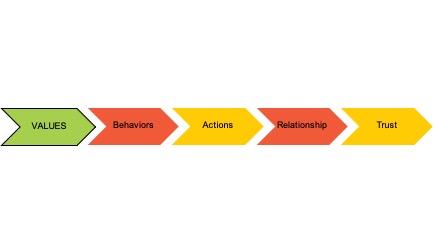
The behaviors and practices you use to live your values directly impact the actions you take in the workplace. Your practices define and shape how you live your reality. They provide you with options and choices for how you act in various contexts – at work, in community, with family or friends, in school, or in social situations. They also provide you with a means to manifest or extend your worldview into the realities of the world in which you live, work and socialize. If your behaviors and practices are not congruent with your stated worldview, it will be evident to those around you. When you practice something different from what you espouse, it calls into question the validity of your stated worldview, your authenticity and your integrity.
Knowing what your hopes and dreams are and desiring to get there does not necessarily mean you know how. As humans, we generally strive to act in meaningful ways and take actions to transform the world in ways that connect to our purpose. Your worldview not only includes your history and values system, but it also offers you thoughts and reflections on how to organize your actions to influence your life and perhaps the lives of others you interact with in the grand scheme of things, as a human in the world. The practices you build, intentionally or habitually, bring life to your worldview and all that is important to you. In this chapter, we discuss various practices that demonstrate this idea.

Exercise – Identifying Issues, Challenges or Historical Organizational Patterns

Course Manual 8: Baselines and Benchmarks
The benefits of a Strategic Workplace Culture are evident, well researched and publicly written about; but how do we know for sure, especially as creating such a culture requires the investment of time and resources? Peter Drucker famously said, “What gets measured, gets managed.” The basic tenet is, if you’re measuring something then the probability of acting on the information you have is a lot higher. Having said that, it is important to remember that the best measurement is a combination of both quantitative and qualitative data.
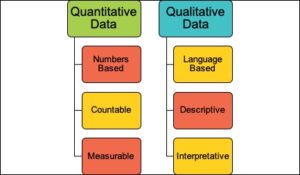
Quantitative data is numbers-based, countable, or measurable. Quantitative data tells us how many, how much, or how often in calculations. Qualitative data is interpretation-based, descriptive, and relating to language. Qualitative data can help us to understand why, how, or what happened behind the numbers or certain behaviors. To have a comprehensive understanding of success, both play a role.
Tracking Return on Investment (ROI) will justify the investment in this Program. Measuring the effectiveness of a Strategic Workplace Culture is critical for continuous improvement and accountability. Measurements provide tangible insights into the alignment between organizational values and actual behaviors, as well as the impact of Workplace Culture on key performance indicators (KPIs). They enable organizational leaders to identify areas for growth and prioritize initiatives that enhance culture and drive results. This will guide the goals and actions for your Strategic Workplace Culture Initiative.
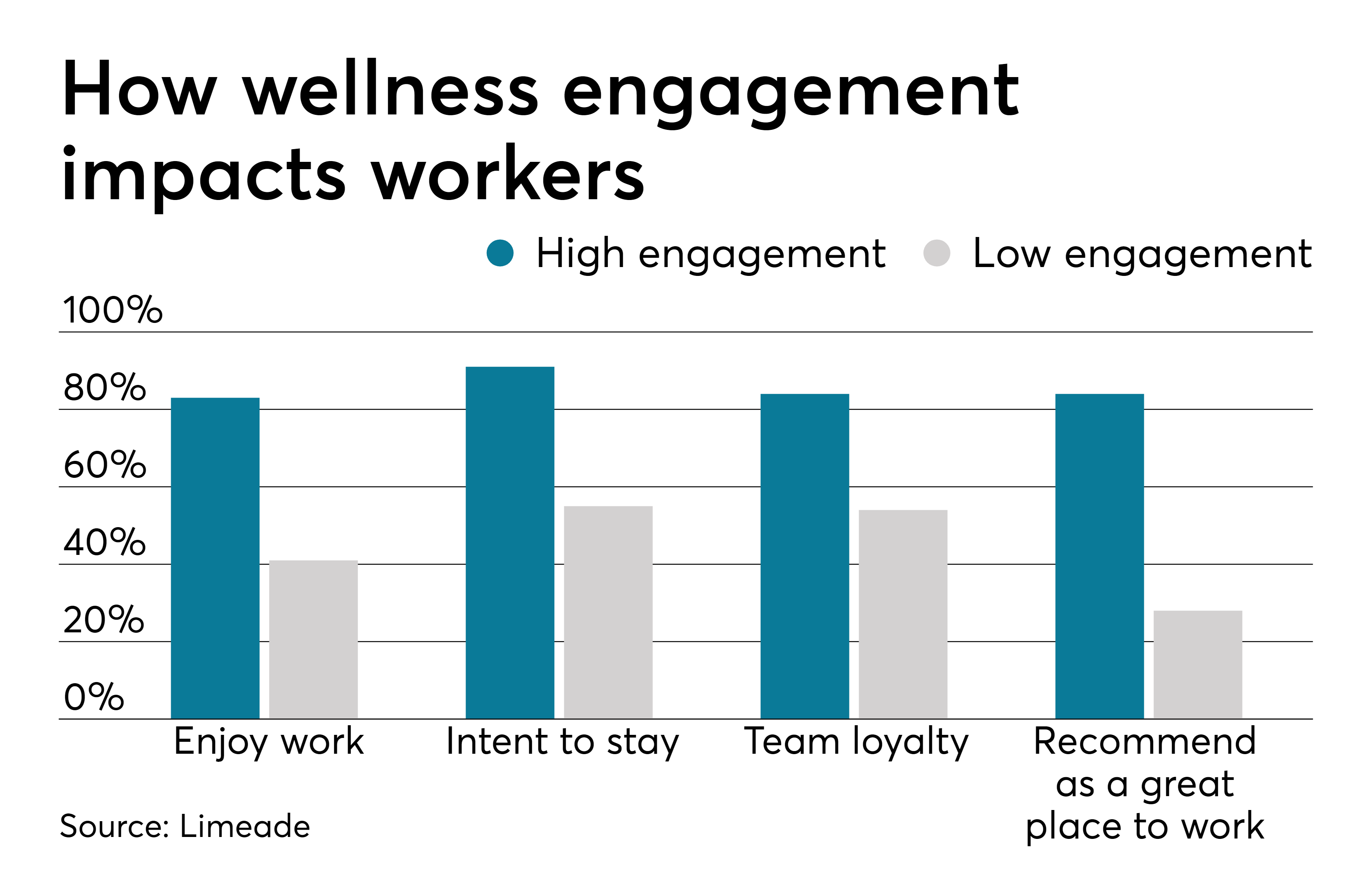
To begin this work, it is important to understand the challenges, barriers and costs inherent in unhealthy workplace cultures and to explore how they are Changeable Conditions. Achievable Outcomes requires identifying the benefits, structures and processes that contribute to a Strategic Workplace Culture and incorporating them into a Vision for this Initiative, which is to be drafted before the end of this Workshop, in Section 10. This Vision will be a guide for decision-making, strategies and actions.
This section describes examples of various forms of data that could be tracked, including the Strategic Workplace Culture Assessment, and invites reflection and decision on what other data points will be relevant to your Initiative.
This Workplace Culture, Relational Leadership, Worldview Intelligence graphic identifies Changeable Conditions and Achievable Outcomes for participants to discuss and consider how they will inform their Strategic Workplace Culture Initiative, and identify what elements to incorporate into their Vision.
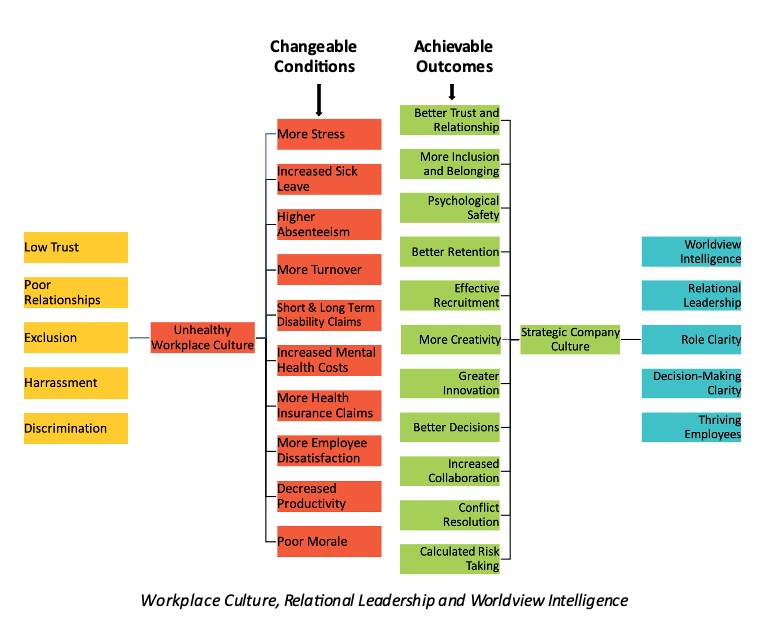
Screenshot
Measurement Options for Workplace Culture
There are various measurements and forms of assessment that can be established to track the progress, achievements and results of your Strategic Workplace Culture Initiative. During this section, you will begin to identify the areas of focus that you believe will offer the most relevant data for your Initiative. The Strategic Workplace Culture Assessment created for this Program is designed to track overall organizational culture indicators. There are also specific different assessments that could be done, if there are areas that participants or leaders in the organization would prefer to have dedicated data on.
The Cost of Stress
High levels of stress in an organization can contribute to a host of conditions like absenteeism, turnover and higher usage of healthcare benefits. A 2022 study conducted by Mental Health America (formerly the National Mental Health Association) suggests that costs associated with stress ranged from U.S. $221 million to upward of U.S. $187 billion for US employers and the American Institute of Stress found that after including factors such as absenteeism, turnover, diminished productivity, increased medical costs, and increased legal costs, the total economic impact of stress to US employers was estimated to be between $300 to $500 billion annually, once you include lost productivity.
Examples of questionnaires that measure symptoms of work-related stress include: the General Health Questionnaire, the Occupational Stress Indicator and the General Wellbeing Questionnaire.
Absenteeism
Absenteeism is a failure to report to work for any reason. It is usually a habitual pattern of unplanned absences from a duty or obligation without good reason. It is often viewed as an indicator of poor individual performance, as well as a breach of an implicit contract between employee and employer. High levels of absenteeism can be an indicator of an unhealthy or toxic workplace culture.
According to CCH, formerly Commerce Clearing House, a provider of software and information services for tax, accounting and audit workers, the average cost of absenteeism in a large company is more than $3.6 million/year. Insurance data indicates claims for stress related industrial accidents cost nearly twice as much as non-stress related industrial accidents.
Employee Turnover
Employee turnover refers to the total number of workers who leave a company over a certain time period. It includes those who exit voluntarily as well as employees who are fired or laid off, otherwise known as involuntary turnover. Turnover, especially the voluntary variety, impacts a company’s ability to achieve business objectives, impacts organizational memory and is a key concern for executives.
The reasons people leave vary, and companies can’t always stem the tide. In this era, a high degree of turnover can be attributed to baby boomers retiring from the workforce. Additionally, as mentioned earlier in this Workshop, workers have more choice about where they can work and they are acting on it. They are looking for workplaces that offer greater flexibility, where they feel valued and that their contribution matters, where they can see how their efforts contribute to the organization’s mission, and they find the work meaningful.
Some industries will say that high turnover is a cost of doing business to justify not attending to it or to absolve themselves from creating a Workplace Culture where people want to stay. Researching actual costs indicates that replacing an average employee amounts to 120-200% of the salary of the position affected, which is a cost it might not be wise to ignore.
Recruitment
According to data collected by SHRM (Society for Human Resources Management), many employers estimate the cost to recruit new employees can be 3 to 4 times the employee’s salary, of which 30-40% are hard costs and the rest are soft costs. Soft costs include the time that organizational leaders invest in supporting the hiring process and a need for onboarding. There is also an impact on productivity and the disruption to teams and departments as new people learn into their roles and adapt to the new organization and its culture.
Sick Leave
Employees working in unhealthy or stressful work environments take more sick leave than those in healthy Workplace Cultures. According to a post in Pro Choice Safety Gear, in workplaces where employers support the health and well-being of employees with policies, programs and practices, employees can be up to three times more productive and take up to nine times fewer sick days than in unhealthy work environments.
Mental Health and Depression
Various research studies indicate that depression is the largest single predictor of absenteeism and work-related performance. It is a common side effect of job stress and is associated with nearly 10 annual sick days. For every 47 cents spent on treating depression, another 54 cents is spent indirectly on absenteeism, presenteeism and disability. Incidents of mental health challenges and depression are lower in organizations that have a healthy Workplace Culture.
Cultural Alignment
The Strategic Workplace Culture Program and Initiative is about creating alignment between employees and the vision, goals and outcomes set by leaders, managers and supervisors throughout the organization. This means assessing the extent to which employees embody the core values, and the degree to which this shapes behaviors and actions, not just of employees, but of their perceptions of the company leaders and their direct supervisors. Is there alignment within their teams and throughout the entire organization? This will be obvious by how aligned the messages and actions of leaders, managers and supervisors are. The intent of a Workplace Culture Assessment is to track these perceptions against a vision of the culture.
Employee Engagement
Surveys, feedback mechanisms, and retention rates can gauge the level of employee engagement and satisfaction within the organization. Perhaps your organization already has some form of regular Employee Engagement Survey. If this is the case, you may already have information on trends and patterns that are impacting employee satisfaction and engagement that could be useful for your Initiative. Engaged employees are more likely to contribute positively to the culture and overall performance so being able to increase engagement will improve results.
Diversity and Inclusion Metrics
Tracking diversity metrics such as representation across various demographics and inclusion indices helps assess the organization’s commitment to diversity and equity. It also provides insights into the effectiveness of diversity initiatives and identifies areas for improvement.
DEI metrics are a way to quantifiably measure and track diversity, equity, and inclusion. They create the ability to set concrete DEI goals, track progress towards those initiatives, identify areas of improvement, and create a definition of success. In addition to job satisfaction and engagement, DEI metrics can include looking at the diversity of the hiring pool and hiring panel, tracking how representative the workforce is of the communities the company serves, looking at retention of diverse employees and advancement rates and participation in Employee Resource Groups (ERGs).
Innovation and Collaboration
Metrics related to idea generation, cross-functional collaboration, and implementation of innovative solutions can indicate the organization’s capacity for innovation and its ability to leverage diverse perspectives effectively. These metrics look at how well teams work together and how well they generate new ideas. Team assessments, meeting assessments or evaluations can be done to track this and to open conversations that are helpful to teams in discussing their dynamics and their satisfaction with how their teams are functioning.
In Workshop 4: 1 + 1 = 3, a High-Performance Teams model is introduced which shows the intersections between work (actions, tasks or goals), learning or co-learning and relationship. An assessment is provided that the participants in this program can use to assess their own dynamics and performance and can take out into the organization to offer to other teams.
Organizational Performance
Key performance indicators (KPIs) are quantifiable measures of performance over time for specific objectives. Examples of these objectives include productivity, profitability, customer satisfaction, and employee turnover rates. These measures can reflect the overall impact of Workplace Culture on organizational success.
KPIs are usually linked to the Strategic Goals of the organization, detailed in a Strategic Plan, and can be tracked, overall and through departmental performance as well. Analyzing these metrics in conjunction with cultural initiatives helps assess the ROI of culture-building efforts.

Case Study 1 – Financial Results Correlated with Diversity
There is an abundance of research available that shows that more equitable environments have a better financial ROI. One example is from a 2015 McKinsey report, Diversity Matters. In this study, the financial results of companies in the UK, US, Canada and Latin America were correlated with diversity, particularly looking at the composition of leadership teams and boards.
The findings were clear. Companies in the top quartile for racial and ethnic diversity were 35 percent more likely to have financial returns above their respective national industry medians. Those in the top quartile for gender diversity were 15 percent more likely to have financial returns above their respective national industry medians. The unequal performance of companies in the same industry and the same country implies that diversity is a competitive differentiator shifting market share toward more diverse companies and diversity is one element of a Strategic Workplace Culture.

Case Study 2 – Benefits in Creating a Strategic Workplace Culture
A technology company operating in the competitive tech industry, specializing in software development and IT services faced growing challenges including increasing employee turnover, declining productivity, and increasing healthcare costs. After some consideration and much discussion, the company recognized the need to prioritize employee well-being to create a healthy Workplace Culture. A senior level team researched various options and decided to focus on the strategies listed below.
Transparent Communication. Senior Leadership began to encourage frequent, open and transparent communications. Regular feedback sessions, engagement strategies, and anonymous suggestion boxes were implemented to give employees a voice in the organization. Responses to the feedback were also clearly communicated, whether they could be acted upon or not.
Investment in Employee Learning and Development. Training and development programs were offered to all employees, commiserate with their positions, their roles and their articulated career path, to enhance knowledge, skills and growth. This included mentorship programs, skill-building workshops, and tuition reimbursement for further education.
Health and Wellness Initiatives. The company examined its benefits programs and decided to improve what was offered, providing comprehensive health benefits, including access to mental health resources, gym memberships, and healthy snack options in the workplace.
Work-Life Balance. Company leadership responded to the changes in the environment by introducing flexible work hours, remote work options, and initiatives to promote work-life balance, such as wellness programs and stress management workshops.
The Results
This dedication over the long term to creating and sustaining a healthy Workplace Culture paid off in several ways. There was increased Employee Engagement and Productivity. Through regular feedback mechanisms, employees reported higher levels of job satisfaction, engagement, and motivation. This translated into increased productivity, as evidenced by higher project completion rates and improved quality of work.
Turnover and recruitment costs went down. The company experienced a significant decrease in employee turnover rates. Retaining talented employees reduced the need for frequent recruitment efforts, resulting in cost savings associated with hiring and training new staff.
The company experienced improved talent acquisition and gained a reputation for being a good company to work for, becoming known as an employer of choice within the industry. Positive word-of-mouth stories from satisfied employees attracted top talent, reducing recruitment expenses and enhancing the company’s reputation in the market.
Healthcare costs were lowered as a result of their focus on employee wellness, decreasing healthcare-related expenses. Fewer sick days were taken by employees, coupled with proactive wellness initiatives, resulting in lower healthcare utilization and costs.
Individuals, teams and departments reported enhanced innovation and creativity, leading to the development of new products and services, strengthening the company’s competitive edge in the market.
By prioritizing employee well-being, fostering a healthy workplace culture, and investing in initiatives that promote engagement and productivity, the company achieved tangible benefits in terms of reduced turnover, lower recruitment costs, improved talent acquisition, and enhanced innovation. These outcomes demonstrate that a healthy workplace culture is not only beneficial for employees’ well-being but also contributes positively to the company’s bottom line and reputation.

Exercise: Identify Data to Track in this Initiative

Course Manual 9: Commitment Pledge
To be successful and achieve the expected results, the Strategic Workplace Culture Program and Initiative requires dedicated and consistent effort and energy over an extended period of time. To ensure the outcomes for this program are achieved each member of this Team is asked to review, discuss, adapt and sign a Commitment Pledge. In essence, this is a contract you make with yourself and with the Team. A Commitment Pledge can be a game-changer, serving as a foundation for creating a healthy team dynamic and ensuring alignment with the Initiative’s goals, fostering accountability and trust.
Its purpose is somewhat similar to a Project Charter, which is a document that outlines a project’s scope, objectives, resources and more. Like a Project Charter a Commitment Pledge is typically created at the beginning of an Initiative and serves as a roadmap for the Team to follow. It clearly identifies the name of the initiative and includes a description of the reason why the Team is embarking on the Strategic Workplace Culture Initiative as well as how it will benefit the organization. It is intended to provide clarity on the work and role of the Team that each member is committing to. It can be in addition to a Project Charter, inviting each person to give careful consideration to their own commitment over the arc of the Initiative.
Additionally, the Team is being asked to identify others in the organization who have an influence over the success of this Initiative, to ask for their support, sponsorship and championship throughout this year-long+ program.
Establishing a dedicated commitment to success, especially with support from other organizational or team leaders, involves several key steps, which are outlined in this section.
What a Commitment Pledge Offers
A Commitment Pledge holds significant value in several aspects of organizational and project management. In concert with the vision statement you will be creating, it helps clarify goals and objectives, establishes expectations, assists you in leading by example, enhances or builds trust and relationship, sets a healthy tone as the Initiative is launched, promotes individual and team accountabilities and responsibilities, supports collaboration, acknowledges contributions and celebrate achievements.
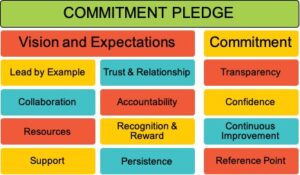
Communicates Vision and Expectations
A Vision for this Initiative will be drafted by participants and shared with all who will be involved in creating a Strategic Workplace Culture. The Commitment Pledge can help identify expectations for and of the Team leading this work and for others whose support is essential to success. Additionally, it promotes open communication and transparency related to the project, its objectives, progress, and potential impact.
Transparent communication contributes to building trust and reduces skepticism or resistance based on misinformation or lack of information. Challenges and resistance can arise when people feel that information is being withheld. In the absence of information, as we understand from neuroscience and behavioral science, our brains have us filling in gaps with reference points from our own experiences. This is often inaccurate and out of context. The Commitment Pledge encourages feedback and collaboration among team members and with other stakeholders. It sets expectations that reduce ambiguity, serve to prevent misunderstandings, and ensures consistent adherence to project requirements, timelines, and quality standards.
Clarifies Goals and Objectives
A Commitment Pledge contributes to clarifying the purpose and goals of the Strategic Workplace Culture Initiative, ensuring all participants have a shared understanding of the rationale behind this Initiative. This clarity reduces uncertainty and any possible resistance stemming from a lack of understanding about the project’s objectives. Within the document, values such as teamwork, collaboration, innovation, continuous improvement and whatever else is relevant to the Initiative can be emphasized. By aligning the project with these values, anyone impacted is more likely to see the change as beneficial and in line with the organization’s core principles.
Leads by Example
When team members, organizational leaders and key stakeholders sign and uphold the Commitment Pledge, they set a strong example and demonstrate their commitment to the project. Visible leadership commitment inspires trust, confidence, and loyalty among team members and others in the company, leading to greater dedication, effort, and collaboration. This leadership support inspires confidence and trust, reducing resistance among others in the organization.
Builds Relationship and Trust
The shared commitment outlined in the pledge fosters a sense of unity and cohesion among team members, promoting collaboration, communication, and mutual support throughout the project lifecycle. Signing the pledge builds trust among employees, as it demonstrates a commitment to transparency, fairness, and mutual respect.
Sets a Constructive and Confident Tone
The act of committing to a Strategic Workplace Culture Initiative through a pledge sets a constructive and confident tone for the work and the Team implementing it. This reinforces the importance of healthy workplace values such as respect, inclusion, continuous learning, and support, contributing to a positive, inspiring and motivating team culture that drives project success.
Provides Support and Resources
The Commitment Pledge can include commitments to providing support, resources, training, and guidance to participants as they navigate the change process. Clear assurances of support alleviate concerns and resistance stemming from fears or concerns about inadequate resources or preparation.
Promotes Accountability
The pledge promotes accountability among participants, as they commit to upholding the values and behaviors essential for building and sustaining a healthy Workplace Culture. By signing the pledge, team members hold themselves accountable for their contributions, deadlines, and overall performance. Participants take ownership of their own role in shaping the Workplace Culture, recognizing their responsibility in contributing to a supportive, inclusive, and high-performing environment. Increased accountability leads to higher-quality work, improved task completion rates, and better overall Initiative performance.
Encourages Collaboration and Teamwork
The pledge encourages collaboration and teamwork, as participants work together to identify and implement strategies, initiatives, and practices that align with the desired culture. It can serve as a motivational tool, inspiring participants to actively engage, contribute, and champion the Strategic Workplace Culture Initiative. It encourages participation by inviting input and involvement from all members of the team and from stakeholders. This inclusive approach reduces resistance by giving individuals a voice in the change process and demonstrating that their voice and input matters, is valued and respected.
Recognizes and Rewards Achievement
Acknowledging commitments made through the pledge can motivate the Team and reinforce healthy behaviors. The ability to recognize contributions and milestones achieved creates a sense of progress and momentum, overcoming resistance that might be rooted in skepticism or pessimism. Recognition boosts morale, motivation, and job satisfaction, reinforcing desired behaviors and contributing to a culture of appreciation, collaboration, and success. This positive reinforcement supports desired behaviors and motivates others to emulate them.
Seeks Feedback and Continuous Improvement
The Commitment Pledge can include commitments to gathering feedback, listening to concerns, and adapting strategies based on input from participants. This iterative approach promotes flexibility and responsiveness, and allows for addressing valid concerns, adjusting course as needed. It establishes a feedback loop for continuous improvement and refinement of workplace practices based on employee input.
Encourages Commitment and Persistence
Knowing that everyone on the Team is committed to the project’s success can boost motivation and morale, leading to increased productivity, creativity, and overall performance. It creates a sense of unity and shared responsibility towards fostering a healthy and inclusive environment. The pledge serves as a long-term commitment to sustaining efforts aimed at re-patterning workplace practices and structures.
Provides a Reference Point
The pledge serves as a reference point throughout the project, reminding team members of their commitments and guiding their actions and decisions to stay aligned with project objectives. It helps track progress, monitor adherence to commitments, address deviations, and provide feedback, ensuring alignment with project goals and driving continuous improvement.
Overall, the value of a Strategic Workplace Culture Initiative Commitment Pledge lies in its ability to align goals, promote accountability, enhance communication and collaboration, foster a healthy Workplace Culture, demonstrate leadership commitment, drive continuous improvement, set clear expectations and standards, facilitate recognition and celebration, and provide documentation and reference points for project management and success.

Case Study – A Senior Leadership Team’s Commitment to Changing Their Organizational Culture
The Senior Leadership Team of a Regulatory Association in Canada identified a number of communication, trust and relationship challenges in their organization, beginning at the top with the CEO. The Team committed to identifying the challenges and owning their role, individually and collectively in the interpersonal dynamics that were impacting performance, morale, relationships with other stakeholders and slowing down the accomplishment of goals and objectives.
In the process of clarifying what would be different if the issues were identified and addressed, “hidden dynamics” were illuminated concerning the contribution of this Executive Team to what was going on. The organization was small enough that various relationships existed between different members of this Team and employees in different departments. This included workplace friendships among people who had worked there for decades and employees dropping by a Director’s office for a chat. These “chats” were often focused on complaining about someone else, which could include another Director.
It was brought to the Senior Leadership Team that this pattern of behavior is called triangulation. Triangulation happens when one or both of the people involved in a disagreement or conflict try to pull a third person into the dynamic, often with the goal of deflecting some of the tension, creating another conflict to take the spotlight off the original issue, or reinforcing their sense of rightness or superiority. This kind of discussion – or gossip – does nothing to resolve the original conflict.
When this behavior pattern was illuminated and the Directors could see their role and contribution to it, they made a pledge to change that behavior. After a discussion to discern what the difference was between triangulation and offering support to someone asking for it, the Directors identified the shift in their behavior that could be made. First, they refused to be drawn into the drama being described. They would tell the employee to bring it up with the person they had the disagreement with, if in fact, it was worthy of such a discussion. They could offer some suggestions on how the employee could bring it up with the person directly. They no longer engaged in the gossip pattern, no longer undermining other Directors or reinforcing the employee’s perception that they were “in the right”.
In this case, the commitment to this Pledge was not discussed with the entire staff. Despite this, the Senior Leaders commitment to this changed behavior noticeably changed the organizational culture for the better. One employee made a comment that it was no longer “fun” because he was not given the opportunity to gossip, which was a form of “knowledge is power”. Trust and relationship throughout the organization increased and was sustained over time due to the Leadership Team’s commitment and dedicated effort.
Why Should I Sign a Pledge
Signing a Commitment Pledge to help create and implement a Strategic Workplace Culture Initiative is a significant indicator of your intended dedication to achieving results. Signing can bring several benefits both to you as an individual, to the team and to the organization as a whole.

Demonstrates Personal Commitment
By signing the pledge, you demonstrate your personal commitment and dedication to contributing positively to the workplace culture. This sends a powerful message to your colleagues and leadership about your seriousness and sincerity regarding workplace cultural improvement. It reflects your values and ethics as an employee, showcasing your willingness to contribute constructively to the work environment.
Leading by Example
Signing the pledge indicates your willingness to lead by example, showing others within the organization the importance of actively participating in culture-building efforts. Your commitment could inspire and motivate others to join in and contribute their efforts towards a healthy culture.
Aligns with Organizational Goals
The pledge aligns with the organization’s overall goals and strategic vision for culture improvement. By signing it, you align yourself with these broader objectives, ensuring that your actions and behaviors support the organization’s cultural aspirations.
Encourages Accountability
By signing the pledge, you are indicating you are willing to be held accountable for your actions and behaviors in relation to the Strategic Workplace Culture Initiative. It reinforces the importance of upholding the values and standards set forth in the pledge, promoting consistency and integrity in your conduct. This, in turn, inspires trust and confidence.
Promotes Collaboration
Signing the pledge signifies your openness to collaborate with your colleagues on this team, from different departments, and across all relevant levels of the organization, to achieve cultural goals. It encourages cross-functional cooperation and synergy in culture-building efforts.
Communicates Values and Expectations
The commitments outlined in the pledge communicate your values, expectations, and standards for workplace behavior and interactions. This clarity helps set a constructive tone and reinforces desired cultural norms.
Drives Continuous Improvement
The pledge serves as a catalyst for continuous improvement in your Workplace Culture. By committing to ongoing learning, feedback, and adaptation, including your own, you contribute to a culture of growth, innovation, and positive change.
Enhances Employee Engagement
Your commitment to the Strategic Workplace Culture Initiative contributes to creating a healthy and supportive work environment. This can lead to increased employee morale, motivation, and job satisfaction, ultimately benefiting individual well-being and organizational performance. By signing the Commitment Pledge and actively contributing to culture-building initiatives, you play a part in driving employee engagement and organizational success and performance.
Gaining Recognition and Influence
Your active involvement in culture-building efforts, as demonstrated by signing the pledge, can lead to recognition and increased influence within your organization. It can showcase your dedication to organizational values and your ability to drive positive change.
Creates a Positive Impact
Ultimately, signing the Commitment Pledge allows you to make a positive impact on the workplace environment, fostering a culture of respect, collaboration, inclusivity, and performance excellence that benefits everyone in the organization.
Signing a Commitment Pledge for a Strategic Workplace Culture Initiative is a proactive and meaningful step that demonstrates your commitment, aligns with organizational goals, encourages positive behaviors, fosters collaboration, and contributes to a thriving work environment.

Exercise: Commitment Pledge Discussion and Draft

A Strategic Vision for Workplace Culture serves as a roadmap that guides organizational leaders in aligning the company’s values, goals, and practices with the overarching mission. It provides a foundational framework that shapes identity, values, and practices across the organization. A clear vision helps leaders and employees navigate challenges that arise, make informed decisions along the way, and stay focused on long-term objectives. By defining where the company is headed, what it aims to achieve, and how it plans to get there, a strategic vision creates a sense of purpose and alignment across the organization. Yogi Berra once famously said, “If you don’t know where you are going, any road will take you there.” Creating a Vision for a Strategic Workplace Culture Initiative can start with asking the question: what will be different once the Initiative is implemented? Describing the future vision provides direction for each phase, contributes to identifying the gaps to be addressed and points to strategies to accomplish this. Discussion ensures that the Initiative is tailored to the specifics of your organization. It can take time to write a draft that participants all agree to and agree to take to others between this Workshop and the next for input. A well-crafted Vision ensures alignment with the company’s broader business objectives can be created. This alignment translates into improved teamwork, enhanced collaboration, and a collective drive towards achieving shared objectives. Clearly defining the skills, capabilities, and talent requirements needed to achieve strategic goals means company leaders and managers can proactively develop and deploy their workforce. This alignment enables executives, department heads, managers and team leaders to prioritize talent development, recruitment efforts, and succession planning in a way that directly contributes to driving business results. A well-aligned workplace is better equipped to tackle challenges, seize opportunities, and adapt to changing market conditions, enhancing the company’s overall competitiveness and sustainability. A compelling Vision, communicated consistently and transparently, inspires and motivates employees at all levels of the organization. It instills a sense of optimism, purpose, and enthusiasm by painting a vivid picture of the company’s future success and impact as the culture becomes more strategic, engaging, creative, innovative and inclusive. It invites company leaders to articulate their brand, values, and unique selling propositions to potential candidates, helping them stand out as employers of choice. Moreover, a focus on talent retention strategies such as professional development, recognition programs, and work-life balance initiatives encourages employee loyalty, reducing turnover rates and saving costs associated with recruitment and training. A Vision that encompasses a commitment to create a more inclusive and equitable workplace also benefits from diverse perspectives, ideas, and experiences. A diverse workforce fosters creativity, innovation, and problem-solving capabilities, driving business growth and market responsiveness. The importance of skills development and adaptability in a rapidly evolving business landscape can be emphasized in a Strategic Workplace Culture Vision. Companies that invest in continuous learning, upskilling and reskilling programs empower their employees to stay relevant and competitive. A focus on skills development enhances individual performance and strengthens the company’s overall capabilities and agility. A workplace that is adaptable, versatile, and equipped with diverse skill sets is better prepared to navigate industry disruptions, embrace technological advancements, and innovate to meet changing customer needs. Companies with a well-defined Vision for a Strategic Workplace Culture are better positioned to cultivate innovation and adaptability. A culture that encourages creativity, risk-taking, and continuous learning creates an environment where employees are empowered to explore new ideas, challenge the status quo, and adapt to changing market dynamics. This culture of innovation is central to staying competitive, driving growth, and meeting evolving customer needs. By creating and sustaining a culture that values innovation, companies can unlock new opportunities, drive product/service improvements, and stay ahead of the curve. A well-articulated Strategic Workplace Culture Vision builds confidence and trust among stakeholders, including employees, customers, investors, and business partners. Workplace Culture directly impacts the customer experience and brand reputation. When employees are aligned with the organization’s values and are passionate about delivering exceptional service, it translates into a positive experience for stakeholders. A Workplace Culture that prioritizes customer satisfaction and loyalty helps organizations build a positive brand reputation and differentiate themselves in the market. Stakeholders are more likely to trust and engage with organizations that have a strong and values-driven culture. A foundation for effective leadership and organizational resilience can be established with this Vision. Leaders who embody the company’s culture, lead by example, and communicate transparently, inspire trust, promote employee engagement, and drive performance. A resilient organizational culture enables companies to navigate challenges, adapt to disruptions, and capitalize on opportunities. By investing in a Strategic Workplace Culture, leaders build agile, responsive, and future-ready organizations capable of sustaining long-term success. A Strategic Workplace Culture Initiative with a compelling Vision is a fundamental driver of organizational success and competitive advantage. It aligns talent strategies with business objectives, attracts and retains top talent, fosters skills development and adaptability, promotes diversity, equity, and inclusion, and enables effective leadership development and succession planning. Companies that embrace a strategic approach to Workplace Culture are better positioned to thrive in a dynamic and ever-changing business environment, driving innovation, growth, and long-term value creation. A Vision is a forward-looking statement that details the desired future state of an organization. It serves as a guiding framework for decision-making, goal-setting, and strategic planning. A Strategic Workplace Culture Vision can include the following components. As a guiding influence for the Strategic Workplace Culture Initiative, this Vision has two components. 1) A vision statement that is clear, concise, and easy to understand, is inspirational and motivational for employees, stakeholders, and customers. 2) A longer description that articulates a compelling picture of the future for the organization’s Workplace Culture and provides details. The focus is on the long-term direction and goals for the workplace, typically spanning three to five years or more. It is enduring. It goes beyond short-term objectives and emphasizes the desired outcomes and impact over time. For the Workplace Culture Vision to be achievable, it needs to be aligned with the organization’s Mission Statement, purpose, core values, and fundamental reason for existence. The Vision expands on the Mission by painting a vivid picture of what a Strategic Workplace Culture looks like in the future. A compelling Vision is aspirational yet considered to be achievable. The aim is to stretch the organization, its leaders and employees throughout the company to aspire for excellence, innovation, and continuous workforce improvement, while remaining realistic and reachable, where people can see the path to the future, even if the path will change over the course of the Initiative. Elements that differentiate the organization from competitors and highlight its unique strengths, capabilities, and value proposition in the market can be included in the description. Forward-looking visions often emphasize innovation, adaptability, and agility as important drivers of success. They encourage a culture of creativity, experimentation, and learning to stay ahead of industry trends and disruptions. A vision may acknowledge the importance of engaging and collaborating with various stakeholders, including employees, customers, partners, investors, and communities, to achieve shared goals and mutual success. While visions are often qualitative and inspirational, they may also include measurable outcomes or key performance indicators (KPIs) that help track progress, assess success, and demonstrate impact over time.
Course Manual 10: Draft Vision
The Importance of having a Vision
What Can a Strategic Workplace Culture Vison Do?

Alignment with Broader Business Objectives
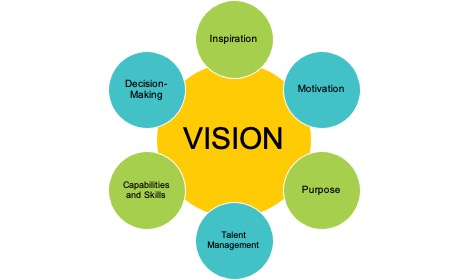
Promoting Skills Development and Adaptability in the Face of Changing Landscapes
Build Confidence and Trust – Internally and Externally
Key Components of a Strategic Workplace Vision

Forward Looking, Long-Term Direction, Guiding Influence
Alignment with Mission
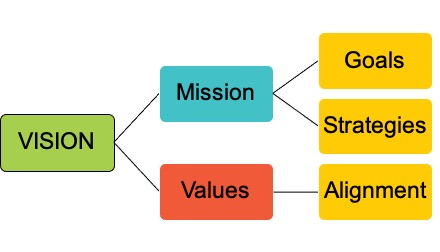

Case Study – An Energy Company’s People and Culture Vision
People and Culture is one of 4 Pillars of this Energy Company’s Strategic Plan and long-term strategy. In their words, their vision, mission and values are embodied by their unique team and a Strategic Workplace Culture is the foundation for their sustainable success and the driving force for growing long-term value for their stakeholders.
For over 140 years, this company has delivered safe, reliable, affordable and environmentally responsible energy to their customers. They employ more than 3000 women and men in communities across their 8 State service territory, to manage operations and serve their customers with the highest level of customer service.
The company is committed to enabling a safe, supportive and inclusive work environment – a workplace culture built on shared values and mutual respect. They believe their unique talents and innovative spirit and diversity anchor their culture of success.
Their commitment to their vision of creating an equitable and diverse workplace has resulted in multi-pronged initiatives related to a Strategic Workplace Culture. The company is ensuring that its employee complement is representative of the communities they serve.
A core element of their Strategic Workplace Culture Vision is focused on diversity to ensure employees from all backgrounds are successful, with a committed approach for groups that are presently underrepresented. By doing so, they will fulfill their Vision of creating a thriving workplace, best able to support their communities, customers and shareholders.
They acknowledge and believe in the transformative power of diversity, inclusion and belonging. They state, “By actively engaging different perspectives, we challenge and stretch our thinking which enriches the experiences of our employees and customers, while adding shareholder value.”
Their vision articulates several strategies including providing Worldview Intelligence training for their 300+ people leaders across the company, creating a Worldview Intelligence for All animated video series available to every employee, supporting Employee Resource Groups (ERGs), providing keynote speakers on the topic of Diversity, Equity and Inclusion and ensuring the senior leadership team has first-hand experience with underrepresented communities, including reverse mentoring.
Worldview Intelligence Leadership Development in Support of Diversity, Equity and Inclusion
Over a period of six months, the company provided all the people leaders in the company with virtual training that offered new, shared language, knowledge and skills and an invitation into conversations about DEI. The people leaders would be using what they learned to engage in planned conversations with their teams and be skilled enough to use the knowledge in unplanned situations as well.
Worldview Intelligence for All
The company leadership wanted to reach all employees across the entire organization with similar messaging. To this end, a series of four animated videos was created with review sheets and simple exercises designed to be done anywhere in a short period of time. Each video was less than 10 minutes long and the video series could also be used with teams to generate conversations about inclusion and belonging.
Employee Resource Groups
The company’s Employee Resource Groups (ERGs) are a vital part of their Strategic Workplace Culture of inclusion and belonging. There are several ERGs based on shared characteristics and interests and each group is employee-led. Their ERGs include:
a resource group for showing care for one another through courageous acts, a women’s resource group, a new connections resource group for new employees, a resource group for racially/ethnically diverse employees, one for military personnel and Veterans, one for current and aspiring data and analytics professionals and one for current and aspiring project management professionals. These ERGs encourage discussions about the challenges faced in the organization and how to work with and address these challenges for the success of all.
Keynote Speakers
The company regularly brings in keynote speakers to bring new perspectives, ideas and innovations to the discussions and actions related to their culture of inclusion and belonging.
Other Related Activities
To ensure that the senior leadership is directly connected to the realities of creating a culture of inclusion and belonging, they partake in other activities. This has included excursions to service organizations supporting underrepresented populations and reverse mentoring where they are invited to learn from someone else about their worldview experiences.
Their culture of transparency and proactive communication builds long-term trust and education about their goals, and demonstrates the prudency of the decisions they are making for our customers.
All of these culture related initiatives flow out of the Vision created to be intentional about the Workplace Culture they imagine possible.

Exercise: Steps to Create a Strategic Workplace Culture Vision

Course Manual 11: Action Steps
This program is about implementing a business process over the course of the year. This is only possible by creating an Action Plan towards the end of each Workshop with clearly identified action steps, assigning responsibility to team members and identifying when each step is to be completed. Most of the action steps are to be completed between this Workshop and the next but there could be some that span a few Workshops. Examples will be provided.
 It has been noted that the Worldview Intelligence CIDA-W Planning Model will be used throughout the Program and this model will be used in this section to help identify action steps and understand what phase they apply to. As mentioned, CIDA-W is an iterative Planning Model so it is important to look at each phase of CIDA-W to see what might apply to this Workshop, recognizing not all phases need to apply to each Workshop. Some Workshops will draw more fully on certain phases. This Workshop is focused more on Clarify and Illuminate, and there is an Act component as well. For ease of reference, the CIDA-W chart is included in this course manual as well.
It has been noted that the Worldview Intelligence CIDA-W Planning Model will be used throughout the Program and this model will be used in this section to help identify action steps and understand what phase they apply to. As mentioned, CIDA-W is an iterative Planning Model so it is important to look at each phase of CIDA-W to see what might apply to this Workshop, recognizing not all phases need to apply to each Workshop. Some Workshops will draw more fully on certain phases. This Workshop is focused more on Clarify and Illuminate, and there is an Act component as well. For ease of reference, the CIDA-W chart is included in this course manual as well.
Throughout this Workshop, several specific actions have already been identified and these should be incorporated into your action steps. Among them is the distribution of the Workplace Culture Assessment, the identification of key performance measures and beginning to collect the data, an exploration of patterns within the organization that might hinder or help this Initiative, identification of key sponsors or champions for the Commitment Pledge and seeking input on the draft Vision for your Strategic Workplace Culture.
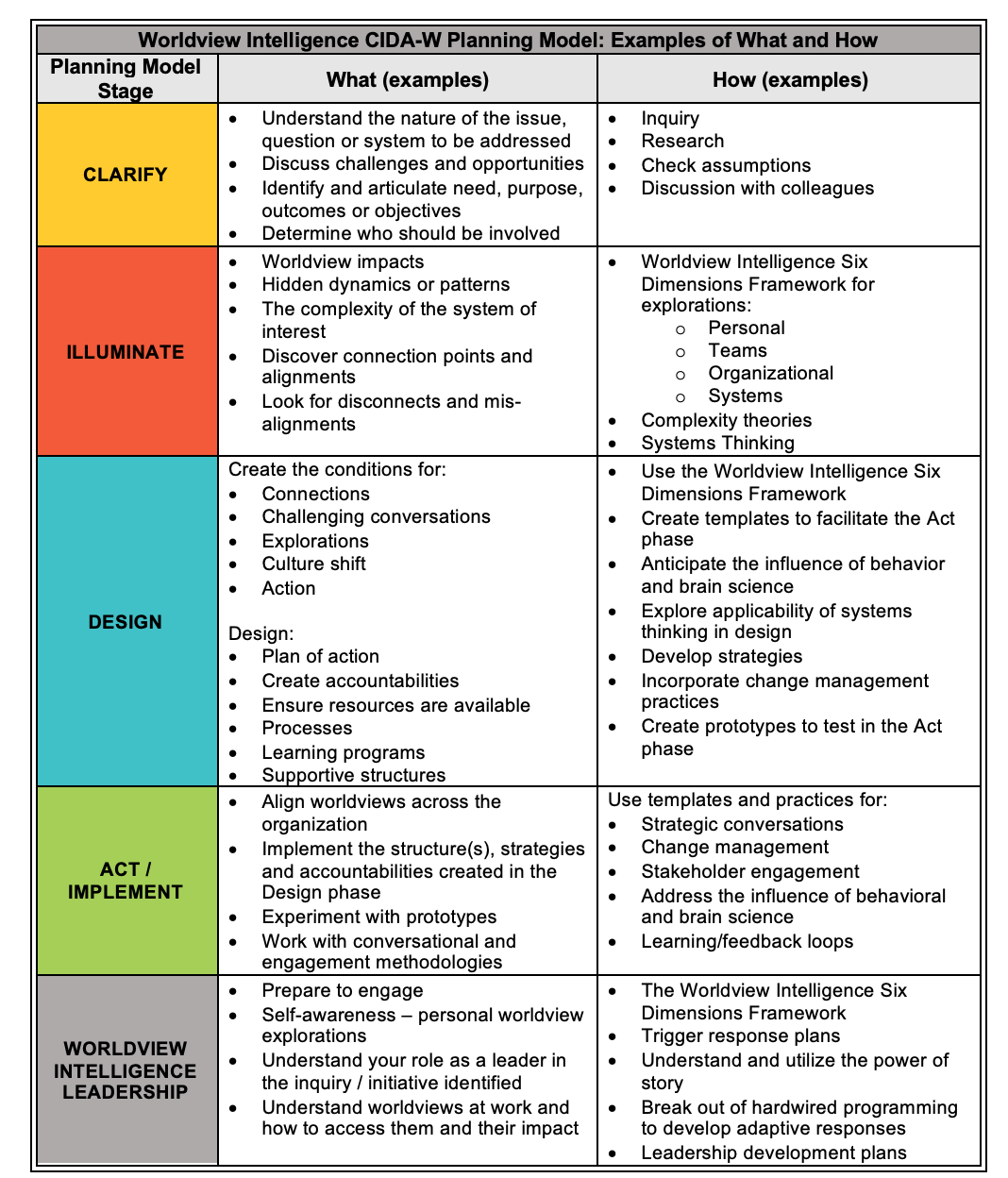
Action Planning
One way to begin Action Planning is to identify the overarching goal or action to be achieved and then break it out into specific steps, again with accountabilities and timelines. As mentioned above, the specific actions identified throughout this Workshop to be addressed before the next Workshop include the distribution of the Workplace Culture Assessment, the identification of key performance measures and beginning to collect the data, an exploration of patterns within the organization that might hinder or help this initiative, identify key sponsors or champions for the Commitment Pledge and seek input on the draft Vision for your Strategic Workplace Culture Initiative.
Ensure you have collective clarity on each of the goals and action steps. Clarify by articulating the need, purpose and the anticipated outcome for each goal. Ask yourselves about your own blindspots and possible road blocks you might encounter (an Illuminate step) and then identify the specific action steps with who is responsible for ensuring they happen and by when.
The timeline for some action steps will definitely be within the period between this Workshop and the next. The distribution of the Workplace Culture Assessment is an example of this. Others might have a final timeline outside of this period but have action steps within this period. An example might be finalizing the Vision for your Strategic Workplace Culture Initiative. It might be identified that a final version will be completed in 3 months due to the necessity of distributing it, asking for feedback, waiting for the feedback, incorporating it into the draft Vision, possibly recirculating it prior to finalizing it. Distribution of it can happen after Workshop 1.
An Accountability Template
An Accountability Template is provided as an example. You can use this, adapt a project management program or create your own. This will be used as an example for each of the Actions required between this Workshop and the next one.
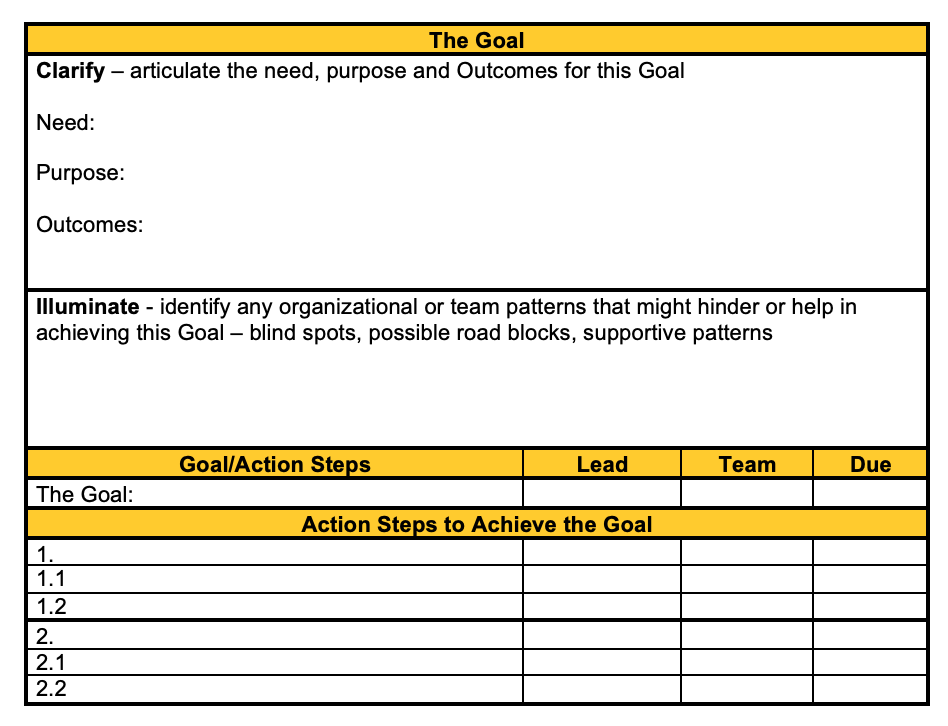
The following templates are filled in with examples of the Goal, Clarify, Illuminate, and Action Steps. They may or may not be relevant to your particular Initiative. Discussion of each of these is needed for the team to have a shared understanding of each of the steps, who is accountable and what will happen on this particular goal between now and the next Workshop.
Workplace Culture Assessment
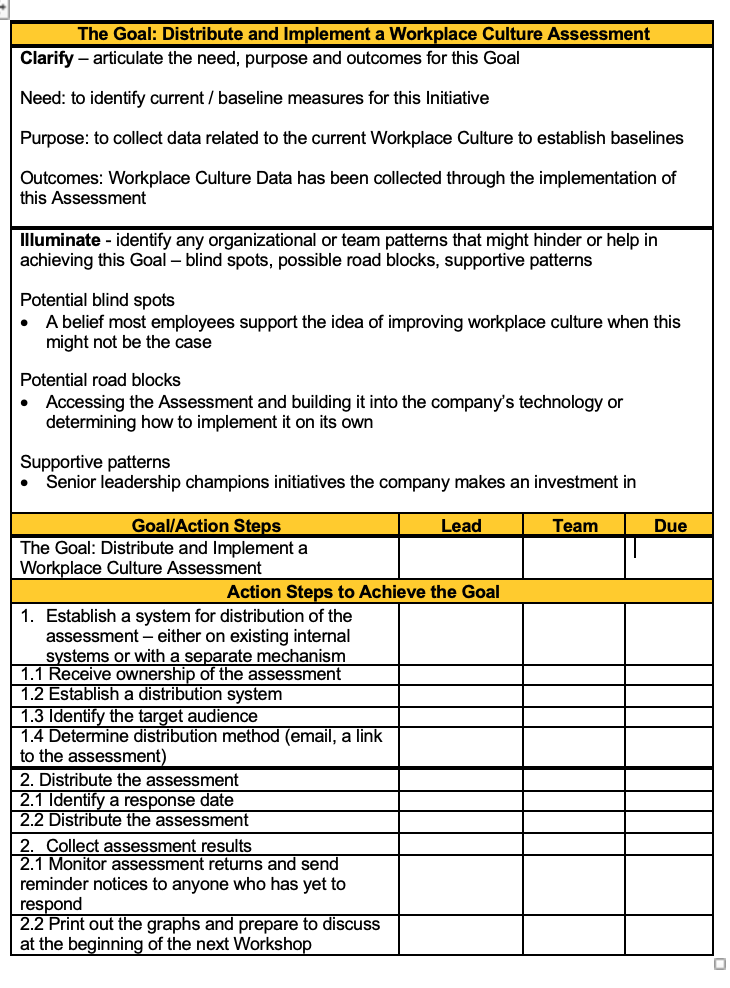
Identification of Key Performance Measures and Data Collection
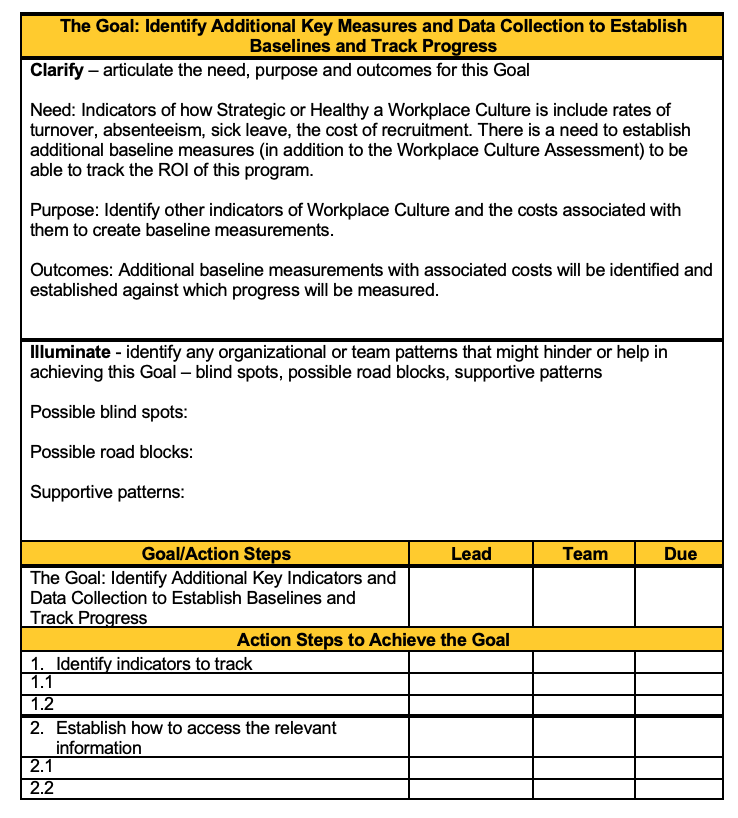
Exploration of Patterns that Might Hinder or Help this Initiative
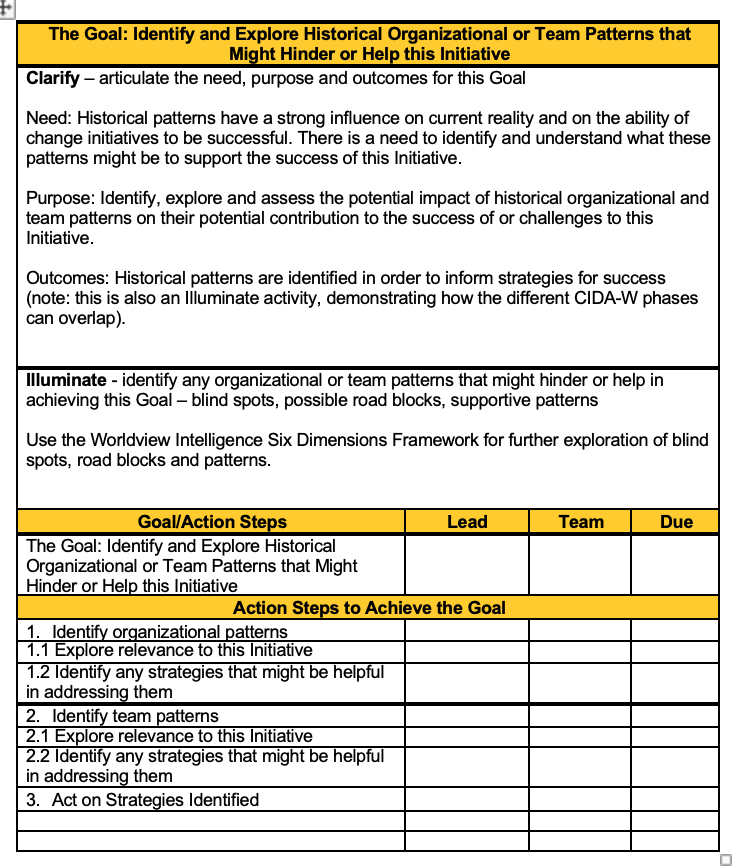
Identify Key Sponsors or Champions for the Commitment Pledge
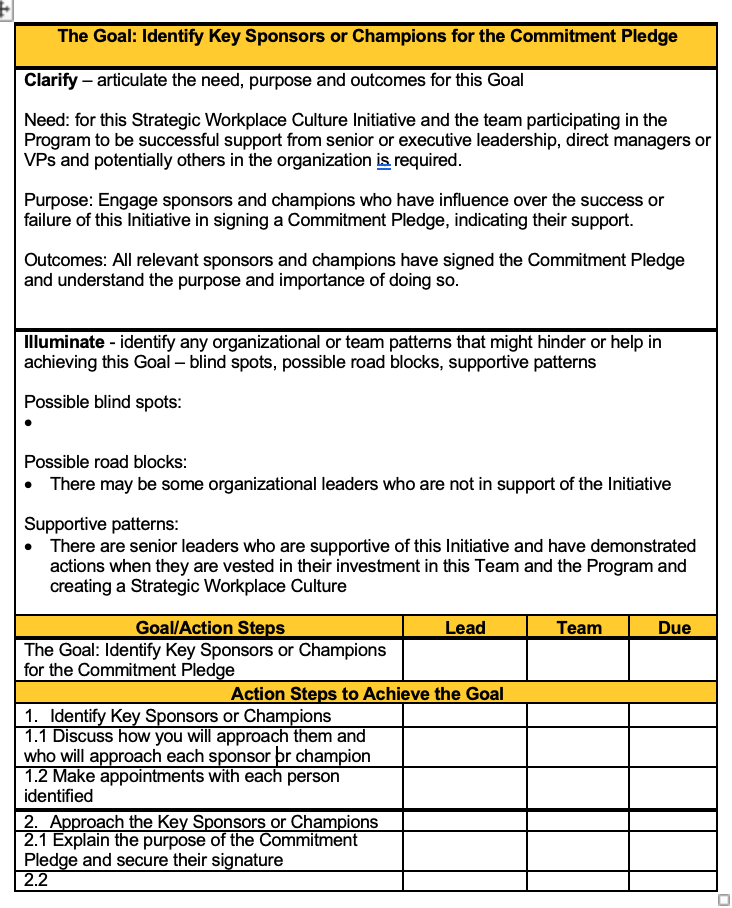
Seek Input on Draft Vision for the Strategic Workplace Culture Initiative
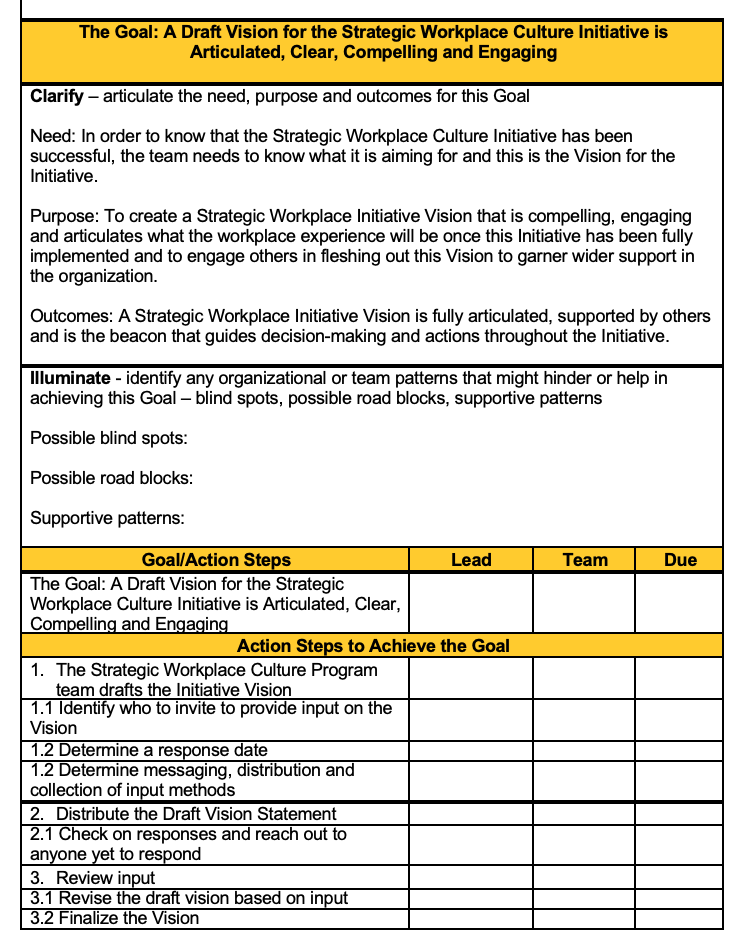
Review and Proceed
These templates have been filled in with suggestions that may or may not be relevant or applicable to your specific Workplace Culture Initiative. They are intended to spark ideas and inspire your own thinking. Of course, feel free to adopt any that are relevant and adapt as is needed for your work.
As mentioned above, you can use these templates or an existing project management software already used or create your own. The important thing is that you have a way of identifying goals, outcomes and action steps and a way to track accountability and progress on each.
Be sure to establish times this team will meet between now and the next Workshop to attend to the action items you have identified.
Have fun, be curious and congratulations on embarking on this journey.
Project Studies
The Strategic Workplace Culture Program is a 12-Workshop Course designed to address unprecedented challenges the modern workplace is experiencing by providing participants with the knowledge and skills to implement culture change in the workplace. Participants are introduced to and use several tools to design and implement a Strategic Workplace Culture Initiative throughout their organization or within teams, departments or divisions.
After each in-person session, participants will engage in study and tasks that grow their experience with the Frameworks, Models and related tools presented. As participants advance their skills and knowledge through research, study and application, they will also be advancing their Strategic Workplace Culture Initiative. By the end of the course participants will have a fully developed strategy for implementing their Strategic Workplace Culture Initiative and will already have begun implementing it.
Each of the Workshops and the related Project Studies offer participants the structures to further deepen what they have learned. Key to the success of the Project Studies will be journaling of the learning and the impact the learning has on them individually, their workplace team or colleagues and the organization. These reflections can be short, a few hundred words, or as lengthy as the participants wish. Journaling will make explicit the learning and actions needed to implement the Initiative.
Participants are recommended to use the journaling guide offered here. They can journal after each Workshop separately or combine new journaling with previous writing. They can also create a handwritten journal or an electronic record. In either case, participants build a comprehensive overview of the learning, work and accomplishments during the course and have a record for review.
It is recommended that the course Team meet prior to each in-person Workshop session to compare journal entries to further their shared understanding of the learning, the impacts of their decisions, strategies and actions and how this advances the Strategic Workplace Culture Initiative.
Workshop 1 provides foundational learning and understanding for participants to begin building their Vision of a Strategic Workplace Culture for their business or organization. It creates a shared language amongst participants for the work ahead. It provides them with baseline cultural and performative assessments of the organization with which to plan their Initiative and measure progress towards achieving their Strategic Workplace Culture Vision.
Project Studies – Workshop 1 – Foundational Knowledge for Outlining a Plan of Action
1. Research any existing organizational goals, visons or structures that are shaping or influencing current workplace culture. Outline preliminary thoughts regarding goals and vision for a Strategic Workplace Culture and compare the two. Identify preliminary actions to design, implement and sustain the new culture.
2. Look for examples where a change in terminology that you use could shift Workplace Culture and reflect on strategies for implementing a language change.
3. Review the sections in the manual on worldviews and worldview awareness. Journal what is impactful for you personally now and how this basic understanding of worldviews is creating a window into the worldviews of workplace colleagues or the organization.
4. Conduct a self-assessment to identify what your starting points are upon entering into differing types of conversations, with a focus on how you approach trust.
5. Visit Home – Behavioral Scientist and explore four articles about human behavior. Share which articles you have explored and what you have learned that applies to this Initiative.
6. Review your preliminary thoughts for the Strategic Workplace Culture Vision from Step 1 above or from conversations during the Workshop and reflect on what might need further Clarification or Illumination.
7. Make a list of issues, challenges, or historical patterns that you think might contribute to challenges in implementing a Strategic Workplace Culture Initiative. Review the list to see which might be unique to your organization and which might be commonly found challenges in workplaces. Research how other organizations may have addressed their situations and describe how what you have researched contributes to your understanding of your own Initiative.
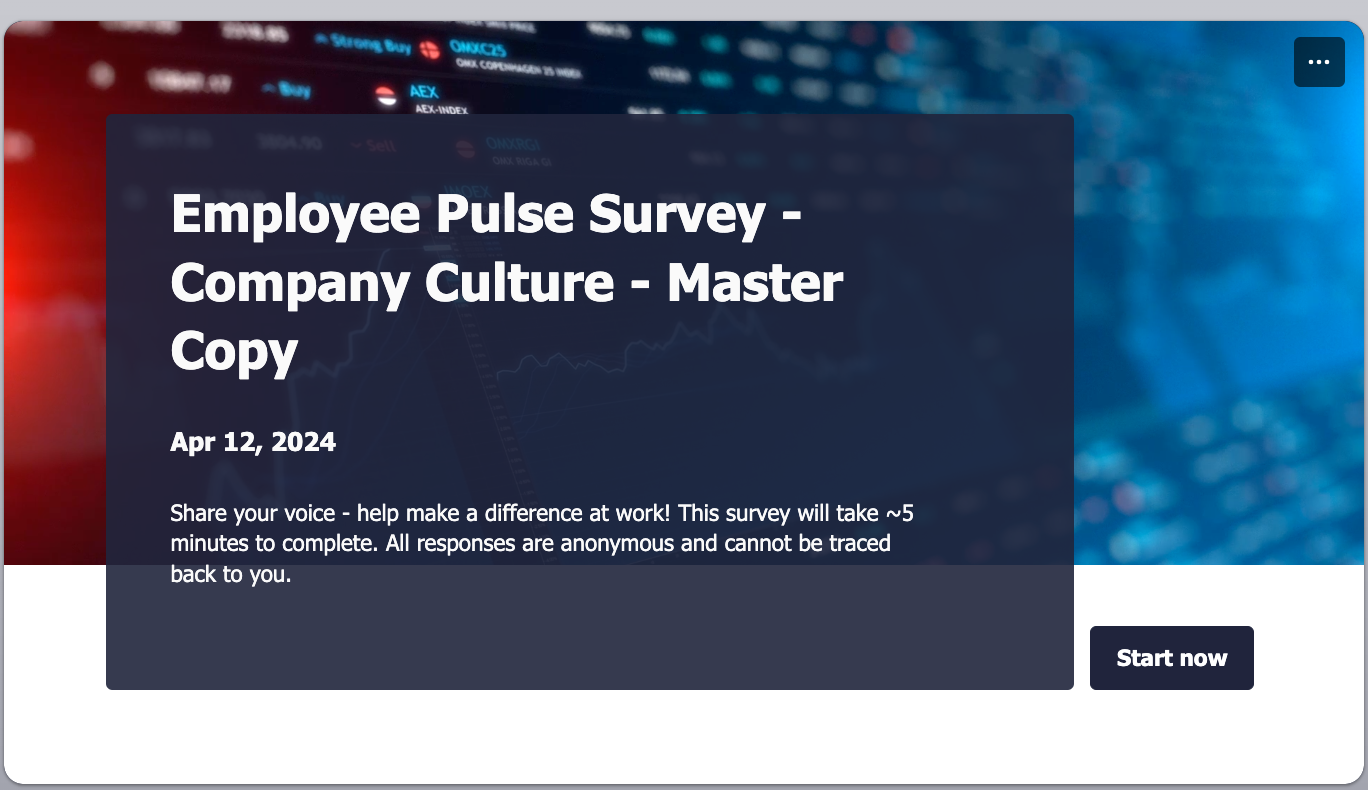
8. Download the Employee Pulse Survey [Placeholder for a Download Link] and the PDF with the instructions on how to use it [Placeholder for a Download Link].
a. Decide the scope of distribution: the entire organization, specific teams or departments, or a target group identified for this purpose?
b. Decide the timeline for response.
c. Assign individuals who will be responsible for distributing the survey and for following up with reminders.
d. Determine who will be responsible for analyzing the data (which will be done between Workshop 2 and 3).
9. Identify other data to collect to establish baseline measures. Establish a timeline for collecting this data and who will be responsible.
10. Sign the Commitment Pledge. Identify who else in the organization to ask to sign the Pledge. Specifically seek out people whose actions could make or break this Initiative and ask them for their sponsorship and support and to also sign a Pledge of Commitment.
11. Using the learnings from project study segments 1-9, outline a draft Vision for what the organization’s Strategic Workplace Culture will look like and ensure it contains specific, identifiable and visible outcomes to be accomplished by the end of the program.
12. Identify topics, if any, that would benefit from further study. With Team members, develop a shared plan for further study and assign timelines and responsibilities.
Journaling Structure Example
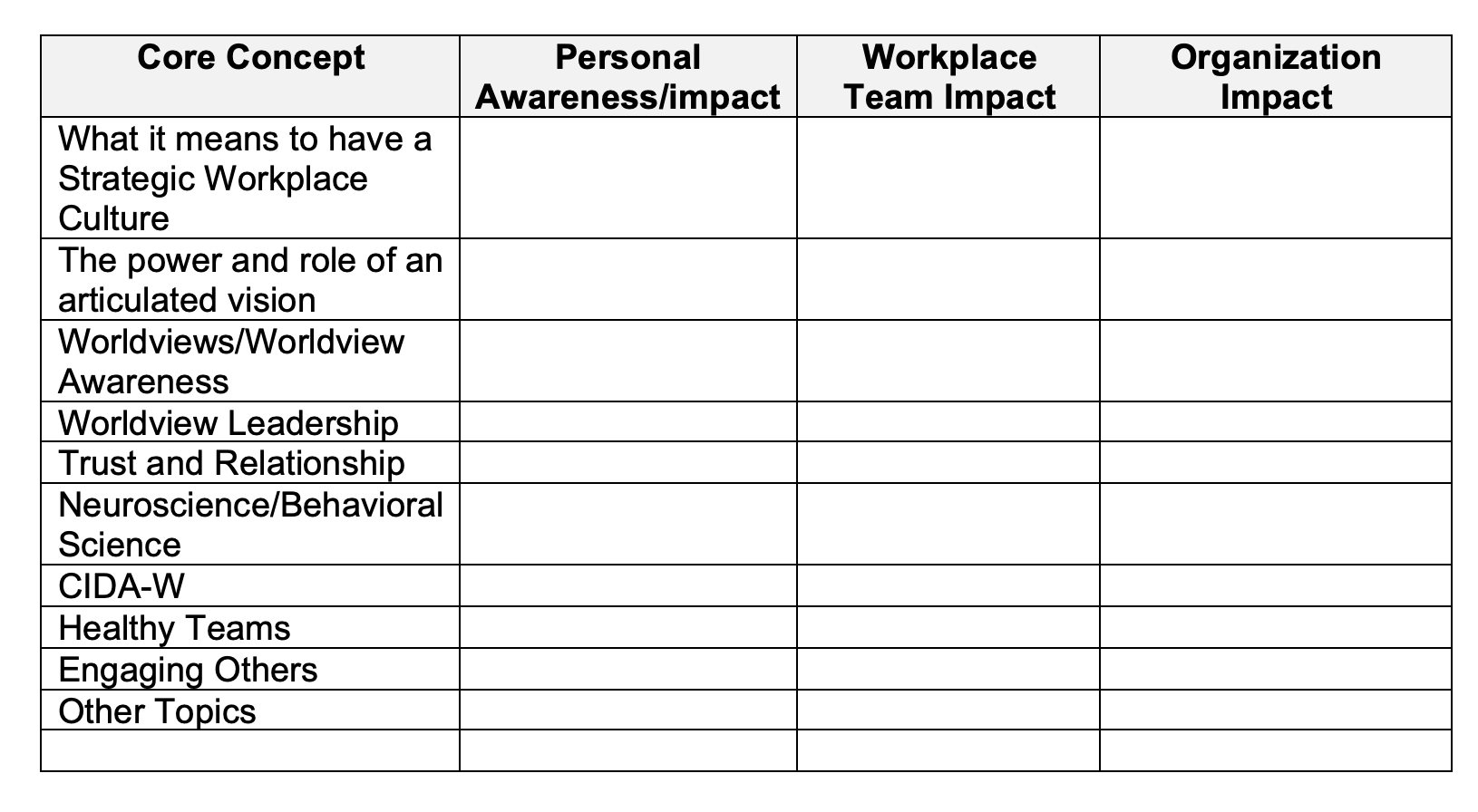
Program Benefits
Human Resources
- High Trust
- Strong Retention
- Effective Recruitment
- Inclusion & Belonging
- Candid Conversations
- Constructive Conflict
- Bridging Differences
- Reduced Absenteeism
- Workplace Wellbeing
- Learning & Growth
Management
- Company Resilience
- Aligned Strategy
- Relational Culture
- Inspired Workforce
- Motivated Employees
- Healthy Teams
- Better Decision-Making
- Productive Meetings
- Increased Responsiveness
- Customer Satisfaction
Management
- Leadership Excellence
- Competitive Advantage
- Worldview Awareness
- Worldview Intelligence
- Neuroscience Knowledge
- Behavioral Knowledge
- Client Satisfaction
- Human Flourishing
- Innovative Thinking
- Strong Collaboration
Client Telephone Conference (CTC)
If you have any questions or if you would like to arrange a Client Telephone Conference (CTC) to discuss this particular Unique Consulting Service Proposition (UCSP) in more detail, please CLICK HERE.






